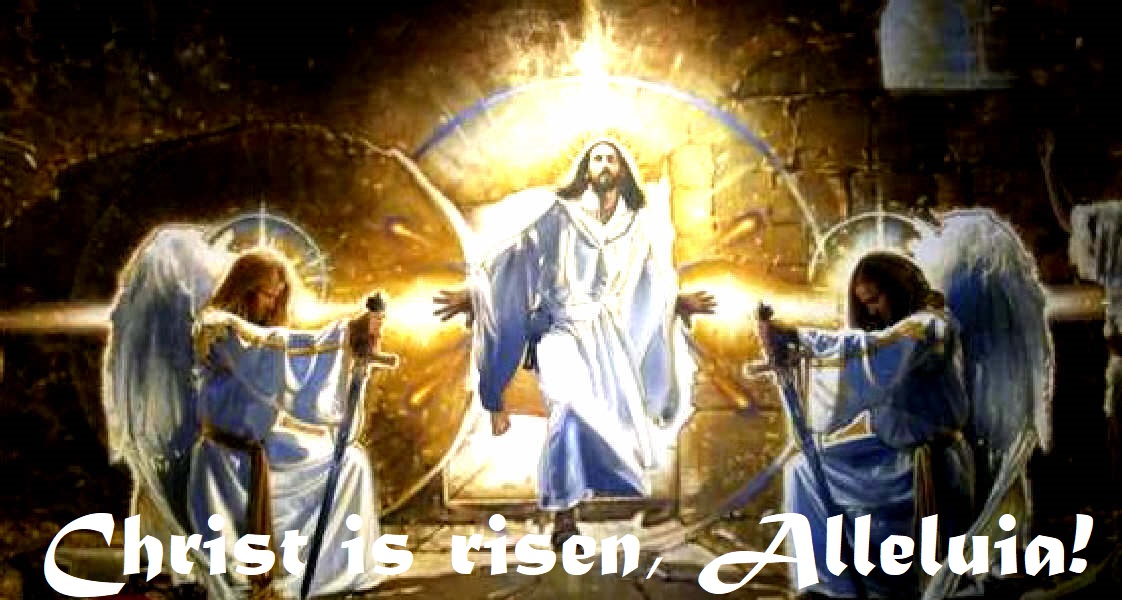December 25, 2023. Luke 2:1-14 The Nativity of our Lord.

The first Christmas: "I bring you joy."
An angel of the Lord appeared to Zechariah to announce the birth of John the Baptist. Archangel Gabriel was sent to Mary to announce the birth of the Messiah. An angel of the Lord appeared to Joseph in a dream when he was going to divorce Mary. Will God send another angel to tell Mary and Joseph to travel to Bethlehem, the town of David, for the birth of Jesus? No. Instead, the whole Roman Empire went into commotion when a decree from Caesar Augustus required that all people register in their town of origin. The divine Providence can use the most ordinary events to lead and guide people. God used Cyrus to end the captivity of the Jews in Babylon. Most of us do not have an angel telling us what to do. God is the master of the universe who can direct us through the ordinary laws of everyday life.
Nobody in Bethlehem was aware of the birth of the Messiah, so an angel of the Lord was send to announce the good news. To Herod and the prominent leaders of the world? No. To shepherds who were keeping the night watch over their flock. Seeing the glory of the Lord in the middle of the night, they were struck with great awe. "Do not fear, they were told, "I proclaim to you good news of great joy for all the people." God does not bring fear but joy for all. "For today in the city of David, a savior was born who is Messiah and Lord." The Messiah is the liberator expected for centuries, and he is Lord who can bring salvation to all creatures.
"This will be a sign for you: you will find an infant wrapped in swaddling clothes and lying in a manger." A baby in a manger? Shepherds were probably the only people who would not be shocked by this sign, for poverty and powerlessness were their common lot. Today poverty and powerless are still associated with failure and low social status, but in the new kingdom, there will be no poor and no wealthy, and no potentates and no powerless people, only children of the one Father.
"And suddenly there was a multitude of the heavenly host with the angel, praising God and saying:
Glory to God in the highest,
and on earth peace to those on whom his favor rests.
We can all sing along this "Glory to God in the highest.
December 17, 2023. John 1:6-8, 19-28 Third Sunday of Advent.
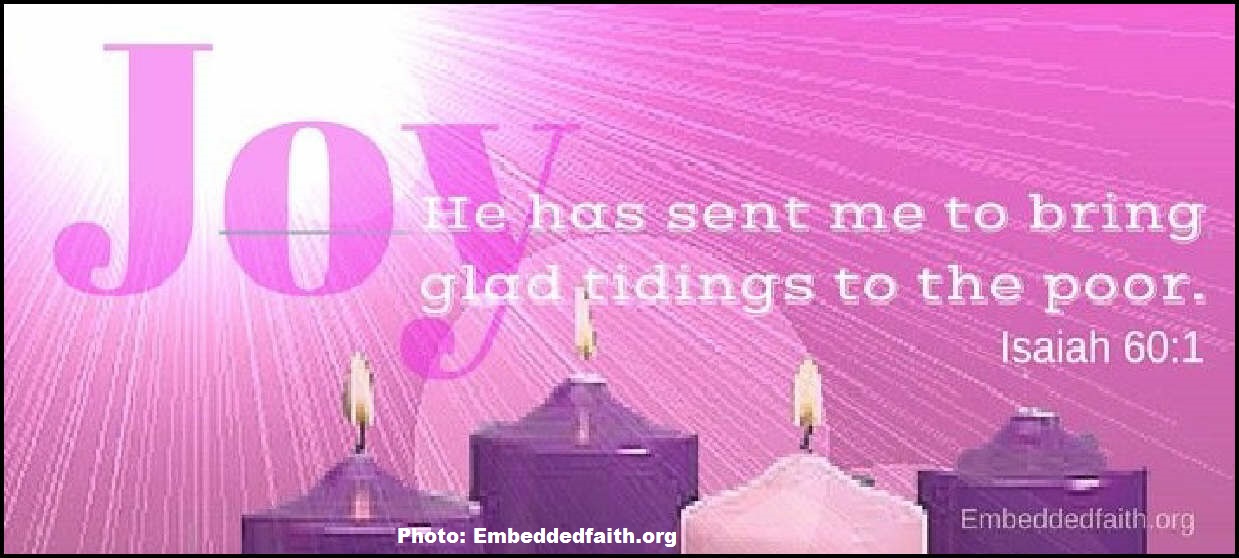
Joy to the world:
Christ is coming soon!
On this third Sunday of Advent, we already sing the joy of Christmas in the prophecy of Isaiah, "He has sent me to bring good news to the poor." John the Baptist was sent as a forerunner. He acknowledged it: "I am not the Messiah. I am not Elijah. I am not the prophet. I baptize in water. The one to come will baptize with the power of the Holy Spirit." He will transform the hearts of those who follow him.
“He will proclaim liberty to the captives, and release of the prisoners.” He will proclaim liberty, but he will not open the prison cells like a conqueror. His kingdom is not political and social, but religious. He call to freedom those who are prisoners of their own man-made prisons, like addiction to things and the slavery of material possessions. He will proclaim the liberating truth that we are children of God made at his image, and thus co-creators of our destiny. This truth will set us free.
“He will comfort those who mourn, and place on them a diadem instead of ashes, give them oil of gladness instead of mourning.” Hope is the oil of gladness and the diadem of self-confidence. Hope is the greatest power out of despair, and peace is the most precious gift of the soul. Hope and peace are not of this world but they are transformative power within this world. With hope and peace, all tears will be washed away. This is the good news.
Let us sing in anticipation of Christmas, “Joy to the World, the Lord has come!”
December 10, 2023. Mark 1:1-8 Second Sunday of Advent.
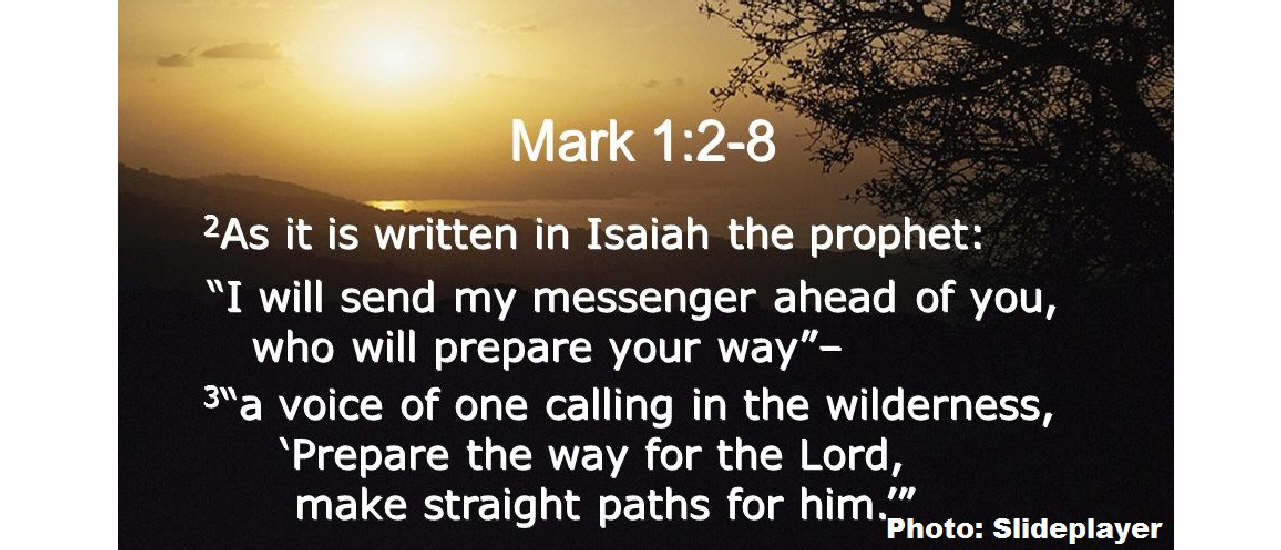
John baptized in water
Jesus will baptize in the Holy Spirit
John the Baptist and his disciples baptized in water for the remission of sins. People who came to be baptized confessed their sins. Water baptism is a ritual of repentance that is practiced all over the world, but baptism does not forgive sins, only God can forgive. Baptism does not transform sinners, only God can. Jesus did not come to baptize but to transform. He did not baptize in water but in the Holy Spirit.
Baptism in water is a short ritual, while baptism in the Holy Spirit never ends. Religion involves many practices like prayer, sacrifice, alms giving, and service to others. These practices are in our power. They are highly recommended, but do not always bring spiritual growth. Reciting endless prayer like a prayer machine will only bring limited spiritual growth. What is needed is the gifts of the Holy Spirit.
The Holy Spirit is the Spirit of God, the spirit of Jesus Christ. It cannot be acquired through rituals but through the spiritual practice of listening to God in prayer in everyday life. It can start when we wake up and give glory to God for the new day. It can continue throughout the day by asking the Spirit for inspiration about what to do and what to say. At times, we need the Spirit of courage and initiative. At other times, we need the Spirit of wisdom. And at other times, the Spirit of compassion and understanding.
In the prayer of St. Francis, we ask for the qualities that fill us with the Holy Spirit:
grant that I may not so much seek to be consoled as to console;
to be understood, as to understand;
to be loved, as to love;
for it is in giving that we receive,
it is in pardoning that we are pardoned,
and it is in dying that we are born to Eternal Life.
December 3, 2023. Mark 13:33-37 First Sunday of Advent.
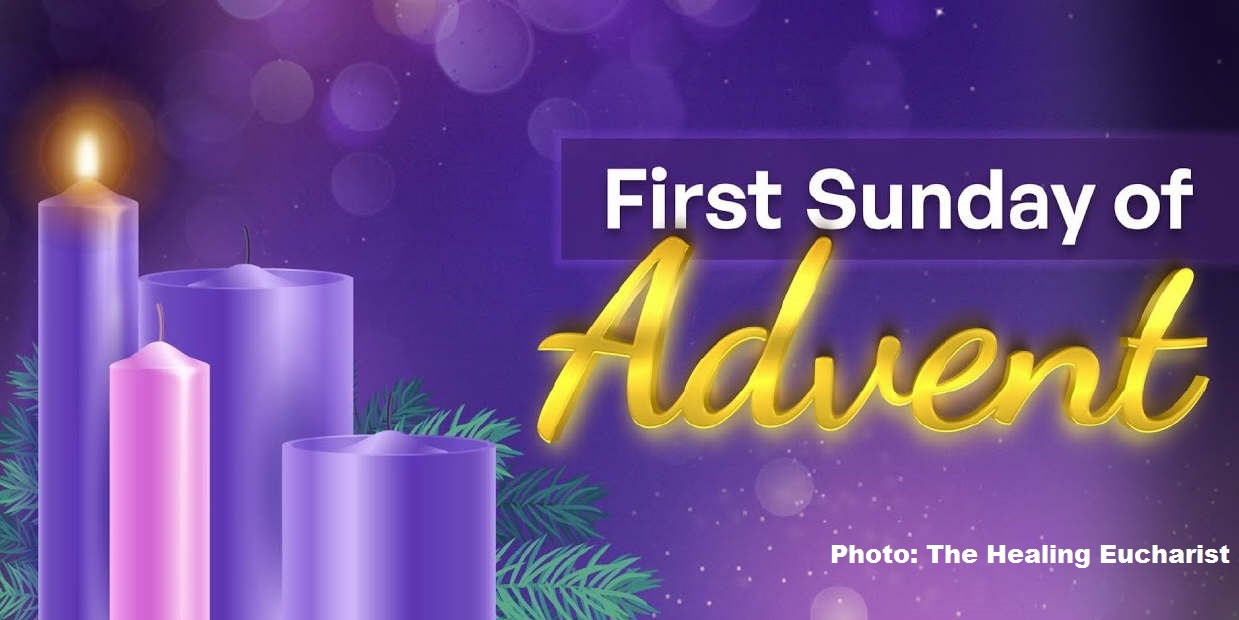
Be prepared: Christ is coming soon
For the Lord, one day is like thousand days, and thousand days are like one day. The Lord is coming, but we do not know when. For some people, death comes suddenly, in a car accident or simply by falling asleep in old age. We do not need to prepare anxiously, but we need to live with inner peace at all times. The peace of the Lord is his most precious gift. He gives this gift to those who seek him and live in his company.
When we are invited to a wedding or a birthday party, we select our best clothes to bring honor to the wedding couple and the family. We are invited to Jesus’ birthday party on Christmas day; we want to come with the best of what we have, like small gifts to children and family, joyfully singing and music, and a beautifully decorated place. Nothing more? Pagans do that.
Advent is also a season of preparation for Christmas. What will you do? The internet offers many opportunities for spiritual growth, but you must find out what is available in your language. Search “Bible readings” and you will find suggestions for the readings of the day, or a program of Bible readings throughout the year. Search “Bible meditation” or “hymns and songs” and you will find unexpected possibilities. Search “churches in my area” and you find new places to visit and pray. Finally, this first day of Advent, we start reading the gospel of Mark. This is an opportunity to read a book about Mark, or simply read the first ten chapters of his gospel.
There are special songs for the season of Advent. The best known is "O Come O come, Emmanuel, and ransom captive Israel."
November 26, 2023. Matthew 25:31-46
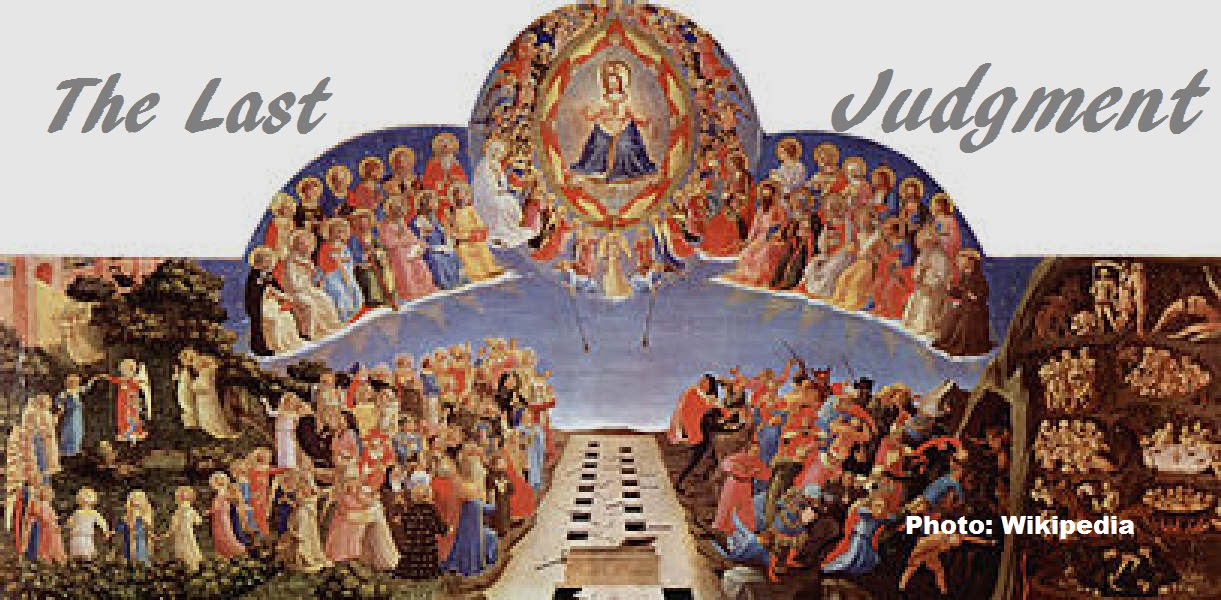
Mercy on us, Lord:
we are neither saints nor devils
In the description of the Last Judgment, which we read today, Jesus separates all nations in two, with the righteous on his right. To them he said, “You are blessed, because when I was hungry you gave me food, and when I was sick you cared for me. Inherit the kingdom prepared for you.” Turning to those on the left, he said, “Depart from me, you accursed, because when I was hungry and thirsty, you did nothing for me.” These, he will send off to eternal punishment, and the righteous to eternal life.
Whatever we do for others, it is like doing for Jesus himself. But there is more than feeding the hungry in the streets and giving them shelter for the night. All parents give food to their children and care for them when they are sick, not just charity workers. And there are many ways to love one’s neighbor, not just caring for a wounded traveler beaten by thieves, as in the parable of the Good Samaritan. Loving and helping others is as important as loving God.
The mansion of the Father has many rooms, not just one for hell and another for heaven. There are many levels of heaven and of hell, not just the same kind of reward or punishment for all. The Bible does not mention purgatory, but it does not say, either, that heaven and hell as the same for all. God does not mass produce people, neither for this live nor for eternity.
Today we celebrate the Solemnity of Our Lord Jesus Christ, King of the Universe. The Last Judgment will be the glorious return of our Lord. It is time to celebrate his name. Today is the time to sing, "Bless the Lord, my soul, and bless his holy name, Jesus Christ."
November 19, 2023. Matthew 25:14-30

The talents we received from Christ
In preparation for the return of Christ judging all nations, which we will celebrate next week, the gospel of today tells the parable of a master – Jesus himself – who gave all his possessions to his servants – that is, to us, his followers. When this mater came back from his trip, he asked them to give an account of what they have done with the talents given to them. This is what one day we will have to do, giving an account of our lives.
This story is very uplifting. Imagine you are given a million dollars, or renminbi, or yens to invest as you see fit. Imagine that you are fortunate enough to double the value of the investment. How proud you will be! – whether you received 10 million or 5 million. When the Master will come back, he will put you in charge of one of his businesses, or more simply invite you to “share your master’s joy.”
One of the servants received only one talent. Out of fear or laziness, he did not invest it but buried it to keep it safe. The master was not pleased. We have all received talents, and it is tempting to leave them unproductive. Our time on earth is one gift from nature. What do we do with it? Many people enjoy watching sports, but how many hours are wasted watching endlessly without any benefit? We all need distractions, but how much time is wasted watching movies and television shows of poor quality? We all need to keep informed, but how time is wasted checking the cellphone throughout the day?
About the one who did not invest his single talent, the master said, "Take the talent from him and give it to the one with ten." This is what usually happens: those who do not invest their talents lose them; those who do not use their time wisely lead unproductive and unhealthy lives. But those who use their time creatively may find physical and mental energies to help others.
The talents we have received are not ours. They are a gift for which we can praise God in thanksgiving. Sing with Taizé, Jubilate Deo omnis terra (Let the whole world sing in praise to the Lord).
November 12, 2023. Matthew 25:1-13
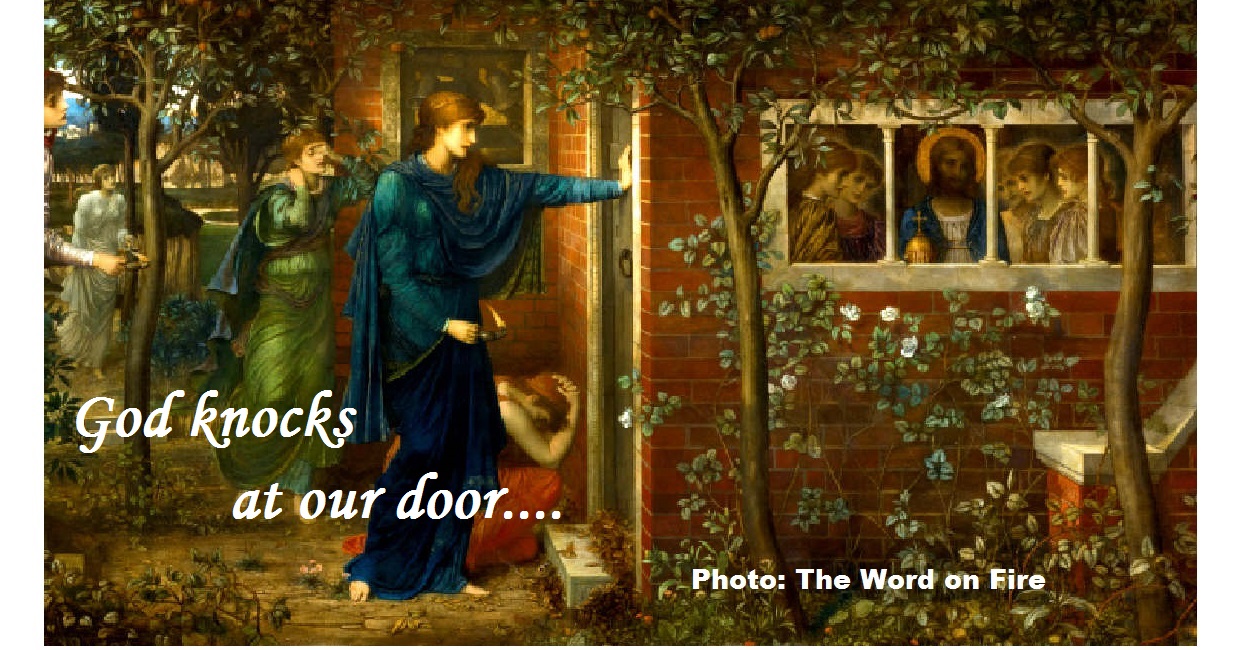
"Stay Awake. You know neither the day nor the hour"
In the parable of the 10 wise and the 10 foolish virgins, the wise girls took enough oil for their lamps and were ready when the bridegroom arrived. There is much wisdom in this story: we must prepare in good times and get ready for bad times. We must save enough money in good times to have enough in hard times and old age.
Faith is the lamp of our lives, and Jesus Christ is the lamp and light of the world. In the beginning was the Word and the Word was God. The Word became flesh and he made his dwelling among us. He is the light of the world that illuminates all human beings. He is the light of our everyday lives, so that, by accepting this light, we become children of God.
The Holy Spirit is the oil of our lamps, and this Spirit dwells in our hearts. It is a spirit of courage, wisdom, warmth, and meekness. It is the spirit of the Beatitudes: happy are the poor, the hungry, the persecuted, and those seeking justice. It is the Spirit who speaks through the Scripture. We can find it through diligent and regular Bible reading.
Be ready for the coming back of Christ, the bridegroom of the church. We do not know the time and day, but we know he will come. Maranatha! Come Lord! Let us be ready.
November 5, 2023. Matthew 23:1-12
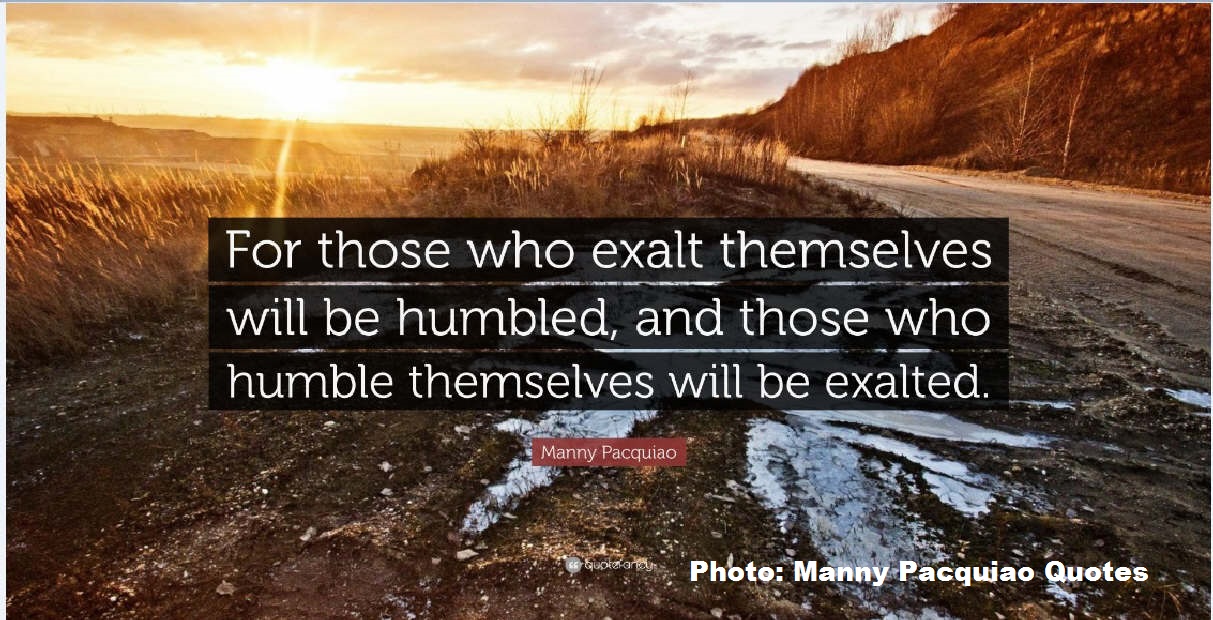
By God's greatness we are humbled
but by God's love we are exalted
This is the message of Psalm 8. "O Lord, our God, how awesome is your name through all the earth. When I see your heavens, the work of your fingers, the moon and the stars you set in place, what is man that you are mindful of him, and the son of man that you care for him?" What are we in the infinity of the universe? How small and humble we feel when looking at the sky in a clear summer night!
This psalm also exalts the greatness of humankind. "You made man just less than a god. You have given him rule over the works of your hand, and put all things at his feet. O Lord, how awesome is your name!" God gave us an awesome power over nature, so great that we can destroy our own environment, and so great also that we can recover from our mistakes.
If our material power are great, our spiritual power is even greater. Through the love of God and neighbors, we are exalted above all creatures. If our material power can make us gloat with pride, our imitation of Jesus Christ makes us humble and full of thanksgiving. God exalts those who are humble, so that the sons and daughters of God we can become gods by adoption.
Sing along Psalm 8: https://www.youtube.com/watch?v=hRtyrIH8UBs
October 29, 2023. Matthew 22:34-40
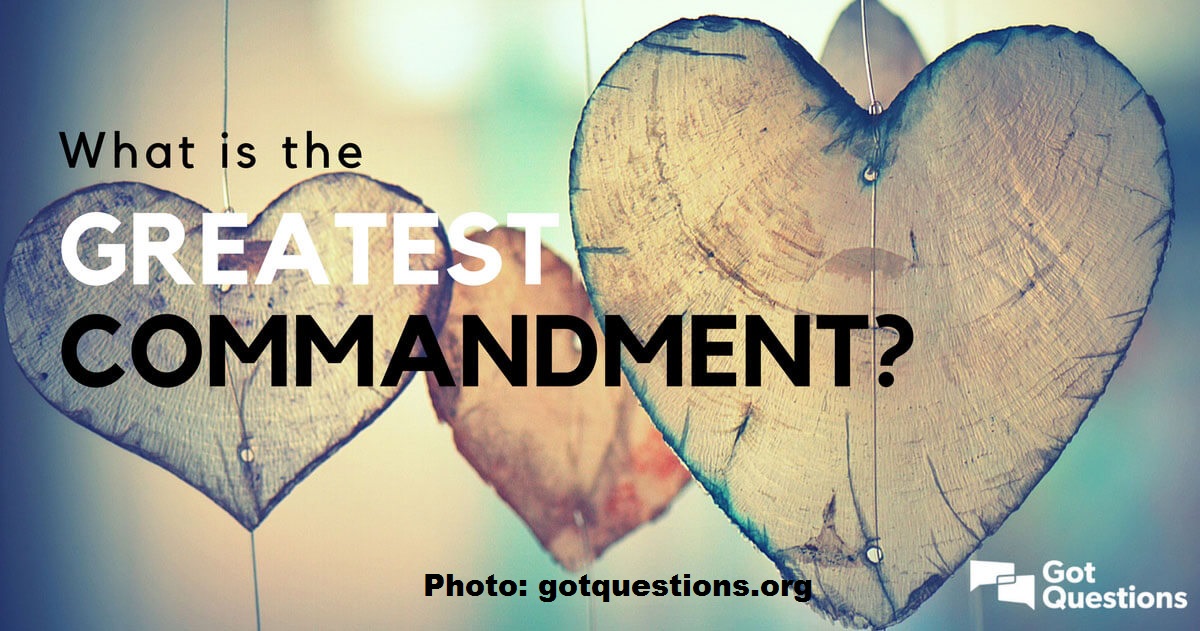
Can love be a commandment?
Can you order children to eat spinach or onions when they hate them? Can you ask them to play with a friend they dislike? How can God command us to love him and also our neighbors if we dislike them?
"Love your neighbor as yourself." The way we love ourselves is also the way we love others. If our self-love is selfish, our love of others will be selfish. But if we love ourselves to achieve some greater good, we will also love others for their own good. Conversely, the love of parents for their children will reflect on their own self-love. Thus when parents want to take children on a learning trip they will begin by learning about where to go, and if parents want their children to go to church, they often go back to church after years of inaction. Similarly, if we want children to eat spinach and onion we must show them that we like them (e.g. a creamy spinach pie or a home-made onion soup) and they may colme to like them too.
Love is a feeling but it is also much more. True self-love is the active pursuit of a greater good. The love of others is similarly helping them achieve their fullest potential. Our love of God is similarly our desire and pursuit of the glory of God in ourselves and the world.
Is God commanding us to love him? Of course not, because it is inscribed in our nature. "He made us and we belong to him. We are his people and his flock. Let us give thanks the Lord and bless his name." (Psalm 100)
Sing along Psalm 100 "Make a joyful noise to the Lord."
October 22, 2023. Matthew 22:1-14
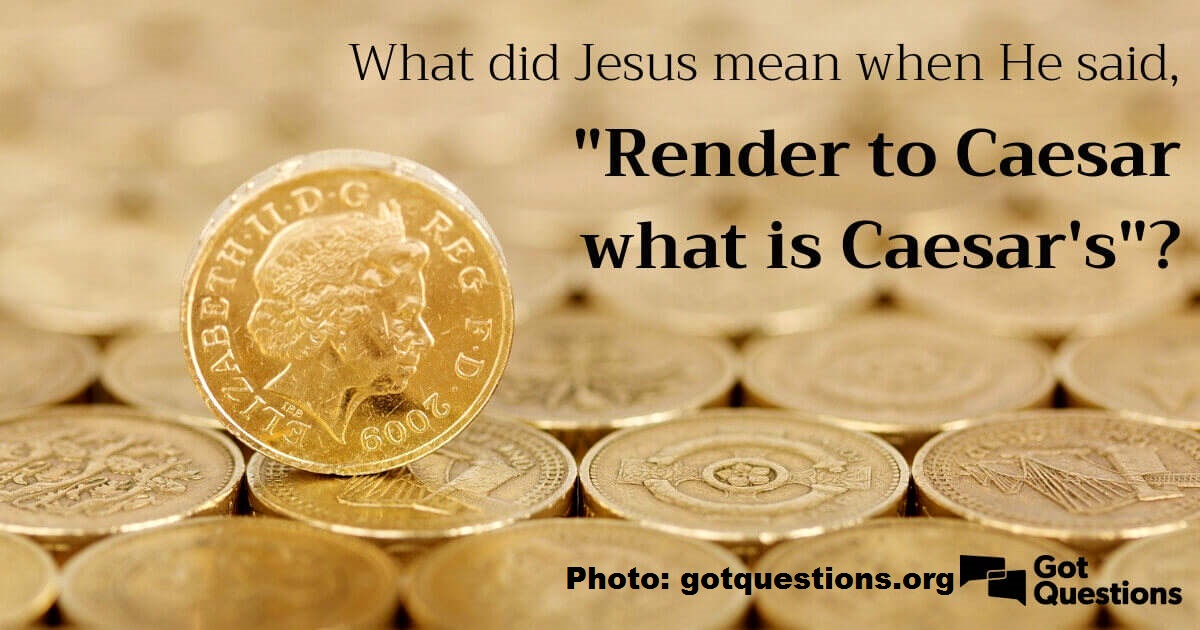
"Give to God what belongs to God"
"Give to Caesar what belongs to Caesar, and to God what belongs to God." We all agree that we must pay taxes, and we all do. More difficult is to give God's his dues. We can do so by singing God's glory with the psalms.
With psalm 100 we can proclaim, "The LORD is God. It is he who made us, and we are his. We are his people, the sheep of his pasture." The Lord is the good shepherd, and we proclaim his leadership.
God knows us better than we know ourselves. As magnificently stated by psalm 139, "LORD, you know when I sit and when I rise; you perceive my thoughts from afar. Before a word is on my tongue you, LORD, know it completely. You go before me and follow me. You place your hand of blessing on me." Ths is not a judgmental but a loving God.
The whole universe praises God. "Praise the LORD from the heavens! Praise him from the skies! Praise him, all his angels! Praise him, all the armies of heaven! Praise him, sun and moon! Praise him, all you twinkling stars!" (Psalm 148). The beauty of nature sings the glory of the creator.
Let us sing "Praise His Name" (Psalm 148)
October 15, 2023. Matthew 22:1-14
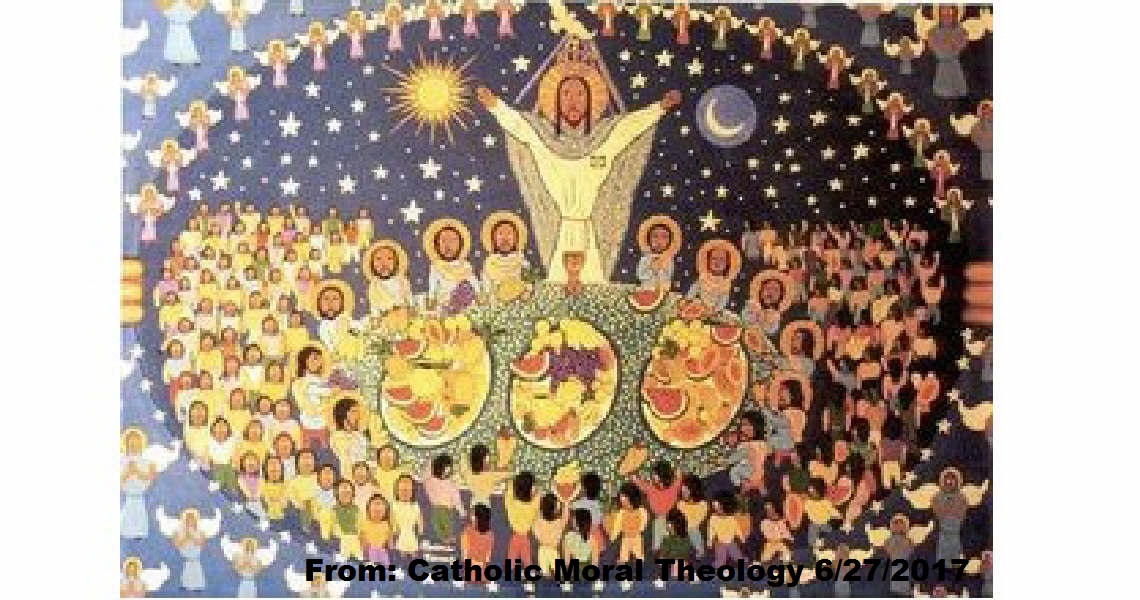
The Wedding Feast of Christ and the Church
In Jesus' parable, a king sent out invitations for the wedding of his son, but they were ignored. The king is Yahweh who sent his prophets to celebrate God's covenant with Israel. God sent his only Son into the world, but he was not received. Then he invited all pagan nations to come and celebrate the wedding feast between Christ and the church, and between the Word of God and individual souls.
The first covenant was that of Yahweh with Abraham. God took Abraham outside and said, "Look up at the sky and count the stars. Equally numerous will your descendant be." Count the number of followers of Christ through the ages: they are as numerous as the stars. They give glory to God as the sun and the stars glorify God in their silent majesty. The whole nature celebrates the wedding of the Son.
The prophet Jeremiah announced a new covenant with Israel. "I will place my law within them and write it upon their hearts. I will be their God and they shall be my people." This new covenant took place on the day of Pentecost when the spirit God set ablaze the hearts of the apostles and those who listened to them. The church embodies the new covenant when the Spirit inflames its members. We celebrate the New Covenant in the Eucharist which is the memorial of the life and passion of our Lord.
The celebration of the wedding feast between Christ and the church will only take place at the end of time. As stated in the book of Revelation, "I saw a new heaven and a new earth. I saw the new Jerusalem, coming down out of heaven from God, prepared as a bride beautifully dressed for her husband." Happy are those who will celebrate this wedding feast for all eternity.
October 8, 2023. Matthew 21:33-43
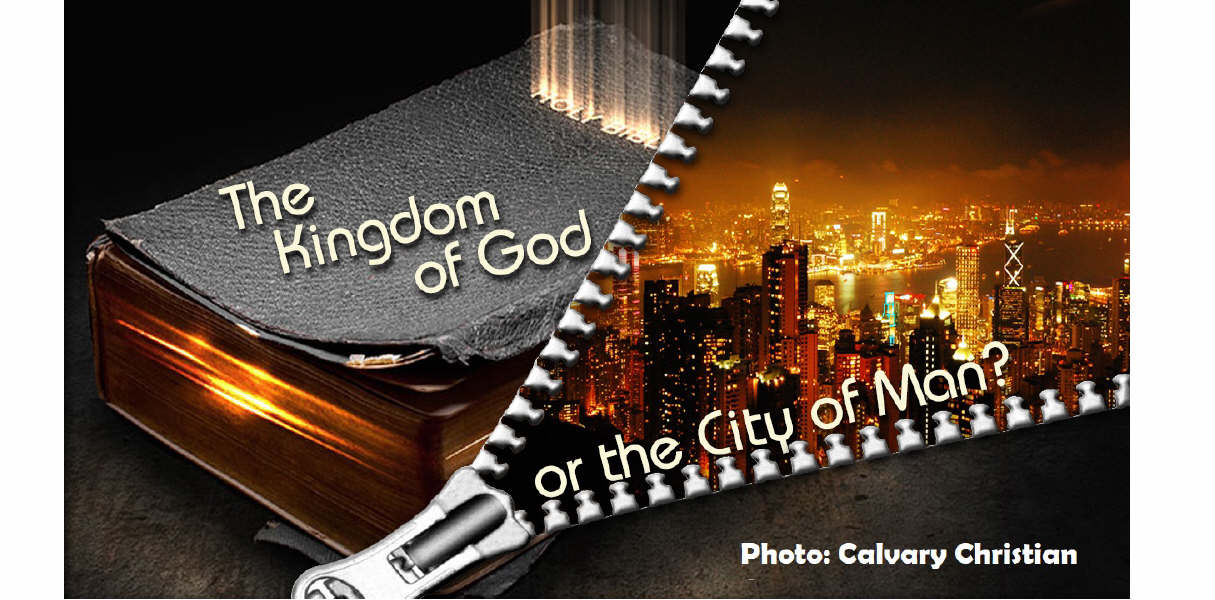
The Kingdom of God will be taken away from you
In Jesus' parable of the wicked tenants, a landlord plants a vineyard and leases it to tenants before going away on a journey. At the time of the vintage, he sends servants to collect his share of the produce. After the tenants rejected them several times, he sends his son, and then the wicked tenants killed him. This is is the story of Israel who rejected the prophets and will kill the son of God. "Therefore," Jesus said to the chief priests and elders, "the kingdom of God will be taken away from you."
The kingdom of God is within us. It brings joy and peace. But it is not a stable possession or an achievement: we have to work at it at all times. When we wake up, we can start a new day for the reign of God by giving thanks. Before we fall asleep we can review the day, give thanks for the accomplishments, and ask for forgiveness for our failures. In the morning we can sing the psalm, "When I wake up, let me be filled with your presence." And at night we can sing another psalm, "In peace I will rest, and soon will fall asleep."
The reign of God must grow, or it will decline, in the whole world and also within us. We grow when we try something new, like reading a book or taking a trip. In spirituality we must also grow through readings and explorations. In business and any profession, one must keep up with the changes and read about new techniques and methods. So it is in one's spiritual life: reading is a window into discovery, of self and God. And so is traveling. Hopefully in your lifetime you will visit Peter's resting place in Rome and Jesus' hometowns of Bethlehem, Nazareth, and Jerusalem.
October 1, 2023. Matthew 21:28-32

Jesus to Jews:
Are you hypocrites?
Jesus told the Jews another parable. "A man had two sons. He said to one, "Go and work in my vineyard." He said "No way!" but later he went. Then the man said to his other son, "Go and work for me today." He said "Yes, sir!" but he did not go. Which one did the father's will?" The Jews said to Jesus, "Of course, the first one." You hypocrites! You said "Yes, sir" to God but you did not fulfill God's will, while the tax collectors and the prostitutes did, and they will enter the Kingdnm of God before you.
Are Christians hypocrites? They say "yes" to God, but may not fulfill his will. Are Muslims hypocrites? Are Hindus and Buddhists hypocrites? Are atheists hypocrites? Some are, and hopefully many are not.
No believer and no unbeliever can claim to be perfect. All are sinners, but we can always claim to be be better than others. Catolics may claim to be better than Protestants. Muslims may claim to be better than Christians, and Hindus may claim to be better than Buddhist. Each religion may persecute the others. Religious persecutions are real in many parts of the world. Even when there is no open hostility there are prejudices and rejections.
In many churches there are believers who say that their way is the only way. There are conservative who reject liberals, and reformers who want everybody to agree with them. There is intolerance between churches but also within them. There is also intolerance between and also within families.
To say "Yes" to God is easy, but it is not enough. "Not every one who says to me Lord, lord, shall come into the kingdom of God, but he who is does the will of my Father." (Matthew 7:21)
September 24, 2023. Mt 20:1-16
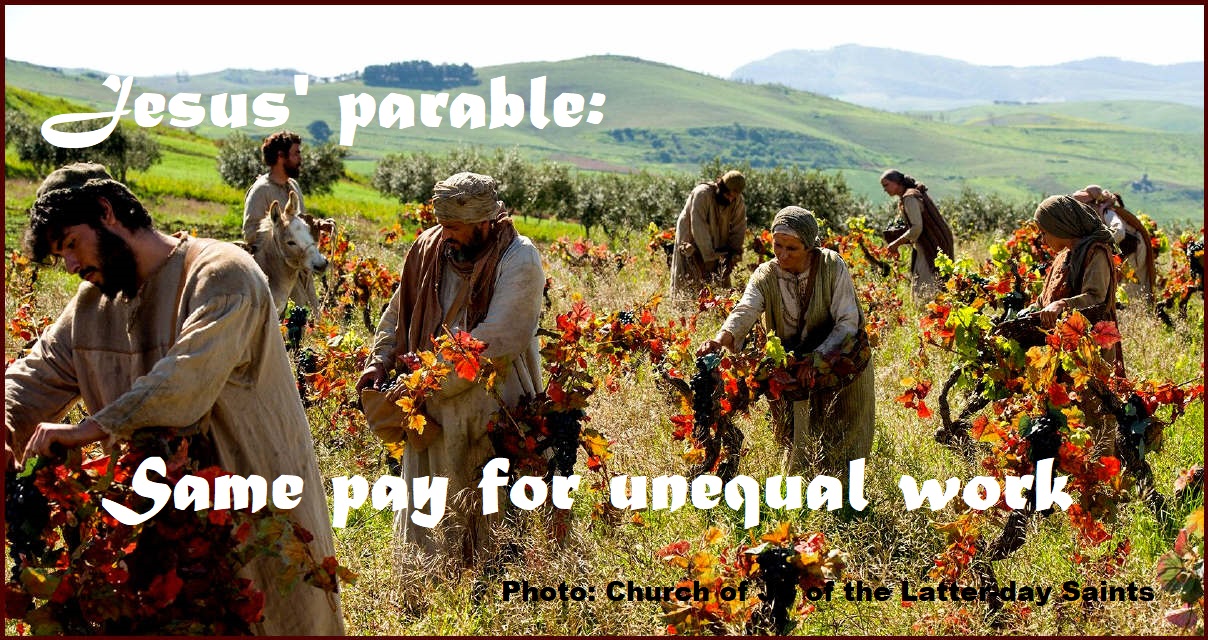
God's ways are not like human ways.
In the parable of today's reading, Jesus tells the story of a landlord who hires laborers in the morning after agreeing with them about the day's pay. At noon, he found more laborers who wanted to work, and he hired them. And the same in the afternoon. In the evening he paid them all the same amount. Is this unfair? Yes, according to the morning workers who complained: all should be paid according to what they deserve. There should be no special favor for anybody.
These are human ways of thinking, not God's ways. "God sends rain to the just and the unjust." Sickness and misfortunes can happen to anyone, whether religious or not, holy or sinner. In the same family, brothers are given different talents, and it is not always the brightest who succeeds. When others succeed, I may like to say, "Why not me? I deserve it as much as they do."
Rather than comparing ourselves with others, we should be thankful for all that we have received. In the parable, the landowner tells his complaining workers, "Why are you envious and jealous because I am generous?" God was generous to you yesterday, while today he grants his favors to others; is this unfair?
Let us sing with Psalm 118, "This is the day the Lord has made. Let us rejoice and be glad." The psalm begins with the words, "Let us give thanks to the Lord because he is good, his mercy endures forever."
September 17, 2023. Mt 18:21-35

Those who forgive most shall be most forgiven.
Most people, including myself, get aggravated about 70 x 7 times per day or per week. Often it is about little things, but they add up and increase our level of frustration. Then, at the end, we may explode in anger. If that anger accumulates over many years, we become an angry person, a person full of anger, always ready to explode. Not a pretty picture!
We develop allergies when we are exposed to unhealthy chemicals. We can also develop psychological allergies when we are exposed to frustrating situations or people. Then we tend to shout, "I don't want to see you again!" This happens when we do not forgive the 70 x 7 little frustrations which happen over a few days. Then we stop listening even before the other person says something that frustrates us.
We may also like to complain about the little material frustrations, like "My computer stops working again!' or "The train is late again!" Or we may complain about God: "Why did you do that to me? What did I do to deserve that?" After years of complaining, we become a complainer, a negative and bitter person.
Forgiving 70 x 7 times is a wise thing to keep a healthy relationship with others. We must do so because God has also forgiven us 70 x 7 times. In Our Father we pray, "Forgive us our offenses as we forgive those who have offended us." Those who forgive most shall be most forgiven.
September 10, 2023. Matthew 18:15-20
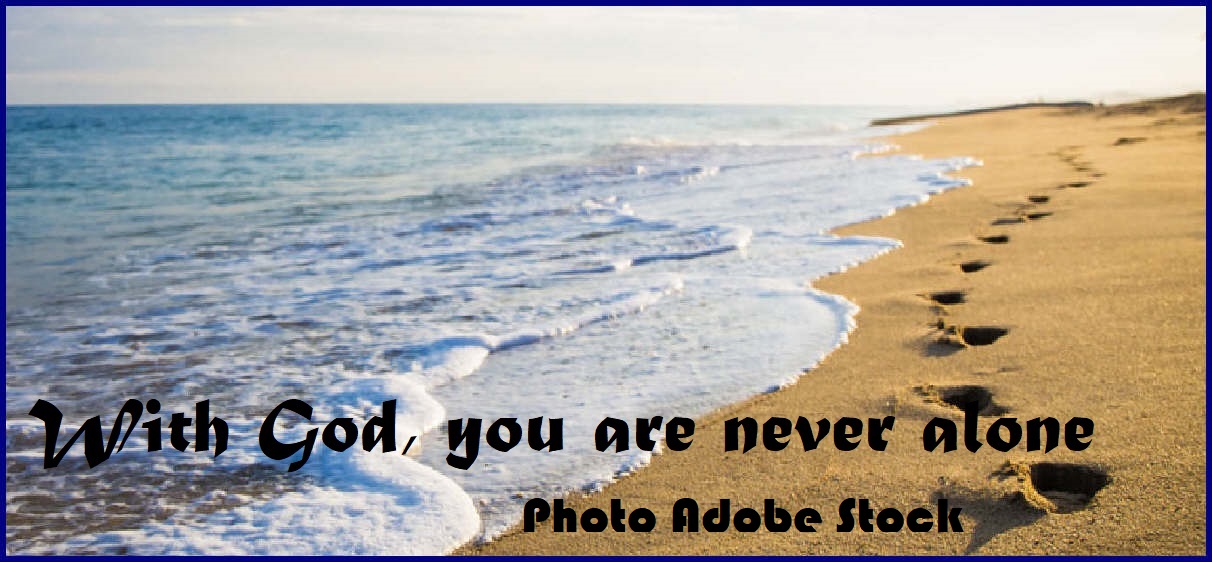
Jesus is always walking with you.
"Where two or three gather in my name, I am with them.” We are the spiritual body of Christ; when praying together, Christ is in our midst. But when church services are uninspiring, this thought is not very helpful, because then we do not feel God's presence.
"I am with you always, until the end of the world." Always! Even when we are alone, God is with us. On several occasions St. Paul writes about Christ-in-you. About himself he wrote, "It is no longer I who live, but it is Christ who lives in me." By imitating Christ, His spirit became progressively part of him. To the Galatians he wrote about giving birth to Christ in them: "My children, I travail in birth until Christ is formed in you.” Christ is at the same time always present and always growing in importance in our daily lives.
Christ-in-us speaks to our inner self in our conscience. There we are always alone, listening (or not listening) to God's voice. There has to be some inner silence to be able to listen to the inner self. Unfortunately, our daily schedules do not allow for much inner silence. Even when we are not busy at work, we tend to busy ourselves with endless entertainment which keeps our minds busy and unable to listen internally.
What is your daily schedule for listening to the God's inner voice, to Christ-in-us? What is the first thing you do in the morning that helps (or prevents) you to open the ears of your soul? Do you have a midday break that gives you a little silence? In the evening and night, do you create moments of inner silence? These moments are as important as the air we breathe: without air and without silence, we will progressively suffocate. Let's begin today to create such moments of silence.
September 3, 2023. Matthew 16:21-27

"Who loses his soul for my sake will find it."
Many people say that religion is a waste of time, a waste of energy, a wasted life. But whoever loses his life or soul for God will find it.
What is life or soul (the same word in Greek) according to the world? It is seeking power, wealth, and social prestige. This requires lots of work. It takes great effort to become rich and have a successful career, but in the end, one is often transformed into a working machine. To be successful requires working 10 to 12 hours a day for 20 to 40 years. You may find success but lose your health (many successful people get to drink to relieve their stress). You may have little time for family life, and as a result, your spouse and children may become alienated. That's a high price to pay for success.
To find one's soul in the reign of God also requires much effort. It may require self-control for 10 to 12 hours a day for many years, but the end result is inner satisfaction, joy, and peace.
Finding one's soul in God's kingdom is also compatible with success in the world. One can be successful in business and also have time for family life. One can practice meditation and also find time to read, go on a vacation, and practice sports. To find one's soul is to find happiness in one's talents and limitations; we can do that and be successful in the world.
Here is the key to success in both worlds: "Seek first the kingdom of God, and everything else shall be given to you in addition." (Matthew, 6:33).
August 27, 2023. Matthew 16: 13-20
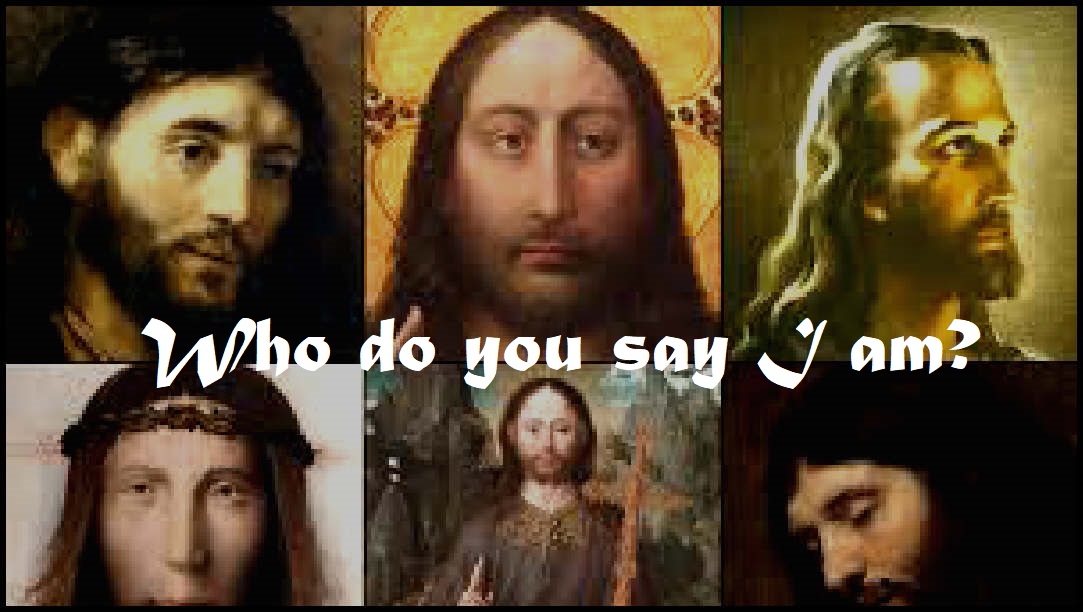
What is your answer to Jesus' question?
When John saw Jesus in the distance, he said to his followers, "This is the Lamb of God, who takes away the sin of the world."
In the synagogue of Capernaum there was a man with an unclean spirit who cried out, "I know who you are, the Holy One of God." But Jesus rebuked him saying, "Be silent, and come out of him." Even the demons know who Jesus is.
After the miraculous catch of fish, Peter fell down at Jesus' feet, saying, "Depart from me, because I am sinful man." Jesus said to him, "Do not be afraid; henceforth you will be catching men."
In the garden of Gethsemane, Judas had given a sign saying, "The one I shall kiss is the man; size him." And he came up to Jesus and said, "Hail, Master!" And he kissed him.
Two criminals were crucified with Jesus. One of the two said, "This man has done nothing wrong." — "Jesus remember me when you come into your kingdom."
After the resurrection, Thomas refused to believe. "Thomas, put your finger here and see my hands, and uput in into my side" Then Thomas answered humbly, "My Lord and my God."
What is your answer to Jesus' question, "Who do you say I am?"
August 20, 2023. Matthew 15: 21-28
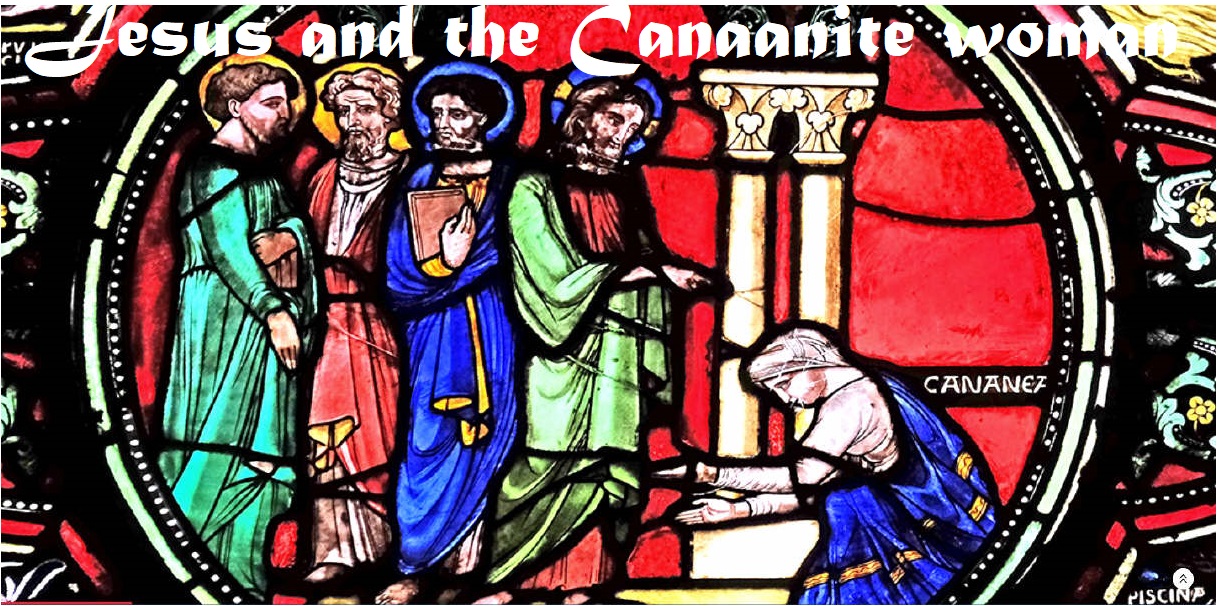
O woman, great is your faith!
Last week Jesus said to Peter, the prince of the apostles, "O you of little faith!" This week Jesus says to a pagan woman, "Great is your faith!" Jesus found much faith in ordinary people.
The Centurion of Capernaum came to Jesus for help, not for himself but for his servant or slave. "I am not worthy to come to your house. Just say a word, and my servant will be healed." Jesus was in admiration, "In all of Israel I have not found such great faith."
A woman followed Jesus with the thought, "If I can just touch him, I will be healed." Jesus noticed her and gave her words of encouragement, "Courage, daughter! Your faith has saved you." And cured, she was.
The blind man in Jericho cried out, "Jesus, son of David, have pity on me!" He was a beggar, and the disciples pushed him away telling him to be quiet. But Jesus stopped, "Stand up! Your faith has saved you," and he recovered his sight.
At the synagogue of Nazareth, everybody expected to see a miracle. They thought it was a show, but Jesus "did not do many miracles there because of their lack of faith." A miracle is a gift of faith. Asking for it is not enough. Miracles happened in God's time, not our time.
A great way to show our faith is to celebrate God's good deeds. Let us sing: Jubilate Deo, Alleluia! from Taizé.
August 13, 2023. Matthew 14:22-33
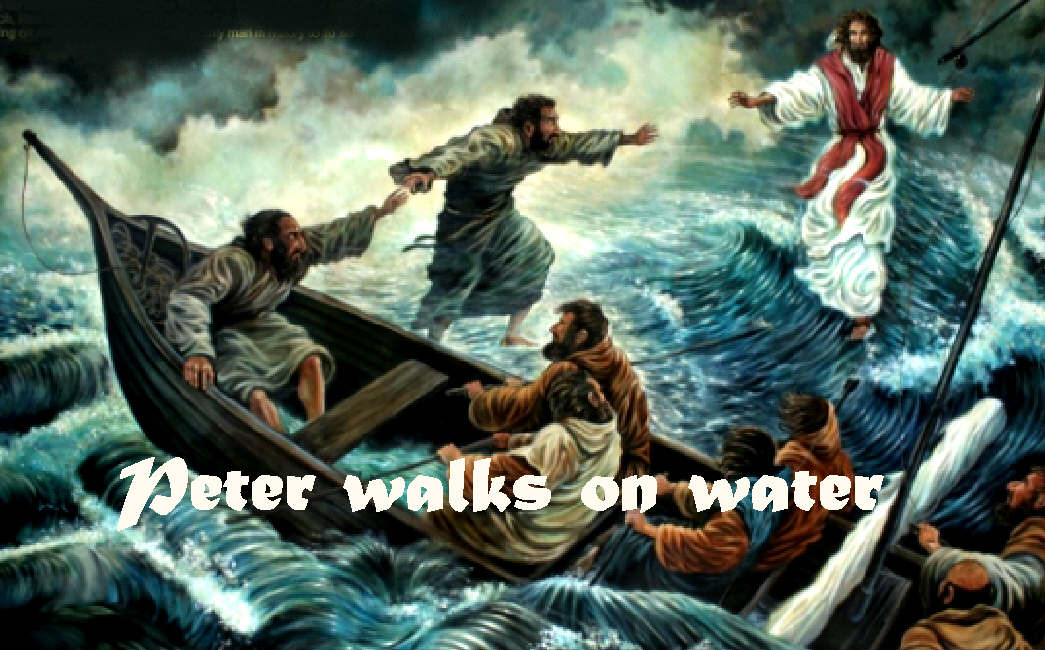
Walking into the unknown
God said to Abraham, "Go from your country, your people. and your father’s household to the land I will show you. I will make you a great nation." Abraham trusted the Lord, and the Lord went with him.
God put Abraham to a test and said, "Take your son Isaac and offer him on a mountain I will indicate to you." An Abraham trusted the Lord and the Lord saved Isaac.
God said to Moses, "Go to the elder of the Israelites and tell them that the Lord will lead you out of Egypt." Moses objected, "I am not a good speaker, I stutter." The Lord replied, "I will assist you and teach you what to say." Then Moses trusted the Lord.
Jericho was an impregnable fortress. Then the Lord said to Joshua, "March around the city for seven days. On the last day the wall of the city will collapse." Joshua trusted the Lord.
The angel said to Mary, "Behold, you will conceive and bear a son. He will be great and will be called the Son of the Most High." Mary replied, "How can this be since I have no relations with a man?" The angel assured her, "Nothing is impossible for God." Then Mary trusted the Lord.
Peter said to the Lord in the midst of a stormy sea, "Lord, command me to come to you on the water." But when he saw the strong wind, he was afraid and began to sink. "O you of little faith, Jesus said to him, why did you doubt?"
Like Abraham, Moses, Mary, and Peter, we are invited to walk into the unknown. All we need is trust in the Lord. When did you walk on water trusting the Lord? Are you ready to do it again?
August 6, 2023. Matthew 17:1-9
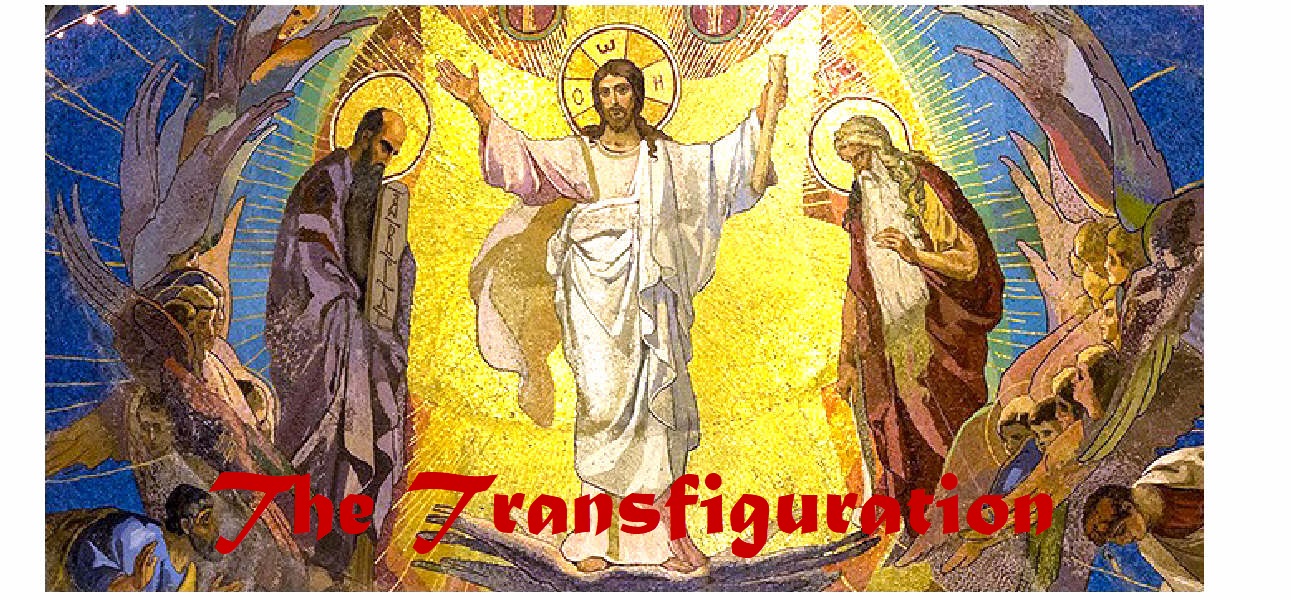
The Transfiguration and our own transformation
The Transfiguration of Jesus gives an idea of what can happen to all Christians. On Mount Tabor he was glorious, in conversion with Moses and Elijah talking about the past and the future. But when coming down from the mountain, he was again like before. Tranfiguration means changing forms, to be transformed. All Christians need to be transformed. We see exceptional transformations in the lives of saints.
The apostles were men of great courage who abandoned work, family, and wives to follow Jesus, but after Gethsemane they fled full of fear of what could happen to them. Peter swore, "If all abandon you, I will not," but like all others, he gave-in to fear. After the crucifixion of Jesus, they barricaded themselves in a house, but on Pentecost day they faced the crowd fearlessly. When ordered not to speak about Jesus, Peter daringly proclaimed, "We must obey God rather than men." All Christians can experience such a transformation. We will always be afraid of dangers, but we can also not be afraid of fear. Our body can shake in fear when facing a dangerous situation, but our heart can be strong and unafraid. In the outside, we may be afraid, but in the inside, we are not because God is with us. This is a transfiguration or transformation of our old self.
Another great transformation is the progressive detachment from material things. The apostles learned to be always on the move, learning new languages, adapting to new cultures, and traveling to unknown places. When traveling abroad they had to leave wife and children behind. Peter was married as were all good Jews. Paul must have been married, but we do not know what happened. Both Peter and Paul ended their lives in Rome, thousands of miles from home. All could say, "I have suffered the loss of all things and count them as rubbish, in order that I may gain Christ." This is an exceptional transformation that awaits all of us.
July 30, 2023. Matthew 13:44-52
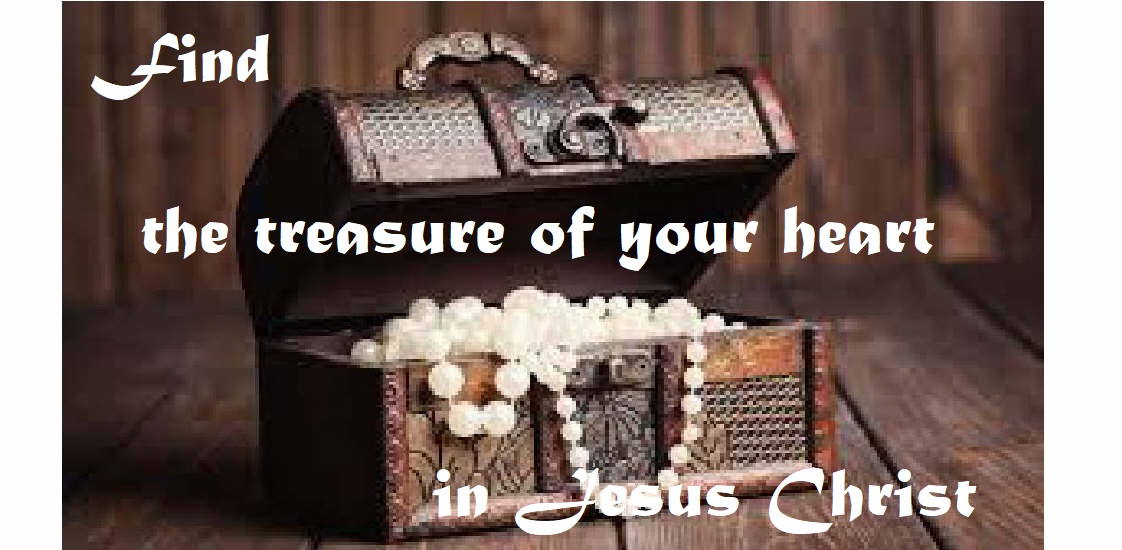
Find your life's treasure
Jesus told the following parable. A man found a treasure in a field. He sold everything he had, and bought the field to acquire the hidden treasure. The message for us is to search for a hidden treasure, and when we find it, to give up everything to keep it.
Everybody has a special talent. We spend a lifetime developing it. Some people are good in Math, others in music, others in business. In the parable of the talents, one person was given 5 talents, another 3 talents, and one only a single one. The first two invested them and doubled their value. The third buried it to protect it. When the master came back, he praised the first two who had doubled the value of their talents but reprimanded the third one for not having done anything. We double the value of our talents when helping others, either as a Math or music teacher, or as a businessperson. Our talents are our treasure. Have you found yours?
"Where your treasure is, there your heart will be also” (Lk 12:34). If our treasure is money and material possessions, then our hearts and minds will be preoccupied with these things. Let us make Jesus Christ our treasure, so that He will be the major concerns of our hearts and minds.
July 23, 2023. Matthew 13:24-43
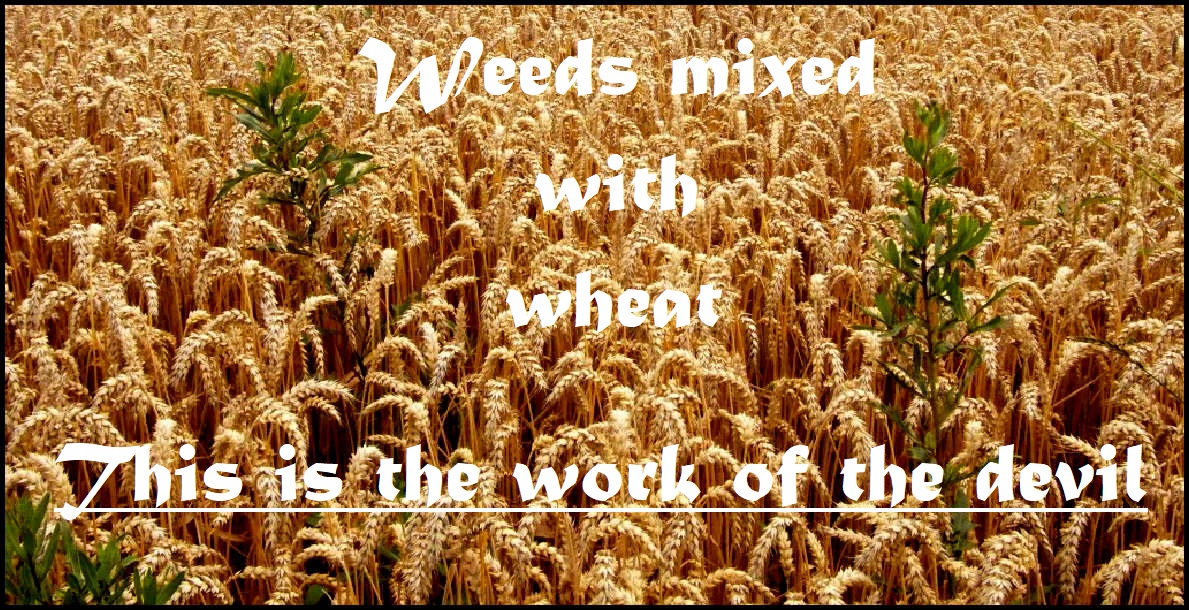
The parable of the wheat and weeds
In the kingdom of God there are weeds growing along the good seeds sowed by the Son of Man. It is the enemy, the evil one, who came at night to sow weeds. Should we pull them out? No. The two look alike. Wait until the harvest when all the weeds will be burned in a big bonfire.
Why this parable? At the time of Jesus, may Jews expected a Messiah who would make everything perfect: expel the foreign powers and restore the good old days of the Jewish religion. There were also groups like the Pharisees who wanted to impose strict purity laws: wash your hands before eating, do not touch unclean objects or people, do absolutely no work during the sabbath, and give ten percent on every penny you earn.
Throughout the history of the church, there have been small groups who broke communion with the church which they thought was corrupt. They created small sects who claimed to be pure in doctrine and practices. Unfortunately, one or two generations later, these sects have become as corrupt as the church they criticized.
Ideally, reformers should try to transform the whole church, rather than separate from it. In any parish in the world there are weeds and troublemakers. In the church of Corinth at the time of St. Paul, there was a sex scandal, and also serious internal divisions. We must show mercy and understanding the way God shows mercy towards us. Rather than separate the weeds from the wheat, Jesus taught "Blessed are the merciful, for they shall obtain mercy. Do not judge, and you will not be judged.
July 16, 2023. Matthew 13:1-23
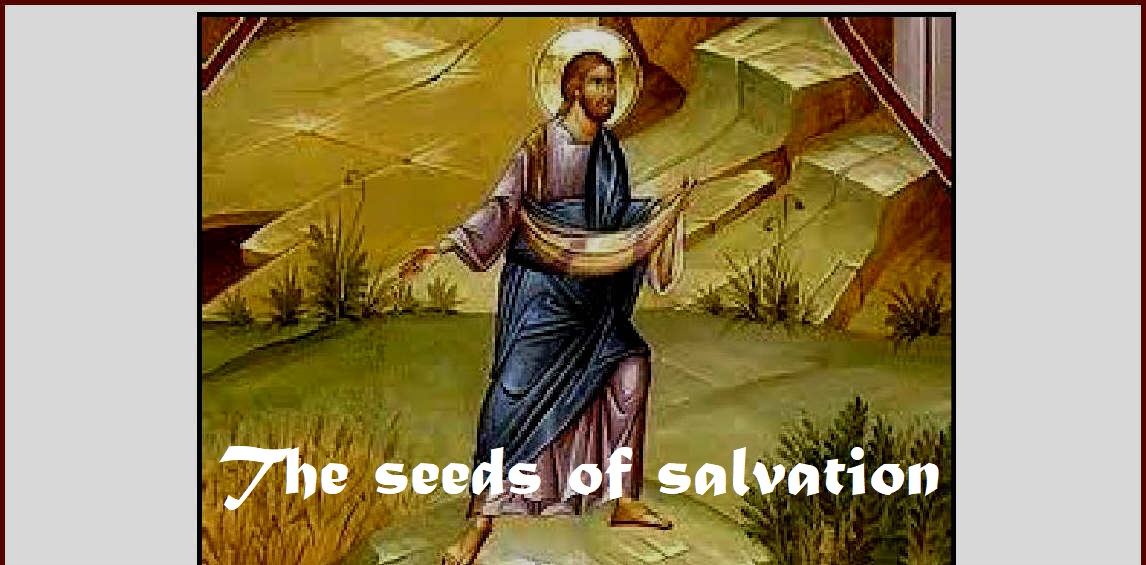
Parable of the Sower and
the mystery of salvation
At the appointed time, the Son of Man came to sow the Good News in the towns and villages of Galilee. He continues to this day through his ministers and everyday events. The seeds of the Sower are not mainly doctrines or moral teachings. The seeds are also the voice of conscience that tells us what to do and what to say. All people can hear that voice.
Not all seeds fall on good soil, but much is lost when falling on rocky soil, on weeds, or on shallow ground. Many people do not respond to the inner voice because they are busy with other things. “The hearts of this people have grown dull. Their ears are hard of hearing, they should understand with their hearts and return, so that I could heal them.” When we do not listen to the inner voice, we hear it less and less, and our hearts become dull.
God's plan is clear: to bring everything under the authority of Christ because He is the alpha and the omega. Everything makes sense in Him, not only the whole universe which He created, but all our actions and thoughts. In Him, through Him, and with Him all things are possible because He is the way, truth, and life. In Him is happiness in time and eternity.
This broad vision was clearly stated by St. Paul in his letter to the Ephesians: "God has made known to us the mystery of His will, according to His good pleasure that He set forth in Christ. And this is the plan: at the right time He will bring everything together under the authority of Christ—everything in heaven and on earth." (Eph 1:9-10) Amen.
July 9, 2023. Matthew 11:25-30
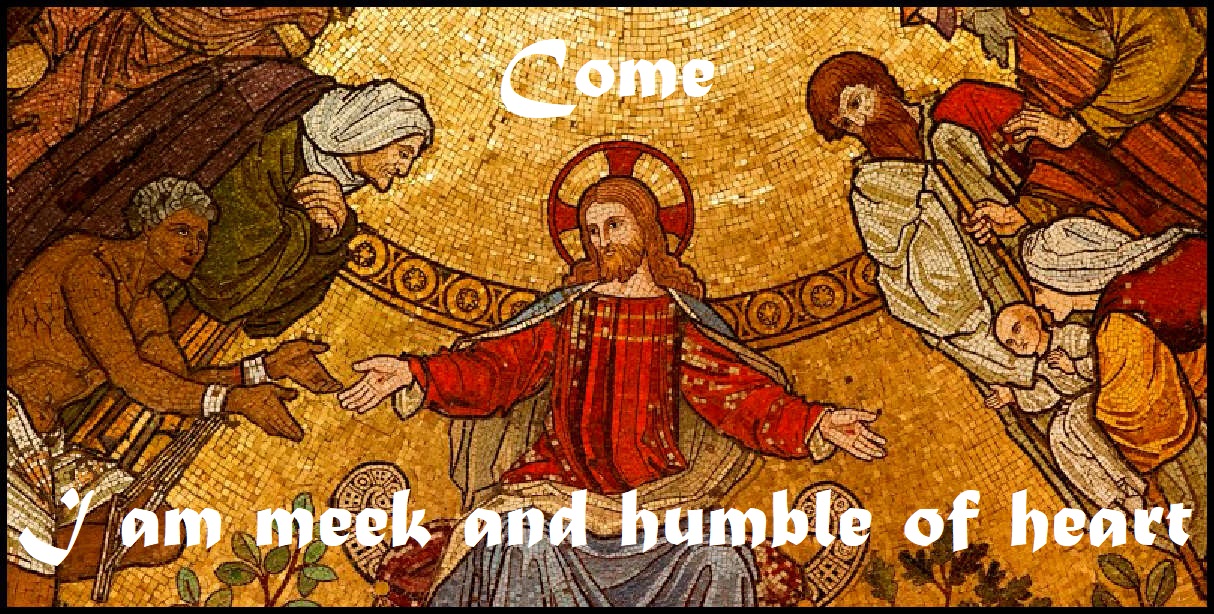
"All of you who are burdened,
come to me and I will give you rest."
"Our hearts are restless until they rest in God." From childhood on, our hearts were restless because we were constantly told what to do. In adolescence, we were restless because we had to decide what to do in adult life. When we were single, our hearts were restless until we found our life companion; then we could say, "This is really the bone of my bone and the flesh of my flesh." Adult life is restless every day of the week because of constant uncertainties in work and family life. In old age our hearts are restless until they finally rest in God.
"Come to me because I am meek and humble of heart." Meekness and humility are not valued in our society. From childhood on, we are told that meekness and humility are forms of weakness for people who cannot move up the social ladder. Wealth and power are not evil. What is corrupting the human heart is the exclusive pursuit of wealth and power. Rich and powerful people can also value meekness and humility. The Lord of creation is rich and powerful, but Jesus chose to be poor and humble.
Meekness and humility give peace to the restless heart because then the heart rests in God rather than wealth and social power. It takes a lot of work to accumulate enough money to buy a nice home with a garden. It also takes also a lot of work to find peace in the humility of God in Jesus Christ. This should be the goal in the whole of one's life.
Meekness and humility are best described in the ideals of Beatitudes which Jesus exemplified in his life:
Blessed are the merciful for they will obtain mercy.
Blessed are the peacemakers for they will be called sons of God.
Blessed are the meek for they shall inherit the earth."
July 2, 2023. Matthew 10:37-42
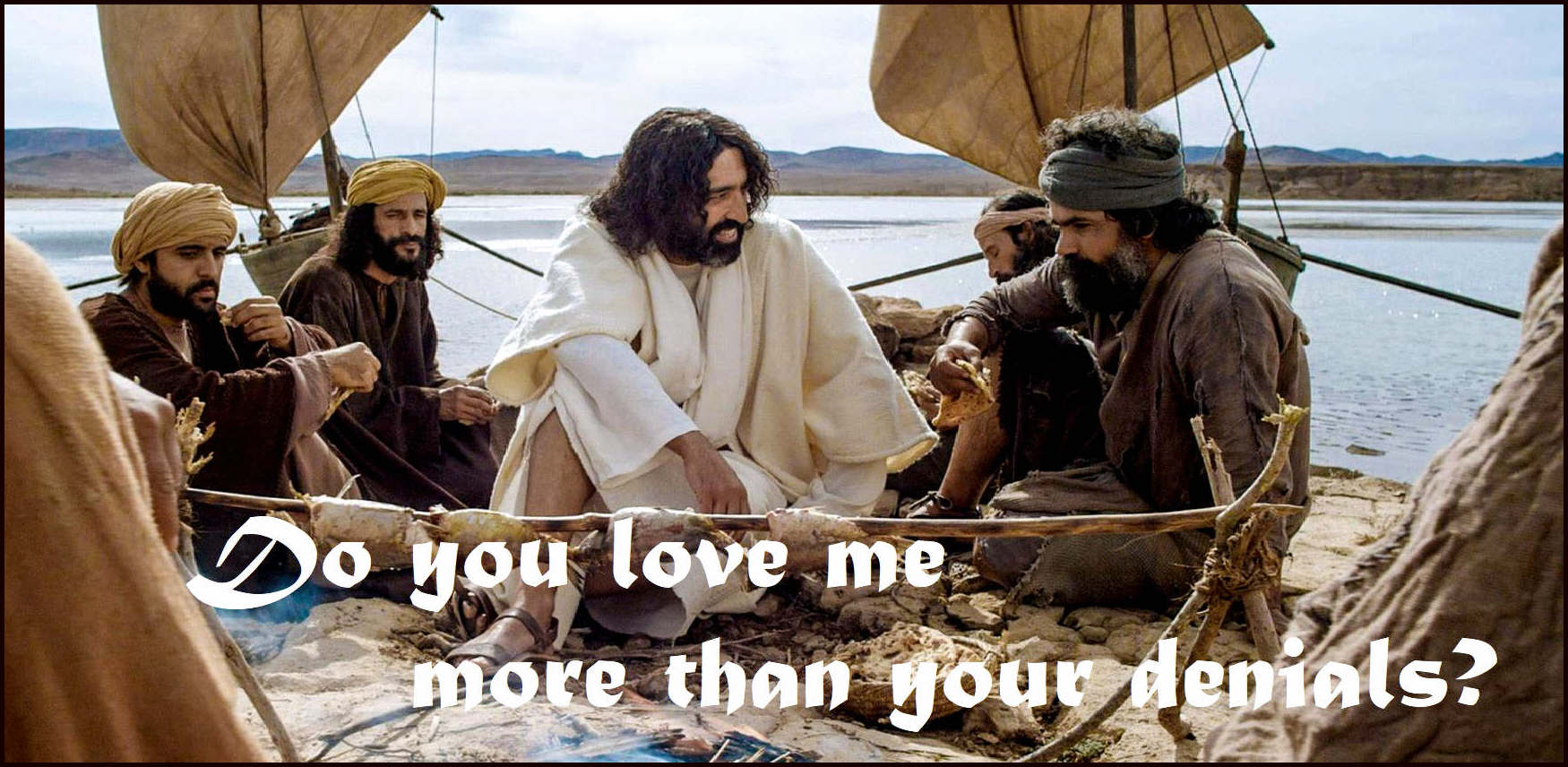
"Whoever loves parents
more than me is not worthy of me"
We must love mother and father, sons, and daughters, and we mut also love God more than we love them. We mut love ourselves, and our neighbors as much or even more than ourselves. We must love our work to be productive. We must love our homes to make repairs and improvements. Whoever loves parents, neighbors, work, and possessions more than Christ is not worthy of him.
"Do you love me more than your denials and deficiencies?" We all have our weaknesses, but we like to hide them or even accept them because we have no choice. Judas regretted his action; he returned the money received for his betrayal of Jesus, but he did not love God more than his betrayal; he did not believe that Jesus loved him enough to forgive and forget his sin.
"Simon, do you love me more than your three denials?" Peter did not try to prove his love by saying, "I tried to defend you when I used my sword in the garden of Gethsemane." Instead, he answered with an act of faith: " YOU KNOW (because God knows) that I love you; I cannot prove it, but you know the love of my repenting heart." Peter recognized Jesus as the son of God who can read people's heart. Judas did not see God as loving repenting sinners but as their judge to condemn them.
An appropriate Psalm for today is Psalm 25:
Remember no more the sins of my youth,
but remember me according to your mercy.
June 25 Twelfth Sunday of Ordinary Time Matthew 10:26-33
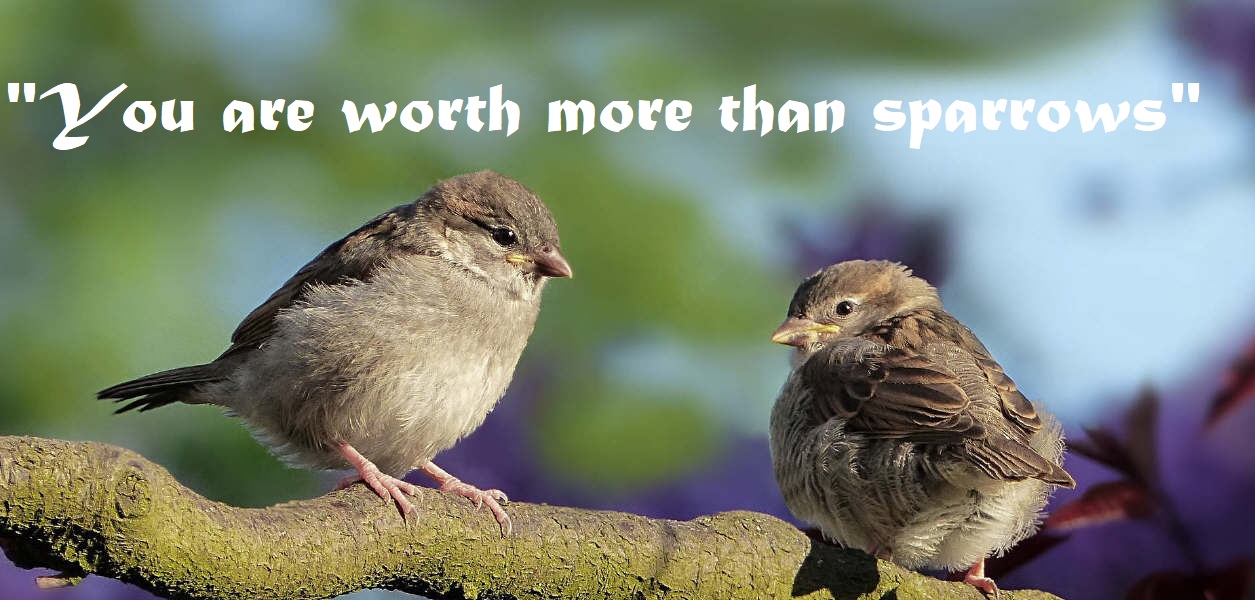
To sheep in the midst of wolves:
"Do not be afraid."
"I am sending you like sheep in the midst of wolves. But do not be afraid: all the hairs of your head are counted. No sparrow can fall to the ground without my Father's knowledge. You are worth more than sparrows."
We all have a mission to fulfill, because we all have gifts and talents to be used for the kingdom of God. The basic mission of most people is towards their family: parents towards their children, of brothers and sisters among themselves, and of neighbors towards neighbors. A few people have a special social mission like that of teachers, social workers, nurses, and doctors. Even without a special mission, we have skills and talents to be used in work, and then we have a mission towards our co-workers.
Our mission is not likely to be dangerous like sheep in the midst of volves, but there is always the danger of failure. Do not be afraid: no sparrow can fall to the ground without my Father's knowledge. We cannot fall to the ground in failure without the assurance that the Father in heaven will help us get up again. The greatest failure is not learning from failure because we have low standards and do not see our failures. When sparrows fall to the ground, they get up and fly away. Be courageous: we are more than sparrows.
"The Lord will cover you with his feathers, and under his wings you will find refuge." Psalm 91:4) Sing this psalm along with the recording.
June 18 Eleventh Sunday of Ordinary Time Matthew 9:36-10:8
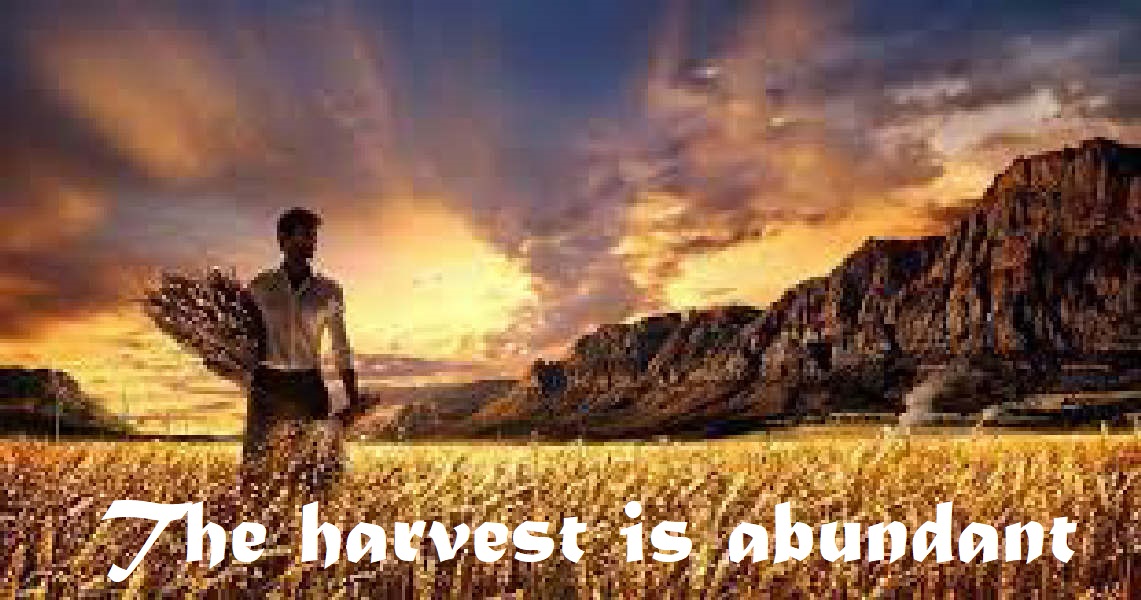
"Go to the lost sheep of Israel"
"At the sight of the crowd, Jesus was moved: they are like sheep without a sheperd. The harvest is bundant but the laborers are few." Looking at what needs to be done to make the world a place of peace and justice, we are moved by how much needs to be done. Individuals, groups, churches, and nations, all are like sheep or flocks without superior guidance. There are few shepherds and prophets in the world. Moreover, often they do not agree.
Most priests and preachers preach in churches, that is, to people who have already heard the Good News. "No, says Jesus. Go to the lost sheep of Israel." It is people who are lost need and want help. Have you ever been lost on the road without a map or a cell phone? When lost we ask for help; when secure we do not want advice. Zachaeus of Jericho was rich but lost. He climbed a tree to see Jesus. He was lost and wanted to be found. Jesus looked up; and saw him and said, ."Zacchaeus, make haste and come down!" He came down and received Jesus joyfully because he had been found. He had found himself: "I give half of my goods to the poor."
On their mission journey, the apostles were to proclaim: "The kingdom of God is at hand. Change your heart." Anybody can tell others to change their ways. Wives tell husbands what to do and vice versa. Parents tell children what to do, but they teach best through examples. We will change hearts only if we have changed our own heart.
June 4, 2023. Solemnity of the Trinity John 3: 16-18
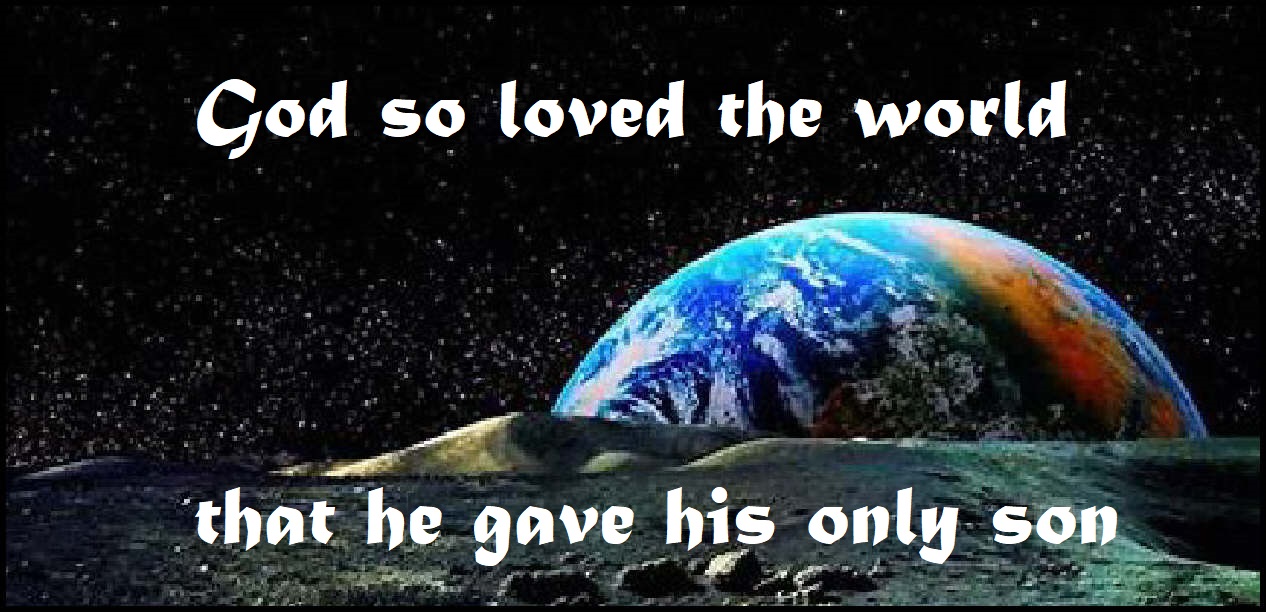
"God sent his son
not to condemn but to save"
God created heaven and earth in seven days. "He looked at everything he had made and found it very good." God loved the earth although he knew it was a world of sinners. At creation, "light came to the world, but people preferred light to darkness because their works were evil." God sent his only son knowing that they will kill him, because he so loved the world. God loves the evil world in spite of its evil.
"God did not send his son to condemn the world but that the world might be saved through him." Many Jews of the time of Jesus believed that the Messiah would liberate them from foreign domination once and for all. Many Christians believe that salvation is achieved once for all through a conversion experience or the sacraments. Salvation is rather the slow process of internal change. "Whoever lives in truth comes to the light, so that his works may be clearly seen as done in God." To live in truth and come to the light is the daily endeavor of coming closer to God, the light of light.
This Sunday we celebrate Holy Trinity. God sent his son who sent us the Holy Spirit. God is one but loves the world in three different ways: as Creator, Savior, and Sanctifier. Creation continues and nature changes and the universe will continue to expand and cool down. Jesus is the model and savior who showed us the way back home to the Father. And the Sanctifier reminds us that Jesus is the Way, the Truth, and Life. Today we celebrate the multidimensional action of Father, Son, and Spirit in the universe and human life.
May 28, 2023. Pentecost John 20:19-23
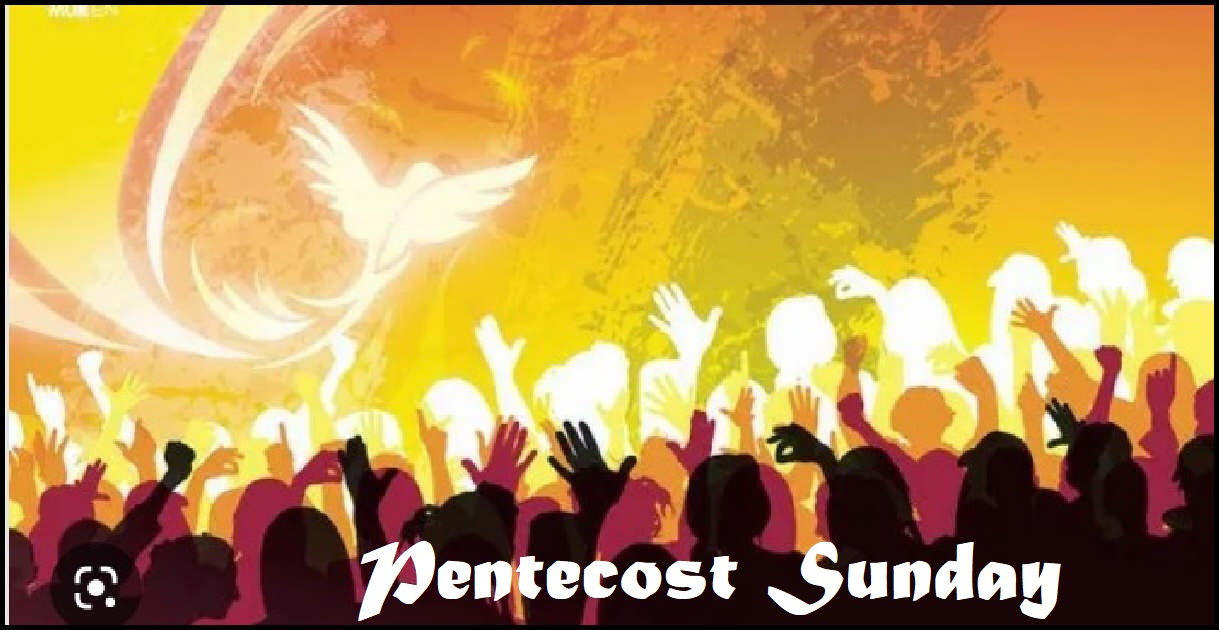
"Receive the Holy Spirit"
We must receive, welcome, and invite the Holy Spirit. Because he is the Spirit of Jesus known to us only through Scripture, to receive and invite the Holy Spirit means receiving and studying Scripture. All that we know about Jesus comes from the four gospels, not church documents, or sermons.
On Pentecost day, the apostles did what Jesus had recommended them before departing into heaven, "Go, and make disciples of all nations." That day, Peter spoke to all nations, being understood by all in their own language. That day, three thousand accepted Jesus Christ and became followers of the Way.
The church was born on Pentecost day when Peter spoke as the leader of the disciples. Jesus was not there to give him advice about what to and what to avoid. Since then, popes, bishops, and individual Christians have made mistakes because they did not receive, welcome, and invite the Holy Spirit through prayer and the study of Scripture. The Spirit of Jesus must be sought throughout life, not just on special occasions.
The Spirit of God is one of holiness and transformation, not of special manifestations like speaking in togues, or prophecies, or making theological speeches. We are judged by our deeds, not our words. "Be holy as God is holy." This is also a main message of Pentecost.
May 21, 2023. Ascension Sunday Mt 28:16-20
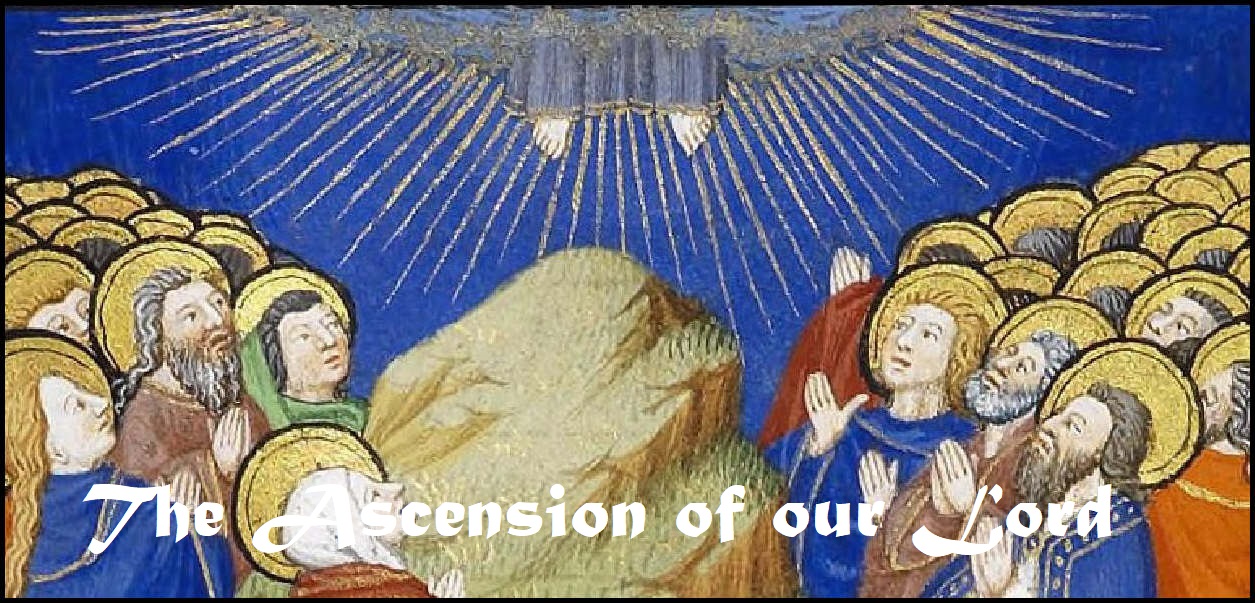
"Go, make disciples of all nations"
The first missionaries of the church are the parents because they teach their children to follow in their footsteps. They preach primarily by example, but they must also teach the basic beliefs and practices of their faith. Teachers want their students to surpass them. Parents should similarly encourage their children to come ever closer to God as followers of Jesus Christ.
Evangelism is not the same as proselytism. Missionaries want to bring the peace and joy of Christ to others, while proselytes mainly want to convert others to their religion. Missionaries want to gain the heart while proselytes want to gain new members. Making disciples is not a question of statistics but of spiritual conversion. The kingdom of God is greater than church membership.
The departing words of Jesus before his ascension were "I am with you always, until to the end of time." Jesus is present but invisible. He promised to send us the Paraclete which means advisor, advocate, comforter, mediator, consoler, defender, helper, and more. The Holy Spirit will do all of this if we listen to him.
For Jesus to be present to us, we have to be present to him and listen at all times to his Holy Spirit. Our conscience is a universal help for a moral life, but believers have much more. If we watch and pray without ceasing, then the inner voice of the Holy Spirit will advise us about what to do and what to avoid, comfort us when we fail, help us improve, mediate in our prayers to God, defend us from the lies of the enemy, and advocate for our spiritual growth. Jesus is present to us if we are present to him.
Maranatha means both "The Lord has come" and "Lord, come!" Maranatha can be our song this week.
May 14, 2023. Sixth Sunday of Easter John14:15-21
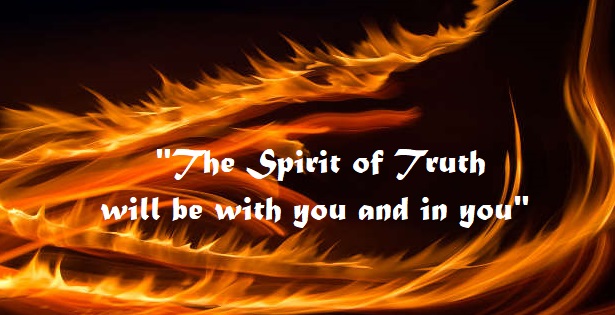
The Spirit of Truth
to fight the Spirit of Lies
Satan is the spirit of lies and deception. It was so from the beginning. "Did God really say, 'You shall not eat from any of the trees of the garden?'" This was just an insinuation. Then came the big lie: "When you eat it, you will be like gods." With this lie insinuated in her mind, the women saw that "the tree was desirable for gaining wisdom." Jesus, too, was confronted with the Big Liar who showed him all the kingdoms of the world and said, "All these I will give you if you worship me." The glory of all the kingdoms of the world is desirable. Many people will pay any price for it.
The Spirit of Jesus is a spirit of truth, rather than just a spirit of faith and love, because without truth there can be no true faith and love. The first mission of this Spirit is to unmask the lies that surround us. Advertisements are promises to satisfy our desires. New shoes are desirable; but I already have several of them. "This pair comes at a bargain price: just charge it on your credit card." What's wrong with that? Westerners see between 4,000 and 10,000 ads a day, and all inflame our earthly desires, like in the Garden of Eden.
The Spirit of Jesus brings peace and joy but only if we are in his true. There are many forms of limited truth in Christianity. The most damaging is probably superficiality. "I believe everything my church says," but where is your intelligence? How deep or superficial is your understanding of the Spirit of Truth? "I practice everything my church tells me to," but how much faith and love comes with these practices? How much do you grow in the spirit of the Scriptures?
"The Spirit of Truth will be with you and in you" because Jesus will be with us until the end of time, but we must be able to listen to his voice. This is the most difficult aspect of it: we must cultivate enough external and internal silence to be able to hear him. If we keep our cell phone turned off, we will not receive messages. Let us keep our hearts open and active, so that we can vibrate when the Spirit talks to us.
May 7, 2023. Fifth Sunday of Easter John14:1-12
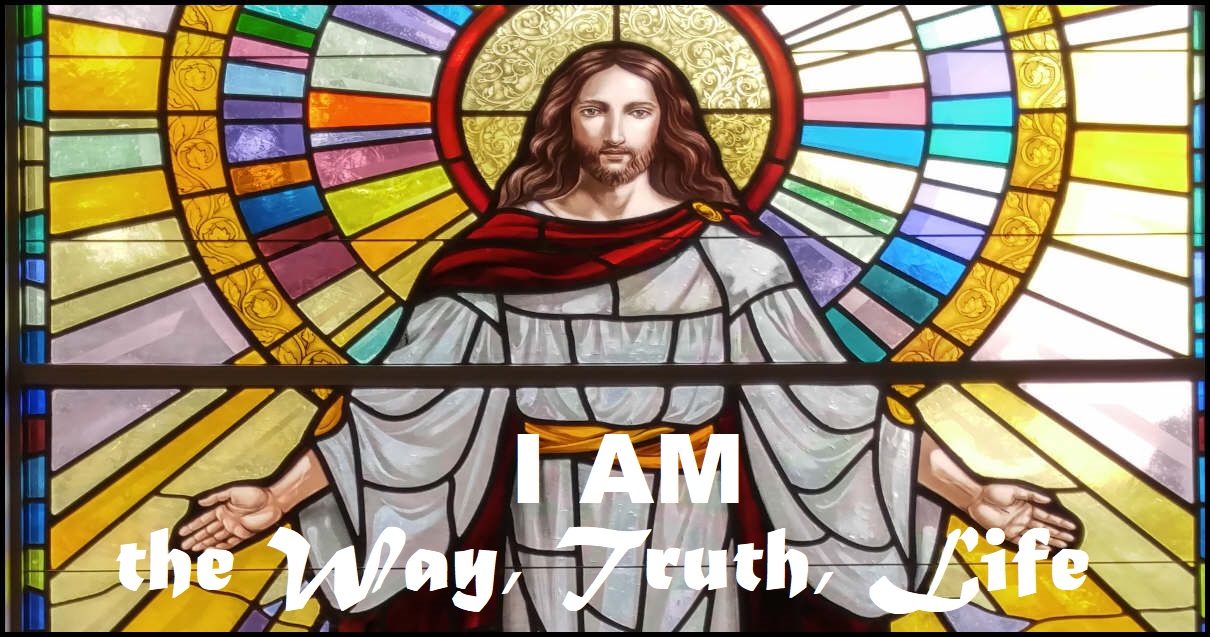
Jesus is the Way, the Truth, and the Life
"All things came to be through Him and without Him nothing came to be." Jesus is the eternal Word that created the universe. He was before time and will be at the end of time. We participate in His divine identity through nature and by adoption. We were created at the image and semblance of God, having intelligence and will to seek and find him. We are sons and daughters by adoption as the gift of salvation. We become more like Jesus when we follow his way of life.
Jesus is the truth rather a true doctrine. There is very little intellectual doctrine in the gospels but much spiritual truth. The truth of the gospel is a way of living, that of Jesus Christ which is best described in the Beatitudes. Blessed are the poor, the meek, the pure in heart, and the peacemakers because these qualities reflect the highest gospel ideals. Trying to be poor, meek, and pure in heart conforms us to Jesus who is both Life and Truth.
Jesus is also the way. There are many worthwhile philosophies and moral codes to lead a good life. There are also many religions that lead upwards in different ways. Many of these philosophies and practices are easier to follow than imitating Christ. But Jesus as Way, Truth, and Life is more than philosophies and moral practices. He also offers more inner joy nd peace than moral philosophies.
Psalm 19:8-12 is most approrpriate today: "The law of the Lord is perfect, refreshing the soul"
April 30. Fourth Sunday of Easter John 10:1-10
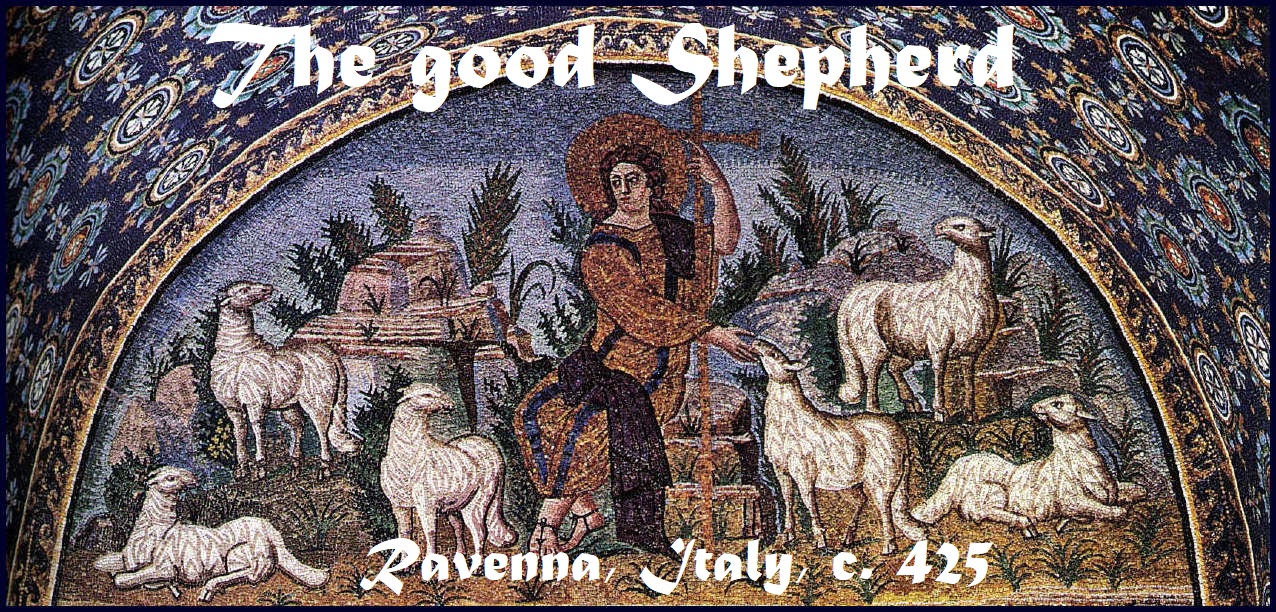
"I know my sheep and they know me"
We know the Lord only dimly, like through an opaque glass. "Seek and you will find." Scripture is an opaque glass: we understand its words and its general meaning, but it takes much searching to find there the bread of life. Our hope is not to see the Lord with naked eyes, but to keep alive the hope to eternal life. By following the God Shepherd we can sing with Psalm 25, "To you, O Lord, I lift up my soul; my God, in you I trust."
"I have other sheep who do not belong to this fold, and these I must lead also." The apostles spread the Word to the next generation. It is now our turn to bring more sheep into the fold. This begins with family life. Today the transmission of faith to the younger generation is more difficult because of the great changes in the world. In the past, family life was transmitted through obedience to tradition, while today faith is a personal choice. Young people can make a mature decision only if their religious education has been rooted in Scripture and family practices. Christianity is not a philosophy but a lived experience. Professors can teach philosophy, but faith can only be taught through example and experience; we can only share it through words and deeds.
Jesus was seen as beardless in the 5th century, as shown in mosaic of Ravenna shown above. Today people in Africa want to see Jesus as African, people in Asia as Asian, and people in Latin America as Latino. Today the world cannot copy the European model anymore; each country and culture must discover images of Jesus in its own words and images. Each Christian must become another Christ, and each culture must transmit its own images of Jesus to the next generation.
The most appropriate song for today is Psalm 23, The Lord in my Shepherd
April 23. Third Sunday of Easter Lk 24:13-35
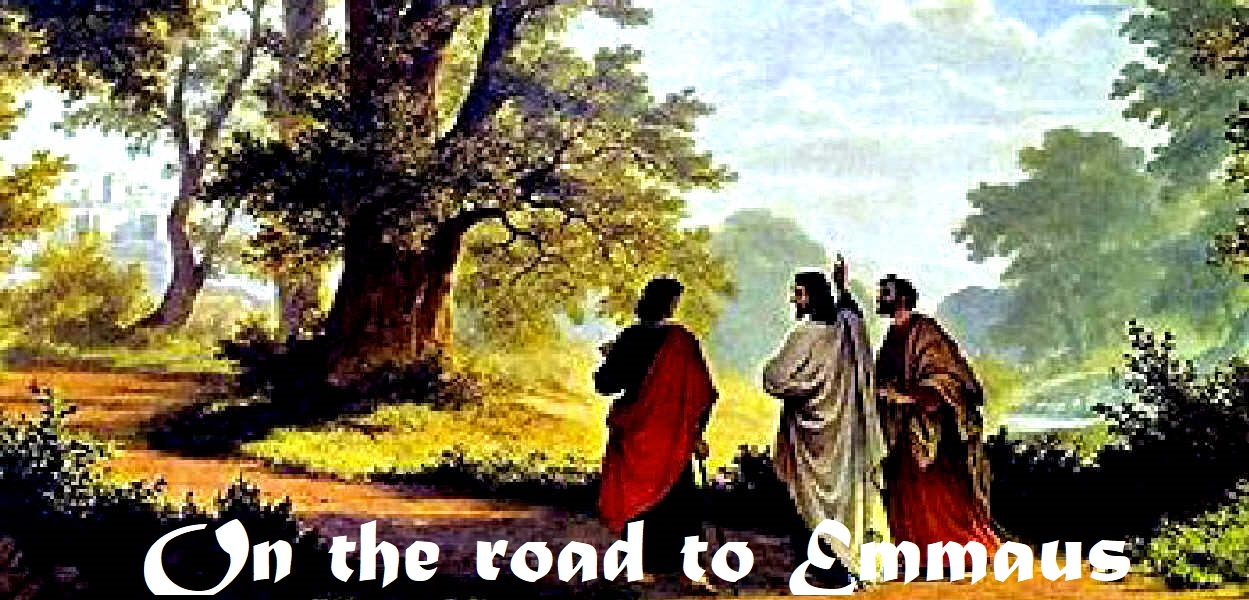
"Our hearts burned within us"
but they did not recognized Jesus
In their journey to Emmaus, the two disciples did not recognize Jesus. Strangely, they explained to Jesus what happened to Jesus of Nazareth "who was a prophet mighty in deeds and words. Our chief priests and rules handed him over to a sentence of death and crucified him." They also tell Jesus "Some women went to the tomb but did not find his body. An angel announced to them that he was alive," but they did not believe it. In prayer we often tell God things which God already knows. This is what prayer is: telling God about our needs, but God obviously knows them. Then, most of the time, nothing happens. Not exactly: "Our hearts were burning when he spoke to us on the road, " although they did not recognize him.
These two disciples had all the information about Jesus: his mighty words and miracles, his disgraceful trial and condemnation, the visit of women to the empty tomb, and the confirmation by Peter and John that the tomb was empty. They were conversing and pondering these events but could not understand them. The idea of a resurrection from death could be no more than a ghost story. Something more was needed.
Beginning with Moses and all the prophets, Jesus interpreted to them the Jewish scriptures, showing that "it was necessary that the Messiah should suffer these things and enter into his glory." No single passage of the scriptures said that the Messiah would be crucified and come back to life three days later. One must go beyond the literal reading of the texts, and see their internal logic. Many passages (not just one) speak about a mysterious servant who would bear the sins of his people, yet death would not contain him, for nothing is impossible with God. It is when they saw this inner logic, that the disciples' heart was burning with excitement and joy.
There is no plan or method for spiritual discovery. The wind blows and we do not know where it comes from. The gifts of the Holy Spirit are unpredictable. However, we may be inattentive when the wind of the Spirit blows. "Therefore, keep watch, for you do not know the day and the hour..."
It may be appropriate to sing the Taizé song, Veni Sante Spiritus.
April 16, 2023. Second Sunday of Easter Jn 20:19-31
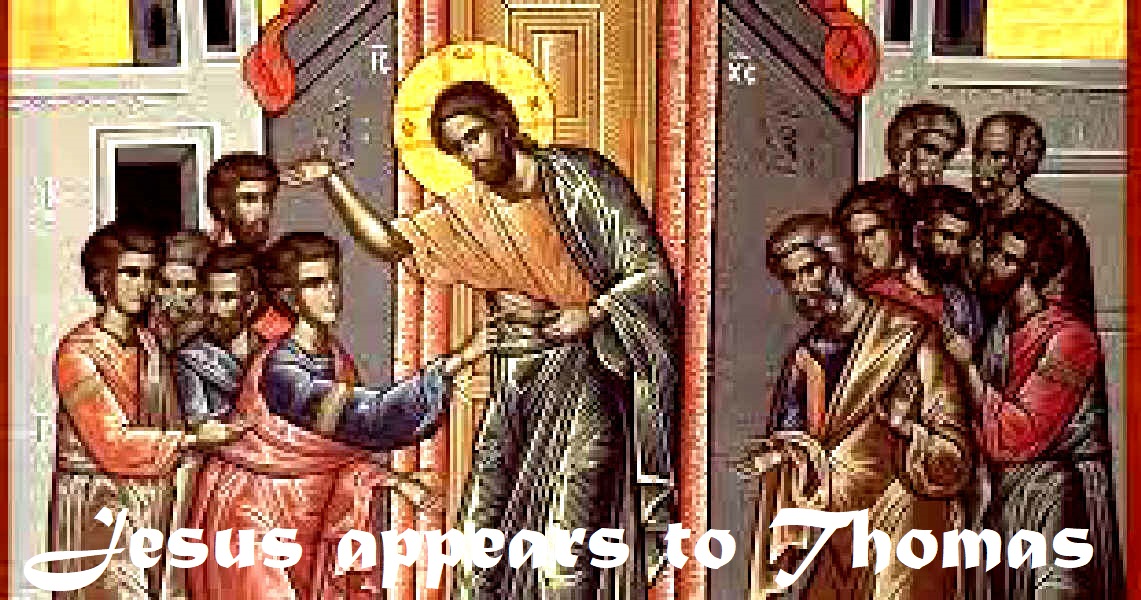
"Peace be with you!"
On Easter Sunday when the apostles were hiding behind closed doors for fear of the Jews, Jesus appeared to them and said, "Peace be with you." He brought peace those who had abandoned him and felt shame and embarrassment. The apostles were happy to see him, and then he said again, "Peace with you." He is the prince of peace who brings serenity not through the denial of conflict, but through inner assurance and spiritual hope.
Thomas was not there when Jesus appeared, but he insisted, "Unless I see the marks on his hands and feet, I will not believe." It is healthy to doubt and there is no mature faith without doubt, but to reject the testimony of all ten of your best friends is not maturity but stubbornness. One week later, Jesus appeared again and said to Thomas, "Touch my hands and my side and believe. Blessed are those who believe without having seen." Nobody will ever see Jesus again and touch his hands and side; all have to believe without personally seeing and touching.
We do not believe blindly and uncritically. The best testimony of truth is inner peace. The mystery of salvation, the mystery of victory over death through the resurrection of Jesus is difficult to understand and justify rationally, but it brings peace and inner satisfaction when one accepts it. Faith is trust, and trust means inner reconciliation with what seem rationally impossible.
This is the time to sing Alleluia with the Benedictine monks of the abbey of Saint Meinrad.
April 9, 2023. Easter Sunday
This is God's mystery of salvation
The death and resurrection of Jesus Christ is the culmination of God's design of salvation. The whole history of Israel, the covenant of God with Abraham and Israel, and the expectations of the prophets reach their ultimate meaning in this event. If Christ is not risen, our faith is in vain, but in its realization, there is hope for humanity.
Through the death of Jesus, sins are forgiven, but more importantly, through his resurrection there is hope for a new life. It is much more than the hope of eternal life as if this life were only a waiting period. No. There can and must be hope and transformation in this life, not just in the afterlife.
The promise of eternal life is not like winning the biggest prize at a National Lottery. The prize of eternal life is given, not in a big lump-sum payment, but as a daily allowance, not as a material gift but as the special gifts of faith and hope.
What is life without hope? Most people, most of us, have faith in themselves, their resources, their skills, their bank account. This faith gives little hope in times of trouble. Our faith and hope in Jesus Christ and his resurrection, every day in our lives.
April 2, 2023. Passion Sunday Mt 26:14-7:66
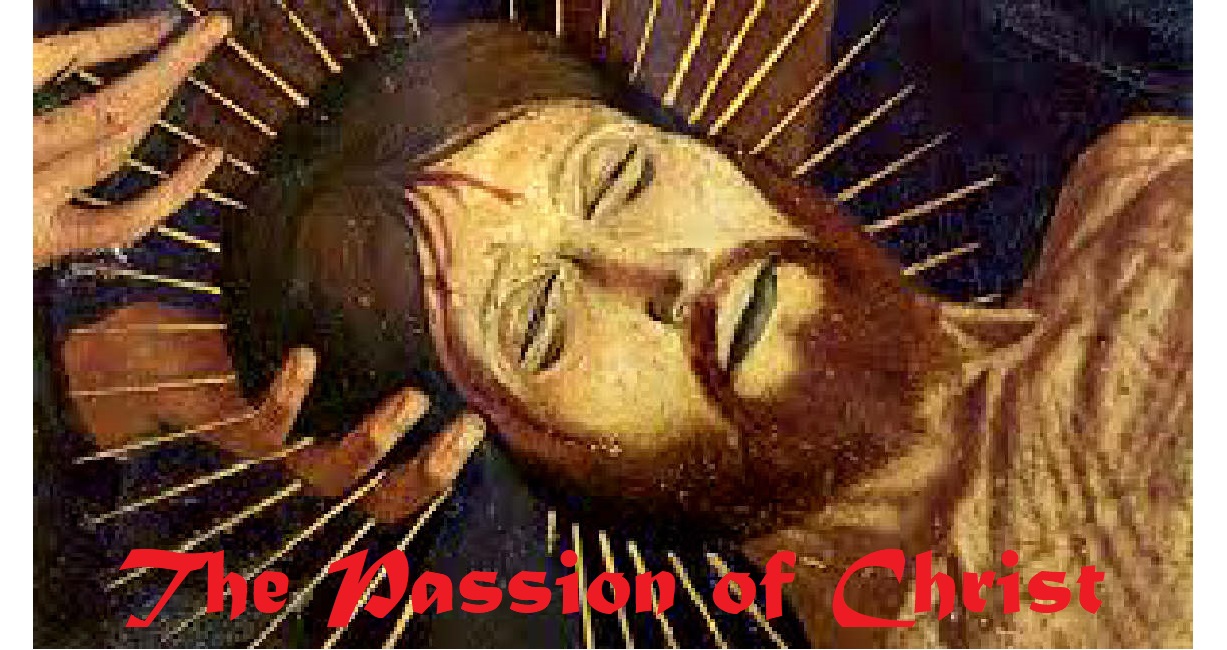
"He was despised and abandoned by men,
A man of great pain and familiar with sickness;
And like one from whom people hide their faces,
He was despised, and we had no regard for Him.
However, it was our sicknesses that He Himself bore,
And our pains that He carried;
Yet we ourselves assumed that He had been afflicted,
Struck down by God, and humiliated.
But He was pierced for our offenses,
He was crushed for our wrongdoings;
The punishment for our well-being was laid upon Him,
He was oppressed and afflicted,
Yet He did not open His mouth;
Like a lamb that is led to slaughter,
And like a sheep that is silent before its shearers,
So He did not open His mouth.
And by His wounds we are healed."
Isaiah, chapter 53.
It is appropriate to sing the Improperia which are sung on Good Friday:
My people, what have I done to you?
How have I offended you? Answer me!
I led you out of Egypt,
from slavery to freedom,
but you led your Savior to the cross.
My people, what have I done to you?
How have I offended you? Answer me!
You may also like to listen and sing:
Were you there when they crucified my Lord?
Oh! Sometimes it causes me to tremble, tremble, tremble.
Were you there when they took him from the cross?
Were you there when they led him to the tomb?
Were you there when the stone was rolled away?
March 26, 2023. Fifth Sunday of Lent John 11:1-45
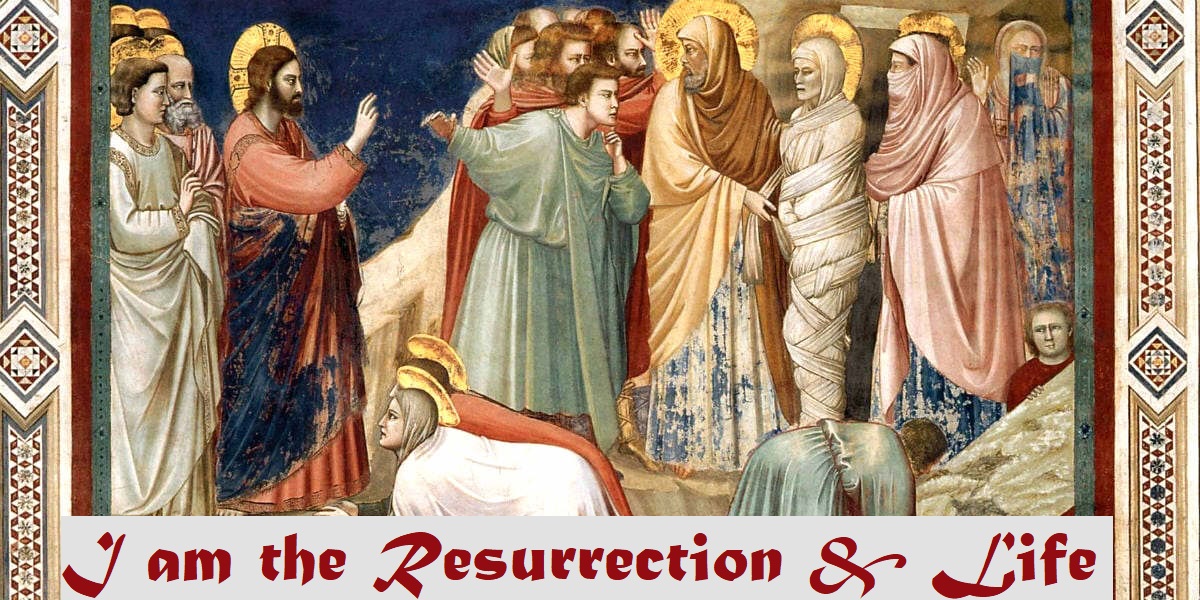
"Whoever believes in me will live"
"Everyone who believes in me will never die." Of course, we will all die, but those who believe in the Resurrection of Christ will die hoping to be forever with the resurrected Jesus. This is the difference between faith in eternal life and the despair of annihilation through death.
Lazarus had been dead for four days, and his body was decomposing. After one or several years, our bodies return to the dust of the earth, yet the power of God can bring them back to life. How? We are not told. How did Jesus come back with a spiritual body? We do not know. This knowledge lies beyond the possibility of scientific knowledge, but it is our faith and hope. In the Creed every Sunday we reaffirm our conviction: "I believe in the Holy Spirit, the Holy Catholic Church, the communion of saints, the forgiveness of sins, the resurrection of the body, and life everlasting." As St. Paul argued, "If there is no resurrection of the dead, then our preaching is in vain, and your faith is in vain. (1 Corinthians 15:12)
A few weeks later, there was a dinner given in honor of Jesus in the presence of Lazarus, Martha, and Mary. We can only imagine the festive atmosphere of this reunion. All the tears and the grief about death had been washed away. This is the reunion we will experience when we will be reunited with all our relatives and friends. All the bad memories of past grievances, unpleasant encounters and communication, and the unpleasant aspects of our personalities will be erased and transformed. We will all be perfect and holy, in contemplation of the eternal Holy of Holies. It will be the banquet of eternal life. This is what we proclaim in the Creed: "I believe in life everlasting."
It may be appropriate to sing with all the pilgrims of Taizé, "In resurrectione tua Christe coeli et terra laetentur! (In your resurrection, Christ, heaven and earth rejoice!) "Everyone who believes in me will never die."
March 19, 2023. Fourth Sunday of Lent John 9:1-41
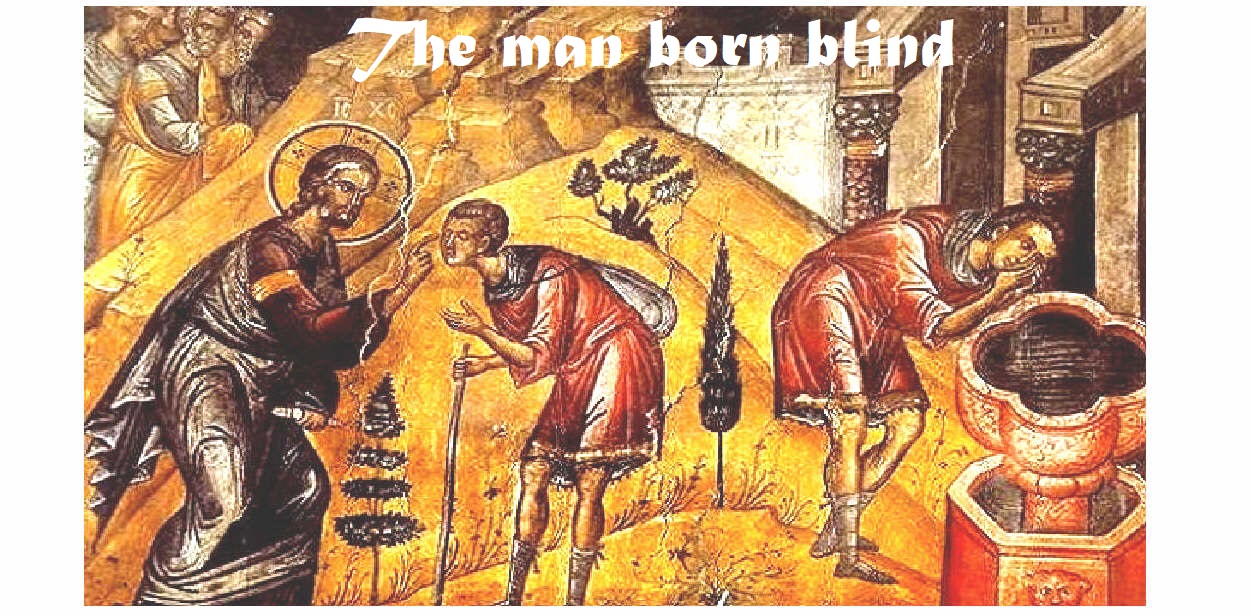
"I have come so that those who do not see might see"
In contact with Jesus, some people find spiritual light while others turn into darkness. Today's reading has two stories: a blind man came to see light, and his opponents refused to believe. But this is an everyday story. Here is a modern version.
A man says he has been miraculously healed; he was blind from birth and now he can see. Some people said it is a miracle, but others that he simply pretends to be healed. The man is taken to a group of doctors. "Impossible," say the doctors. "The miracle healer did not have a medical license; he must be a fake." They called in the parents. "Is this your son born blind? What happened?" "Yes, this is our son," the parents replied. "Ask him; he knows." The doctors called back the healed man. "Your miracle is a fake; this is the scientific truth." "Maybe," said the man. "To be healed is a gift from God, and God does not need the approval of science to make miracles." At that, the man was kicked out.
Jesus met the man in the street. "Do you believe that God can healed through the Son of man, even without science?" "Yes, said the man, I believe in Him, and I take him as my Lord and savior."
Miracles are gifts from God. They do not need to be proven by science. There are many small events in daily life that are real gifts from God, but not miracles verified by science. If we give thanks for these small gifts, we show that we have faith in God as our Lord and savior. This is our hope and our faith.
March 12, 2023. Third Sunday of Lent. John 4:5-42
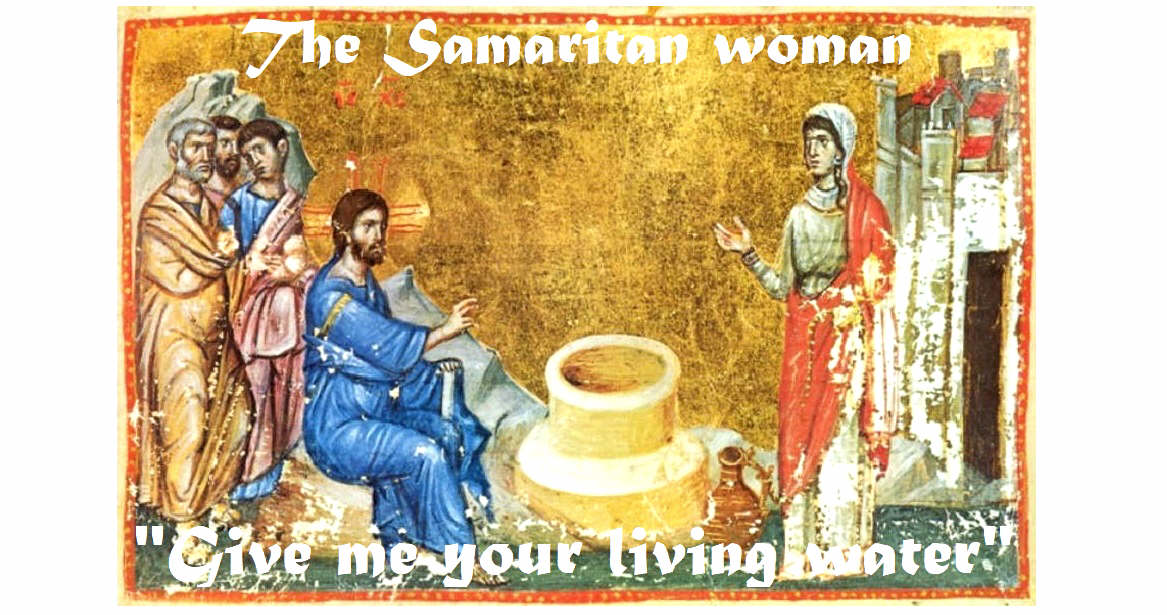
"I am the bread of life"
and I can give you living water
In the story of the Samaritan woman, the roles are reversed. It is the woman – it is us – who are thirsty, in need of living waters that will quench our thirst forever. But we can only think of immediate needs, material things. When Jesus repeats that he can give water than will endlessly bubble to eternity, the woman (and we) persist: give me this kind of water so that I do not need to come back to the well.
"Go and call your husband," said Jesus, to which the woman replied, "I have no husband; I had five of them, but none made me happy." This is her truth before God, a painful truth that she willfully acknowledged. Now we are at a level of truth that goes beyond the material needs of food and water. This is the level of prophets, and prophets know the truth about religion. "Our ancestors worshiped on this mountain [Mount Gerizim], but you Jews says it should be in Jerusalem." Now the woman wants to have a theological discussion about the Jewish-Samaritan conflict. If Jesus is a prophet, he can solve this problem. No, this is not the time for such a discussion. "The hour is coming when true worshipers will worship the Father in Spirit and truth." This is true worship, the one that will bring forth a spring of water for eternal life."
"I am the bread of life; whoever comes to me will never hunger, and whoever believes in me will never thirst." But in what sense if Jesus a bread of life?
"My food is to do the will of the one who sent me." Our food is also to do the will of God by following the examples of Jesus. This is what the Samaritan woman did. Jesus had told her, "Go and call your husband." She did and came back, not with her five former husbands, but the whole town. They believed. they said, "because of the word of the woman who testified, 'He told me everything I have done.'" Truth sets us free. Truth is another source of inner life what wells for eternal life.
March 5, 2023. Second Sunday of Lent Mt. 17:1-9

"He is the God of the living, not of the dead"
On Mount Tabor, when Jesus was transfigured, Moses and Elijah appeared conversing with him. Peter, James, and John recognized them as representing the whole Jewish scripture, Moses standing for the law given on Mount Sinai, et Elijah as the prophet of holiness who saw God on Mount Horeb. Then and today, the law requires behavioral conformity while the holiness of God demands spiritual transformation. Moses and Elijah came to witness that Jesus is the perfect fulfillment of the commandments and also the perfect holiness of the God three-times holy.
The saints of Judaism and Christianity are alive in God, not shadows sleeping in the dust of their dead bodies. Abraham, Isaac, and Jacob could have appeared with Moses, and Amos, Jeremiah, and Isaiah with Elijah. Today we know and believe that Peter and Paul are present in the eternity of God, but also the other apostles, together with Stephen, and all the martyrs and saints -- and also the not so saintly followers of Jesus through the ages. We believe in the ternal life to come, and also in the resurrection of the bodies on the Last Day.
Since early Christianity, the Transfiguration has been seen as the symbol of the spiritual transformation of Christ's followers into an ever-better image of Jesus in his humanity and divinity. This has been called divinization (theosis) in Greek theology and deification (or more commonly, sanctification) in the West. Augustine put it clearly, "The one who was God made himself human in order to make gods of those who were merely human. ” This will happen slowly if we collaborate with God's grace. Let us pray for it.
February 26, 2023. First Sunday of Lent Mt. 4:1`-11
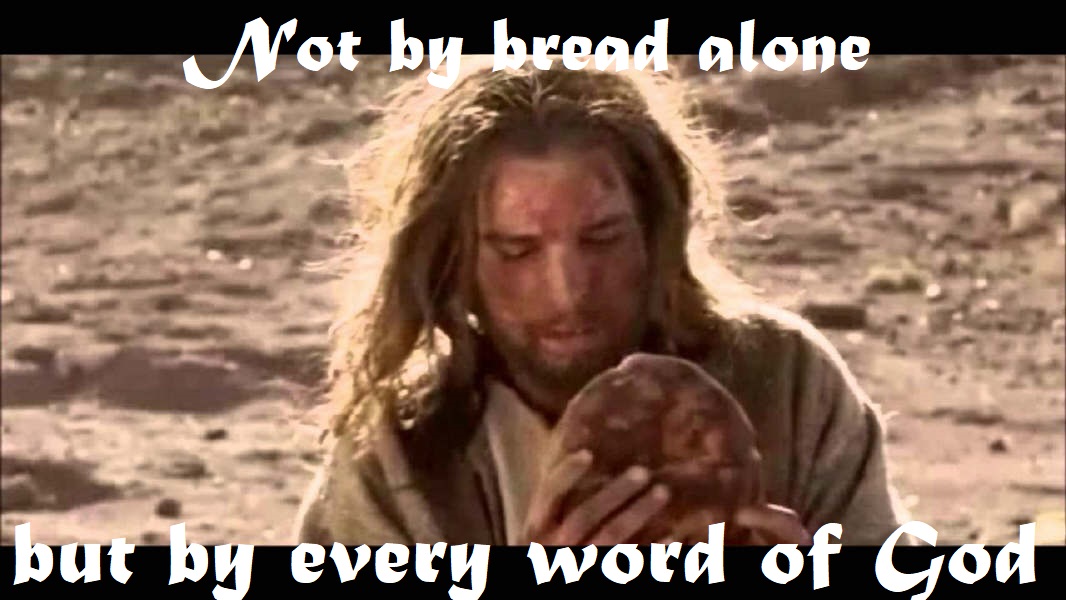
Jesus Christ is the bread of God
"Jesus was led by the Spirit to the desert to be tempted by the devil." For forty days and forty nights, Jesus fasted from food but nourished himself with the word of God. When the tempter came, Jesus was ready to speak to the word of God the devil. "Command that these stones become loaves of bread." No! Quoting the book of Deuteronomy, "One does not live by bread alone." There is more to life than food and material goods. Not just the word of God, but "every word that comes forth from God." God speaks in many languages: through scripture reading, through church teachings, through events, through all of these, but most importantly through the life and example of Jesus Christ.
"Throw yourself from the top of the temple, because the angels will protect you from hurting our foot against a stone." Psalm 91 clearly states that the Lord "will command his angels to guard you so that you will not strike your foot against a stone." Jesus himself said, "“Ask and it will be given to you; seek and you will find; knock and the door will be opened to you." (Matthew 7:7) Isn't this clear enough? " Whatever you ask in my name, that I will do, that the Father may be glorified in the Son. If you ask anything in My name, I will do it." (John 14:13). But to take these words literally is to put God to a test. Scripture also says, "You shall not put the Lord to a test." (Deuteronomy 6:16). Jesus himself said to the disciples on the road to Emmaus, "You fools!" You understand the letter but not the spirit. By taking the words of God literally, we put God to a test.
The last temptation is about power and wealth. This is the story of Doctor Faustus who sells his soul to the devil to gain supernatural powers. Some politicians, some would-be millionaires, some would-be movie stars are ready to sell their soul, so to speak, to achieve what they want. Power, wealth, and fame are very attractive to all of us. They easily become our secret idols. No! " “Away from me, Satan! For it is written: ‘Worship the Lord your God, and him alone you shall serve.'"
February 19, 2023. Mt. 5:38-48
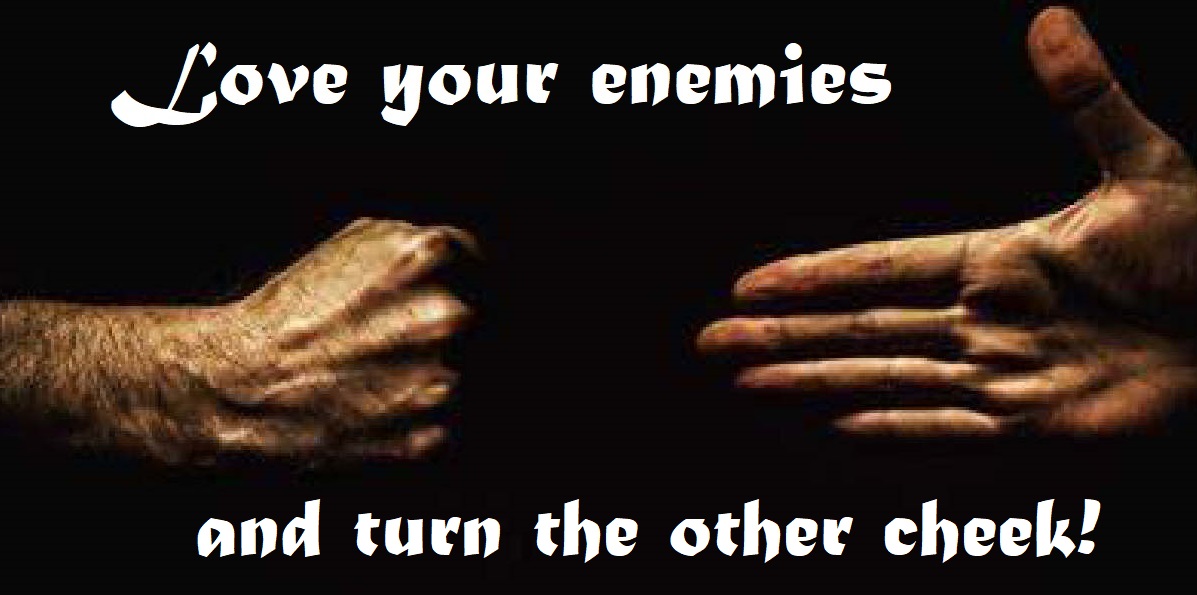
No eye for eye.
No hatred for hatred. No violence for violence
"You have been told, 'An eye for an eye,' but I say to you, offer no resistance to evil." Very often the best way to face evil is to walk away from it. When we are attacked, it is tempting to counterattack. It is often better to say, "Let's talk about this tomorrow!" People will probably say, "No! Now! Right now!" They want a fight, and any fight can get ugly. Responding to an attack one day later will be more moderate, without hurting feelings, and very often, the problem has been solved and forgotten.
"When someone strikes you, offer the other cheek." This is a hyperbolic way of talking. When Jesus was hit before the Sanhedrin, he did not turn the other cheek but rebuffed the attacker: "If I have spoken wrongly, show it, but if I have spoken rightly, why do you strike me?" When someone strikes us, it is an offense against justice, and we must say so (or remain silent).
"You have heard, love your friends and hate your enemies, but I say love your enemies, and pray for those who persecute you." Forgiving one's enemies is the first step. This is easier when can understand their behavior. Jesus forgave, saying that they do not know what they are doing. This is often the case: people do evil without knowing what they are doing. Evil can be part of a culture; acts of evil may be inspired by uncontrolled emotions. Forgiving our enemies is the best way of not feeling bitterness and a need for revenge. In short: No hatred for hatred. No violence for violence.
February 12, 2023. Mt. 5:17-37
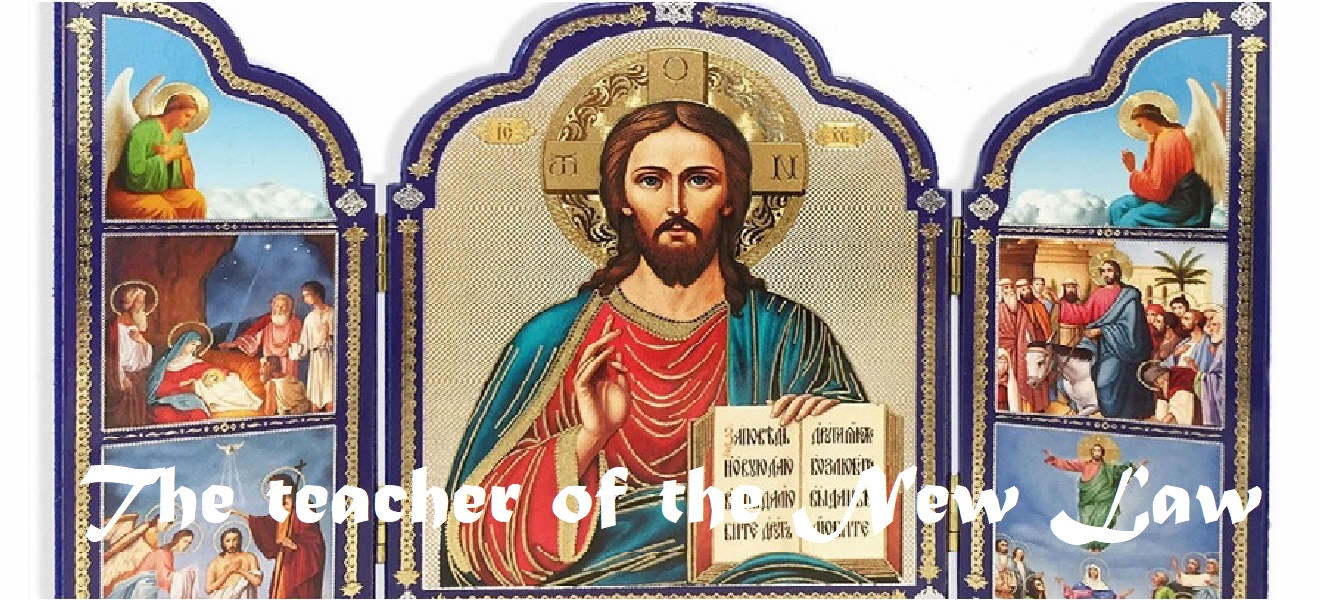
You have been told...
but I say to you...
"I have come not to abolish but to fulfill the Law. "Do not kill" is the law of the land, but for Jesus it is, "Do not get angry at your brother." Anger can be the first step to murder. We can kill in many ways Angry words can wound the feelings, and such wounds can hurt for a long time. Angry words can kill the reputation of others, and such wounded reputation can last a long time. Anger can fill oneself with bitterness and resentment, which can become a desire for revenge. Anger takes away peace in self and others. Anger should be banished in the New Law.
Do not commit adultery, but Jesus said, "Anyone who looks at a woman with lust has already committed adultery in his heart." Lust is the first step on a slippery slope. How far can we go before going too far? It is best not to engage on this road. But sex appeal is the hook of advertisements: sex appeal can sell nearly anything. Lust is part of human nature. We cannot eradicate it but we can try to control it, being warned about its dangers by the New Law.
Whoever divorces his wife causes her to commit adultery, and who marries a divorced woman is committing adultery." This was literally true in Judaism when men could expel their wives simply by filling a divorce form. In all societies, an easy divorce leads to all kinds of problems. "You become like the 5 people you spend the most amount of time with." Selecting one's friends and spouse is often more important than choosing one's career. Good friends and family relations should last a lifetime.
"Let your 'Yes' mean 'Yes' and your 'No' mean 'No.' Anything more is from the evil one." Transparency to others is the foundation of friendship. In situations of tension, it may be best to use diplomatic language. When 'Yes' means 'Yes' it says that we have nothing to hide, so that we can share the peace of God.
February 5, 2023. Mt. 5:13-16
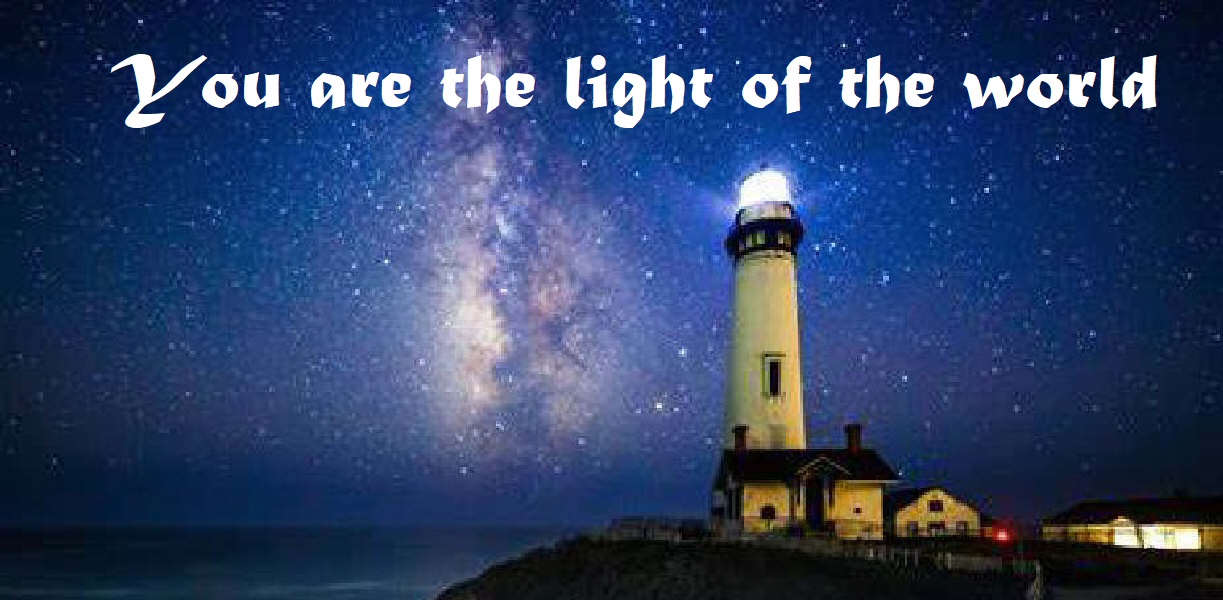
Without Christ's light, the world is in darkness
"I am the vine; you are the branches. Whoever remains in me and I in him will bear fruit. because without me you can do nothing." (Jn 15:5) We will produce good work to the extent that we seek inspiration from Jesus Christ and follow his example. Christians are supposed to be followers and disciples of their master, not just in worlds but also in deeds.
Non-Christians and pagans can also bear good fruit. Two outstanding examples are Mahatma Gandhi in India and Nelson Mendela in South Africa. One can be a exemplary human being and have no religion. Some Christians who never go to church can be more lovable than regular churchgoers. Yet they are all made in God's image and resemblance. We all have the imprint of God in our hearts, whewther we go to church or not.
"Whoever remains in me and I in him will bear fruit." Many people can testify that it is their trust in God that helped them go through difficult times. Most followers of Jesus can also testify that with God's help they have improved, even if it is only a little. God's grace lifts us up from where we are. Some Christians start from a low level while some non-Christians may be more gifted by nature. "Without me you can do nothing," or very little. With God's grace we can do a lot.
Like John the Baptist we must say, "He must grow, and I diminish." The more we make Jesus present in our lives, the less we become preoccupied with ourselves and our achievements. The more we imitate our Master, the more we will resemble him. And then we become more and more a light for the world.
January 29, 2023. the beatitudes Mt 5:1-12a
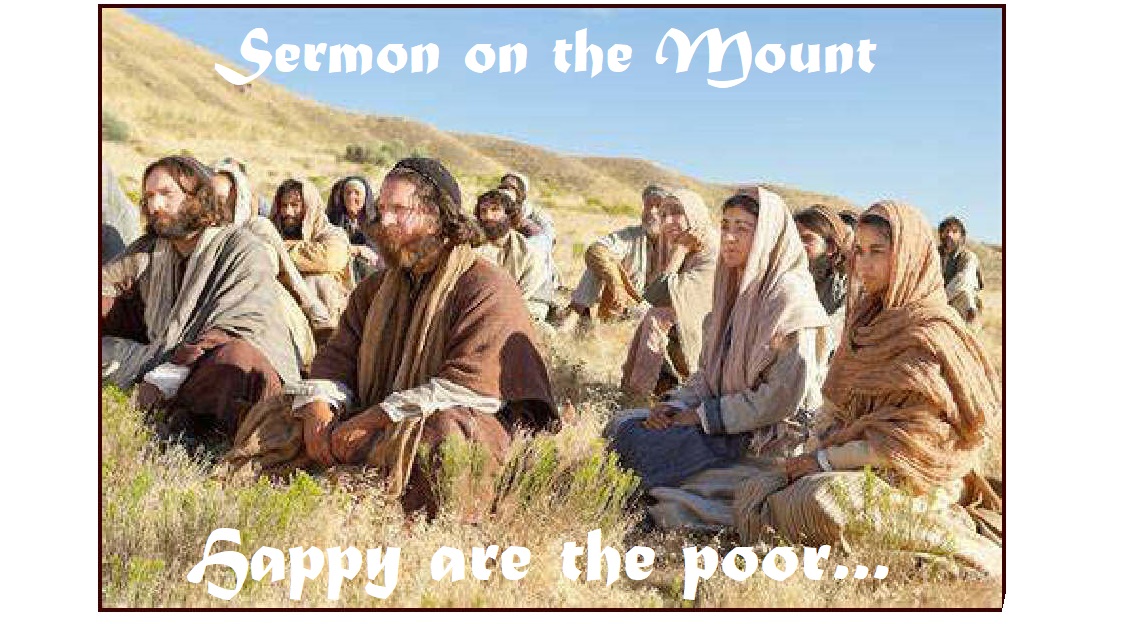
Happy are you
when you are poor, merciful, and peacemakers
The beatitudes give us a recipe for happiness in the kingdom of God, a kind of happiness very different from that of the secular world. Everybody wants to be rich, powerful, and famous. Wealth and power can bring much material satisfaction by eliminating ignorance, poverty, and inequality, but the Kingdom of Jesus is not of this world.
"Blessed are the poor in spirit, for theirs is the kingdom of heaven." Throughout the bible we read that God saves the poor from despair by giving them faith and hope. Religion does not eliminate poverty, but it gives inner strength to bear it and the imagination to overcome it. The poor in spirit are those who are grateful for what they have and what they are given, and this appreciation gives happiness. And when we are happy with what we have, we can outperform those who are rich and powerful, and often full of pride.
"Blessed are the merciful, for they will be shown mercy." One of our greatest wishes is to find acceptance and approval. One of our greatest fears is condemnation and shame. On Judgement Day, the merciful will be shown mercy, acceptance, and approval, for they will be told, "Come you who are blessed by my Father. Inherit the kingdom prepared for you from the foundation of the world." The merciful have shown mercy to the hungry, the thirsty, the strangers, and those in prison. Whenever we show mercy and kindness to the least deserving, we show mercy to Jesus in them.
Blessed are the peacemakers for they will inherit the earth. In Bethlehem, the angels sang, "Glory to God and peace on earth." But that peace did not last long. When Herod learned from the Magi that a new king was born, he became terrified in his lust for power, and he had all small children of Bethlehem executed. Th lust for power is the source of conflict and war. "Peace, I leave with you; my peace I give you. I do not give to you as the world gives. Do not let your hearts be troubled and do not be afraid." Blessed are those who bring the peace of Christ to family, neighborhood, and place of work. "
We can sing with the pilgrims of Taizé, Da pacem cordium, bring peace to our hearts. (Skip Ads: turn off the sound)
January 22, 2023. Mt 4:18-23
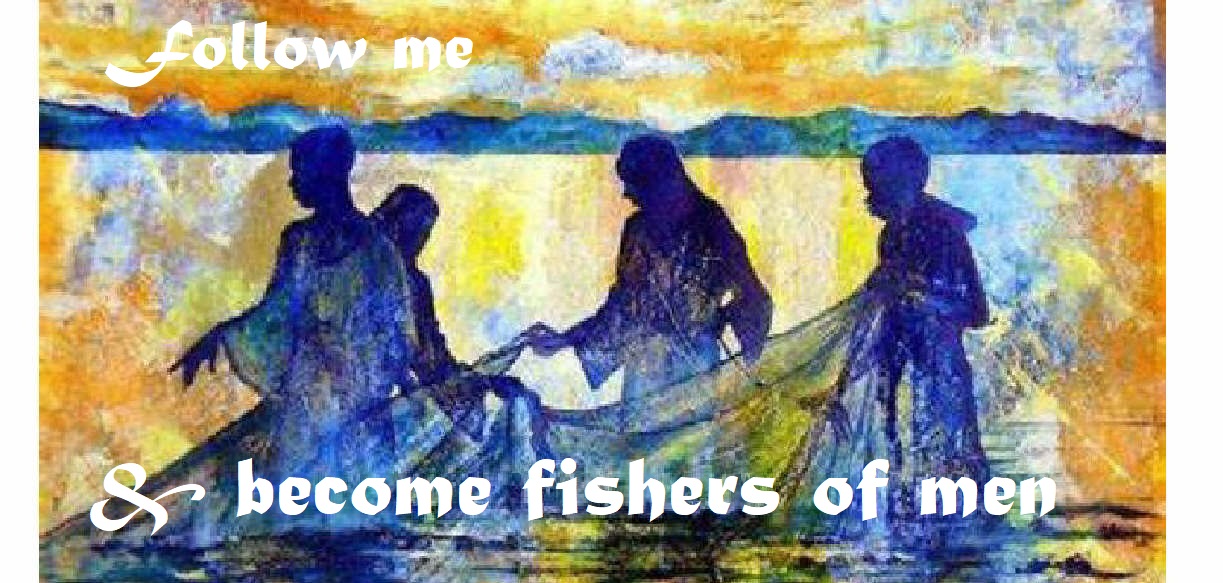
By following Christ we become fishers of men
"Follow me" is the invitation to become a disciple of Jesus Christ and to live in his companionship in whatever we do. We know that he is with us to the end of time. We may often have difficulty sensing his presence; at times we feel he is absent; in extreme cases, we feel that God has abandoned us. But as the sun is still shining behind the clouds, we know that he is present at all times.
"Rejoice always. Pray at all times." Rejoicing about God's gifts in everyday life is an easy form of prayer, and praying brings inner joy. In our busy lives, it is necessary to have oases of silence and relaxation. It is necessary to work with all the resources of our minds and will, but then work can turn into activism. Then our lives are like those of robots reacting on "automatic pilot." It helps to take a short moment of meditation in the morning and at night a short time of re-collection, of re-centering our minds on the essential. "Follow me aways. Rejoice always. Prays always." This should be our motto.
Only God can change people's minds and he does it through the examples of others. The role of parents is not to lecture and preach morality, but to be an example. As children we absorb what we see at home. At school we absorb what we see there. We can reject the example of parents, but no amount of lecturing may have an effect. Christian life is not transmitted through lectures and sermons but examples. Tertullian in the third century described what he saw: "The blood of martyrs is seed of Christians." Examples are stronger than words.
"Ubi caritas and amor, Deus ibi est." Where there is love, there is God." God is in our examples of love; it is through our examples that we become fishers of men. Sing it along with the brothers of Taizé (Skip Ads: turn off the sound)
January 15, 2023. John 1:29-34
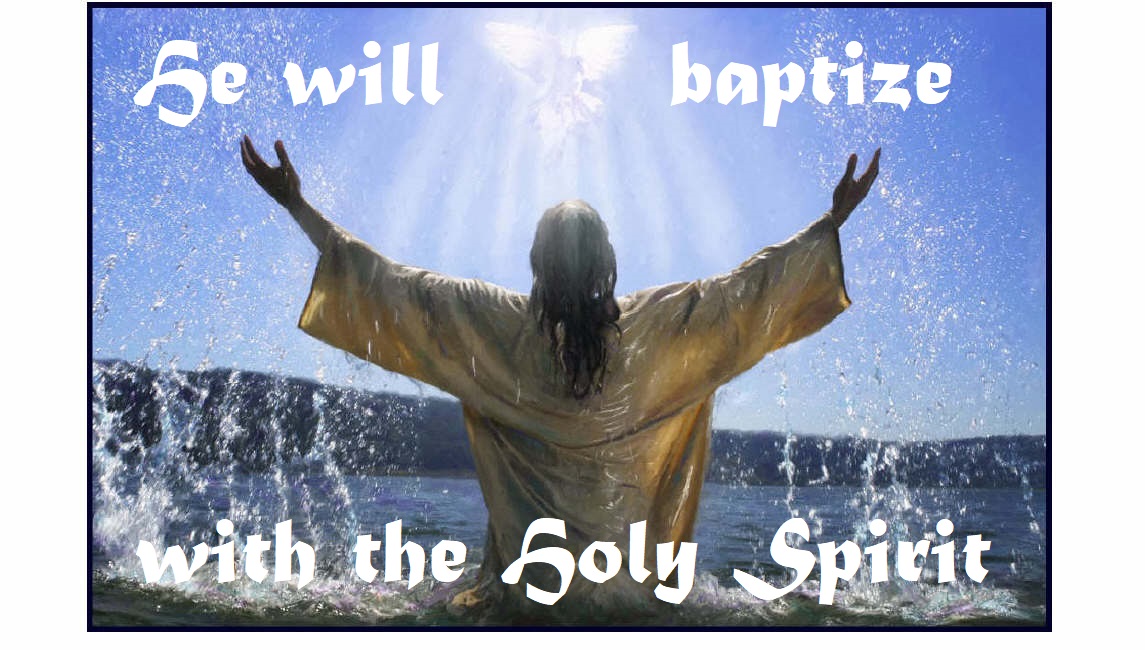
When will I be baptized with the Holy Spirit?
Baptism with the Holy Spirit happens in many ways and stages. The apostles who followed Jesus for three years did not get it; at one point they wanted to quit. "This teaching is too hard, the Jews said, who can accept it?" Many of his disciples turned away. On the eve of Jesus' passion, all of them ran away. It is only after the resurrection that their minds slowly opened. On the road to Emmaus, the two travelers expressed their disbelief, "We were hoping that he would redeem Israel," but that hope had been dashed. "Some women went to the tomb this morning and did not find his body; they had seen angels who announced that he was alive," but they did not believe it. When all ten apostles told Thomas that they had seen and touched the Lord, he refused to believe. We are all like Thomas and the travelers to Emmaus: even if angels announce that he is alive and all the witnesses of Jesus' appearance say that he is alive, we may say, "Unless I see it myself, I won't believe it!"
"Oh, how foolish you are! How slow is your heart to believe," said Jesus to the Emmaus travelers. Beginning with Moses and the prophets, he interpreted scripture for them, and "their eyes were opened." When Jesus appeared to the apostles who were amazed yet incredulous, he said, "These are my words that I spoke to you while I was with you," but you did not understand them. "Then he opened their minds to understand the scriptures," and slowly they began to understand and believe.
Understanding is a slow process, the understanding of math and science and also of the word of God. It requires work and patience. Looking back at your life, you may see several small steps towards a better understanding, in religious education classes, a great sermon, a retreat, or a special event like marriage or a death in the family. The secret to understanding God's word is reading it regularly. By doing so, we become progressively baptized with the Holy Spirit.
January 8, 2023. Matthew 2:1-12
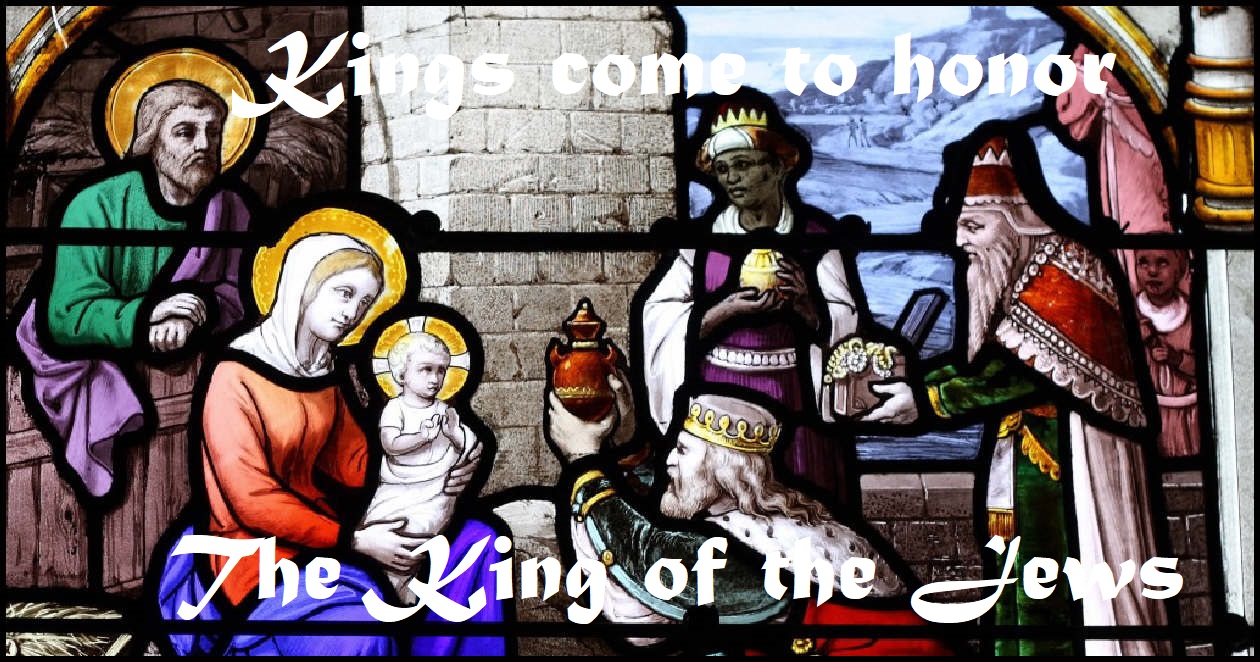
Foreign kings inaugurate Christ's kingdom
What is this kingdom? St. Paul's explains it in his letter to the Colossians. The infant Jesus of Bethlehem "is the image of the invisible God, the firstborn of all creation. For in him were created all things in heaven and on earth." This is also what we read in John's Prologue: "In the beginning was the Word, and he Word was with God, and the Word was God. All things came to be through him." This is what the Magi recognized implicitly when they prostrated themselves before the child and did him homage: Jesus is the image of the invisible kingdom to come.
What is the grand future of Christ's kingdom? "He is the firstborn from the dead, so that in him all things might be preeminent, in order to reconcile all things though him by the blood of the cross." The kingdom of heaven came into existence only after the death on the cross and the resurrection; without resurrection of all living things there can be no kingdom of Christ. This is a kingdom of peace, on both heaven and the earth. We are called to reflect that peace to others.
This kingdom of peace and reconciliation is celebrated every Sunday ritually and symbolically. A high point of the Mass is the solemn proclamation of the priest, "Through him, with him, and in him in the unity of the Holy Spirit, all honor and glory is yours, Almighty Father, for ever and ever.” With these solemn words, the priest ends the eucharistic prayer at the center of which is the mysterious event of the consecration.
You may like to listen to the Triple Amen after the consecration:
in an
English translation with subtitles,
or in Latin,
or watch the Aramaic singing of the Our Father in Georgia
during the Pope's visit.
January 1, 2023. Luke 2: 16-21
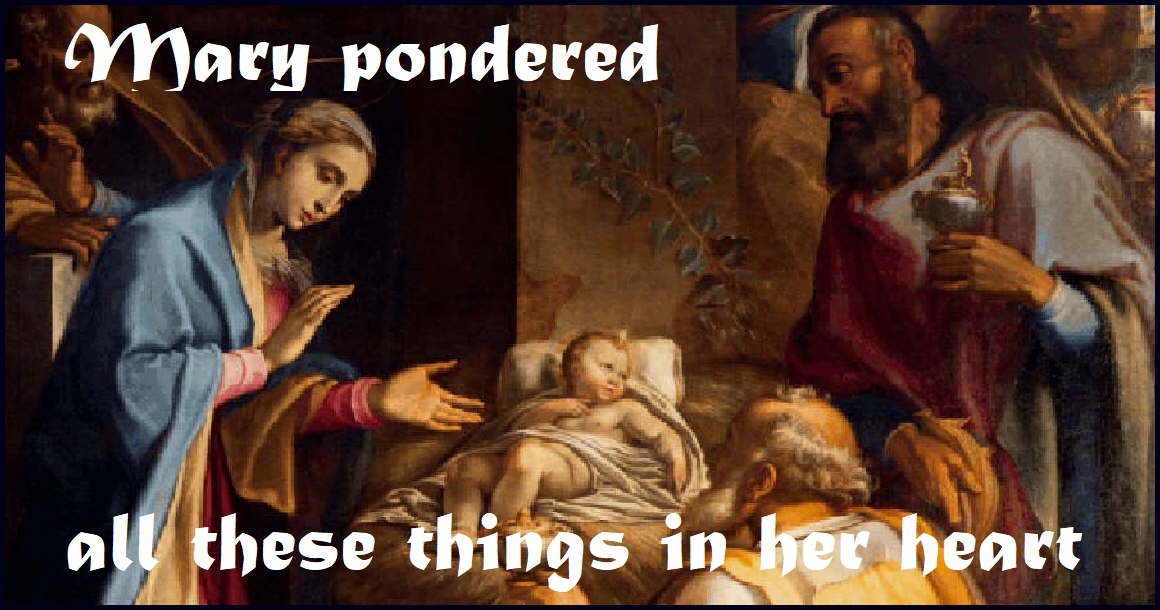
Like Mary, our faith is based on pondering in our hearts
Mary had a lot of things to ponder. First, the unexpected Annunciation. An angel of the Lord said to her, "Hail Mary! The Lord is with you." Anyone would be troubled by such a greeting. "Behold, you will conceive and bear a son, and you will call him Jesus." This is troubling, but more troubling is the promise "The Lord God will the throne of David his father, and his kingdom will have no end." "How is this possible, since I know no man?" The angel offered no answer, just "Nothing is impossible for God." Who can be ready for the impossible? The angel left Mary to ponder by herself what all this meant.
At the birth of Jesus, there was no room for them in the inn; they had to take refuge in an animal shelter. Nothing is impossible to God? The Son of God lying in a manger? Then came shepherds because an angel had told them that a savior was born in the city of David. They saw nothing wrong with a savior laying in a manger in an animal shelter. Now the impossible had become quite ordinary. Then came Magi from the Orient, guided by a star. They brought the treasures of gold, frank incense, and myrrh. Now the impossible had become quite unbelievable. What followed was most shocking, "Raise, take the child and his mother, and flee to Egypt," for Herold wanted to kill him. Mary pondered all these things in her heart. Nothing is impossible to God, but God's thoughts are not our thoughts, and his ways are not our ways.
An adult faith is based on trust and questioning. There is no faith without doubt, but doubts must be enlightened by faith and reason. Today many Christians question some basic religious doctrines. Questioning is healthy but to remain stubborn in one's doubts is not. All people, especially the great saints, go through stages of darkness. Thérèse de Lisieux doubted the existence of God at the end of her life. Mother Teresa spent years in spiritual darkness, feeling abandoned by God. In the desert Jesus was tempted by doubts, "If you are the Son of God, change stones into bread." And on the cross, "If you are the Son of God, come down!" An adult faith involves temptations and doubts. Like Mary, we must base our faith is based on pondering and trust.
December 25, 2022. Mt 1:18-24
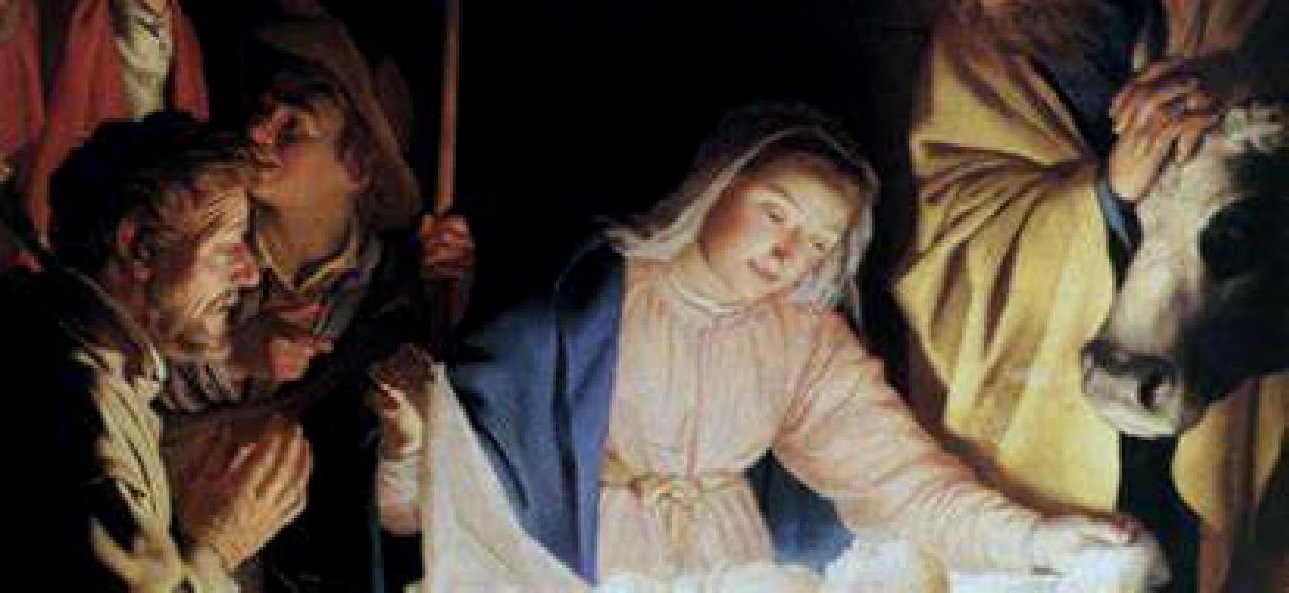
"Today Christ our Lord is born in Bethlehem, Alleluia!"

"Today Christ our Lord is born in Bethlehem, Alleluia!"
"The people who walked in darkness
have seen a great light.
For a child is born to us, a son is given us;
upon his shoulder dominion rests.
They name him Wonder-Counselor, God-Hero,
Father-Forever, Prince of Peace." (Isaiah 9:1,5)
"Today in the city of David
a savior has been born for you who is Christ and Lord.
And this will be a sign for you :
you will find an infant wrapped in swaddling clothes and lying in a manger.
And suddenly there was a multitude of angels,
praising God and saying:
Glory to God in the highest
and peace on earth to those on whom his favor rests.”
(Luke 2:11-14)
“Comfort, comfort my people, says your God.
Speak tenderly to Jerusalem, and proclaim to her
that her forced labor has been completed;
her iniquity has been pardoned."
(Isaiah 40:1-2)
"In the beginning was the Word,
and the Word was with God, and the Word was God.
The Word became flesh
and he made his dwelling among us." (John 1:1, 14)
December 18, 2022. Mt 1:18-24
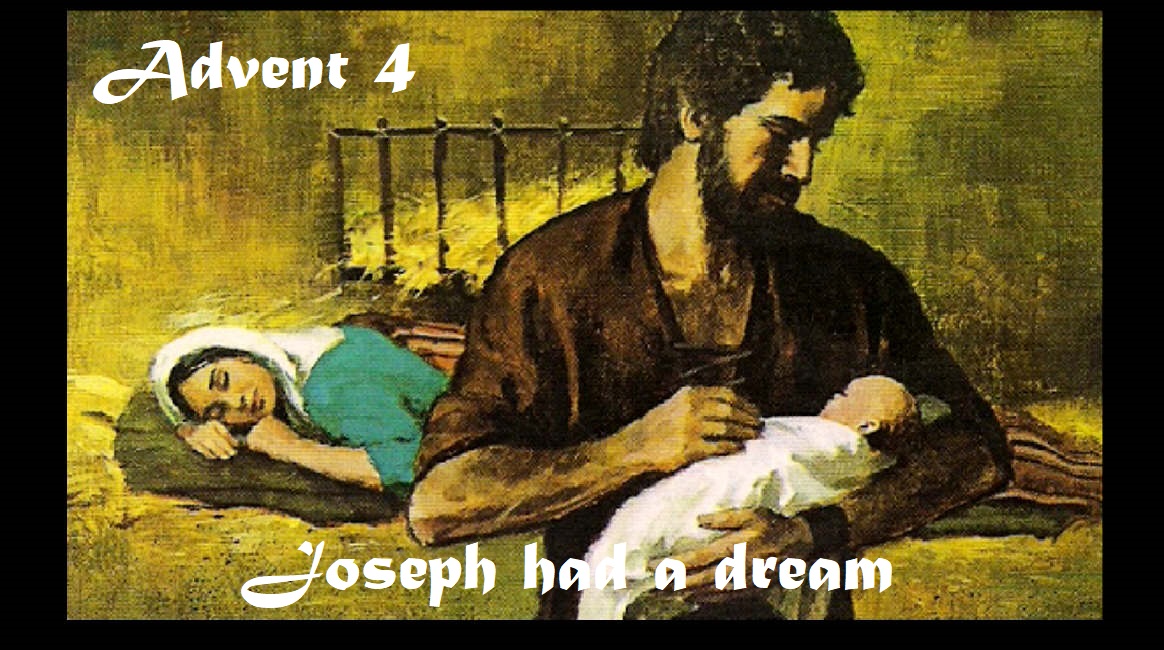
"Do not be afraid to take Mary into your home"

"Do not be afraid to take Mary into your home"
In Joseph's dream, the angel of the Lord explained, "She will bear a son and you are to name him Jesus, because he will save his people from their sins." This is not much of an explanation, especially if given in a dream. Joseph had little choice: abandon Mary who was with child or trust the angel and the dream. Because Joseph was a righteous man, he complied. But he did not know what he was getting into.
Six months later, another dream. "Rise, take the child and his mother, and flee to Egypt, because Herold is going to search for the child and destroy him." Again, little choice. This time it was worse: he had to escape by night and go into exile as a refugee without resources. This was his unexpected new responsibility as a father, something he never dreamed of.
We only know that Joseph was a righteous man, somebody who always does the right thing. Men and women have different roles in the family, depending on their culture. Husbands are usually expected to do long-range planning, providing food and resources for the present and the future. They are also expected to do the heavy load jobs around the house. Increasingly, husbands are expected to help more at home, even to take care of the baby when needed. Joseph did probably all of this, as shown in the above picture. He can be our role model and intercessor.
Events may conflict with our dreams as it did for Joseph. It may be a change in the family situation, or a problem with health or money. Then all we can do is to be righteous in this new situation. Many people in the world do not have the opportunity to have dreams about their future due to poverty or the country's economic situation. Then Joseph can be the intercessor and a model of righteousness.
December 11, 2022. Mt 11:2-11
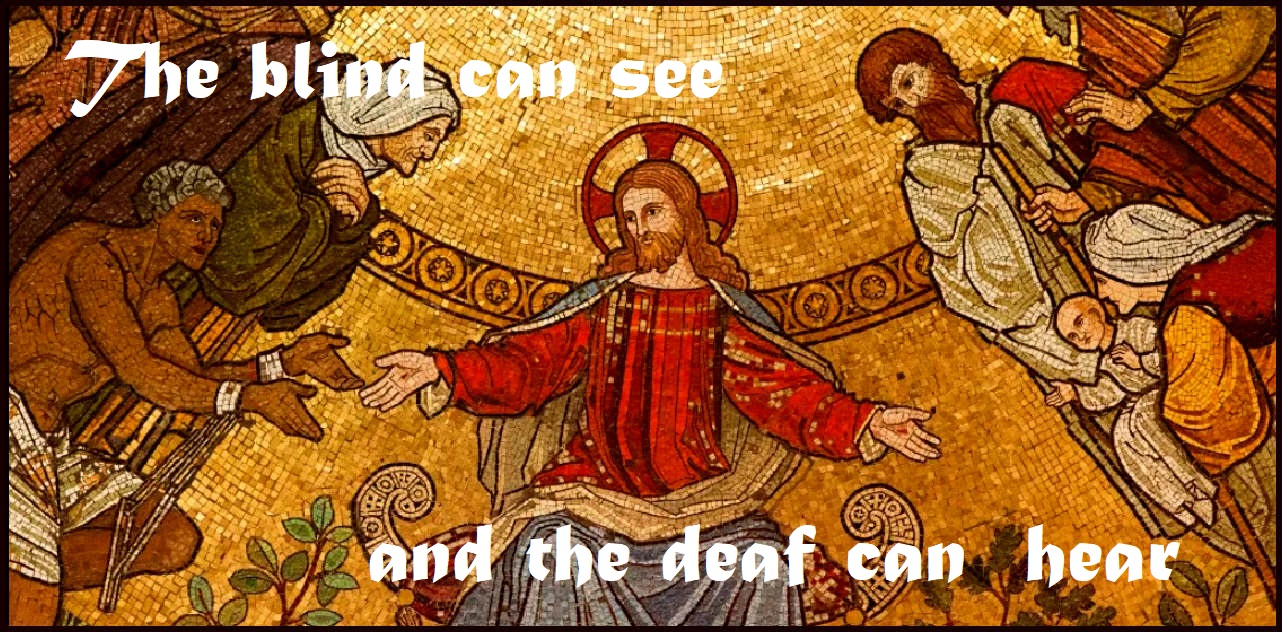
As foretold by Isaiah:
the Messiah will heal all people

As foretold by Isaiah:
the Messiah will heal all people
To the Baptist's question, "Are you the one to come?" Jesus replied: "The blind can see, the deaf can hear, and the Good News is preached to the poor." The kingdom of God is coming. There will be a new creation, a new heaven, and a new earth.
Jesus has healed a few hundred people, and then he left for heaven. Since then, miraculous healings have been rare but not unheard of. There are enough miracles to keep up our faith, but not so many that we become overconfident. The same is probably true in the lives of most people: they can see the blessings of God in special circumstances, but in everyday life, they must live by faith.
The most precious gift of faith is hope. Abraham was promised a descendance as numerous as the stars in the sky, but he had no son. On Mount Sinai God made a covenant with Israel, but in 587 Jerusalem was conquered and its inhabitants deported to Babylon. There Isaiah proclaimed, "A voice in the wilderness is calling: Prepare the way for the Lord." He will send a messenger to prepare his ways. And then, nothing happened for more than 500 years. Nothing but hope.
Jesus promised to return. The first Christians expected it to happen in their lifetime. They lived in hope and expectations. So do we. The Kingdom of God is coming. We celebrate it at Christmas. We must live by faith and hope.
December 4, 2022. Mt 3:1-12
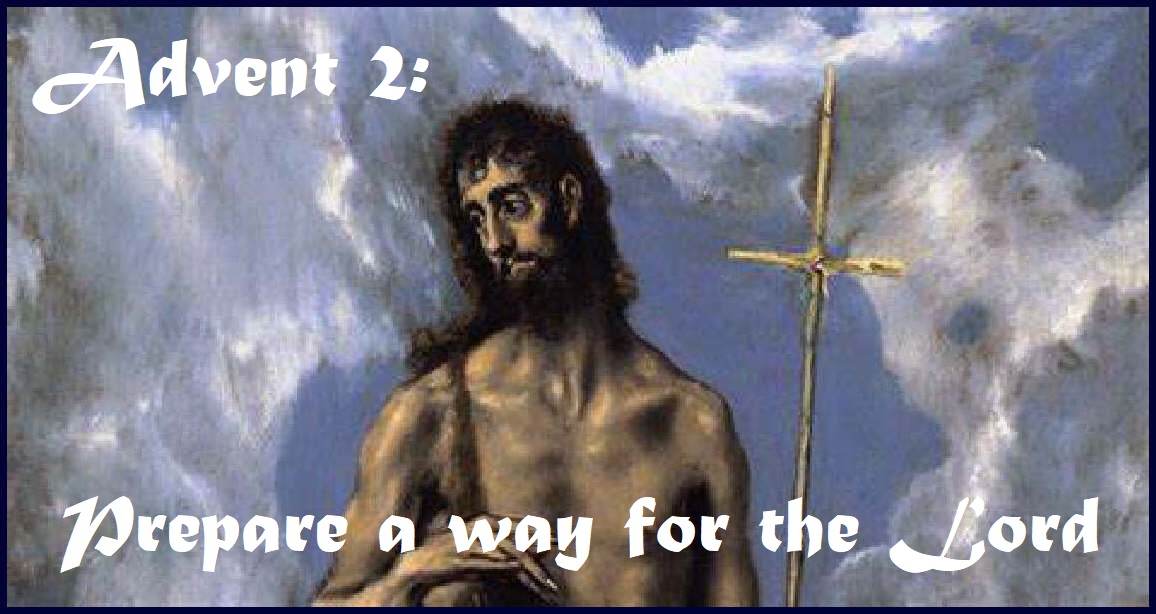
"The Kingdom of God is near"

"The Kingdom of God is near"
In those days, John the Baptist came out of nowhere proclaiming, "Repent! The Kingdom of God is near." Nobody knew when and where the Messiah would come. Is he the messiah? A messiah in the desert? A Messiah dressed in camel's hair? Why did people come to see him? What did he offer: the immersion or baptism into the waters of the river Jordan? Repent from what? We have done nothing wrong!
John announced something totally new: a kingdom of heaven, not a kingdom on earth. He announced a world in which food, clothing, and a comfortable life in a nice home would not be important anymore. He announced a new heaven and a new world. When will it happen? He did not say. Every year we prepare for it through Advent and the celebration of Christmas for the Kingdom of God to come.
Conversion is turning away from habits that bring us down. Some people watch too much television or the cell phone. Some people are addicted to work, good food, alcohol, or drugs. Other people, waste their lives with no goals and no accomplishments. Conversion is also moving ahead to come closer to God through silence, reading good books, helping others, giving money to the poor. How much will we accomplish during Advent? Probably very little.
Because we can accomplish so little by ourselves, we can turn to the God of mercy and sing psalm 25:
of my youth,
but remember your compassion
and mercy, o Lord.
Let us sing Psalm 25: "To you, o Lord my God, I lift my soul" (with lyrics). Turn off the sound to avoid the ads at the beginning.
November 27, 2022 Mt 24:37-44
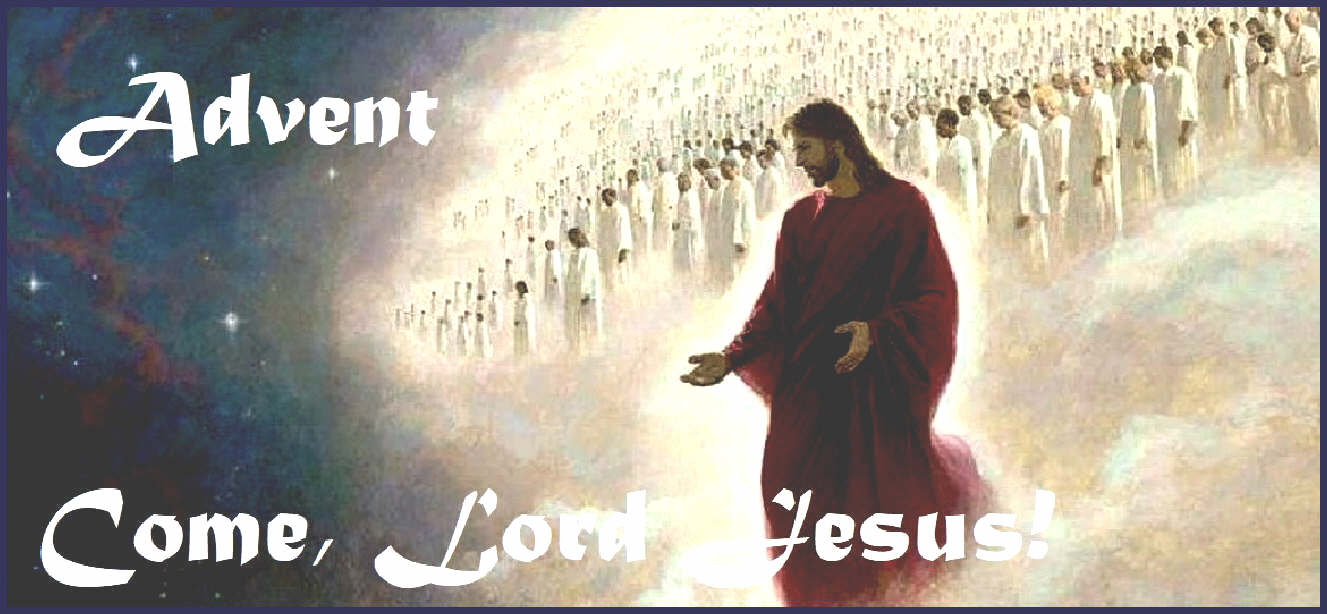
"Maranatha! O Lord, Come!"
This was the prayer of the first generation of Christians. They said it in Aramaic, the colloquial language of the Jews at the time of Jesus, to make this appeal more personal, more intimate, like a friend speaking to a friend. We will celebrate the birth of Jesus in four weeks; we want his coming to be close and personal.
In today's reading, St. Paul invites us to wake up. "Now is the time. Now is the hour to awaken from sleep. The night is advanced, the day is at hand. Let us throw off the works of darkness. Let us put on the armor of light." The Winter is coming. The days are getting shorter. Darkness is expanding. There can also be much darkness in our minds and souls. This darkness is the absence of the l light of God. Jesus is the eternal light of the world. This light shines in the darkness, and no darkness can darken it. To those who accept it, he has given the power to become children of God. Christmas is the day when the children of God celebrate the light made flesh, dwelling among us.
Advent the time of waiting and hoping. For centuries the Jews waited for the coming of the Messiah. During Advent we also long for the Messiah to come, as beautifully expressed in the famous 12 century Latin poem, O come, O come, Emmanuel (Sing along but Skip the Ads by turning off the sound when seeing the ads):
O come, O come, EmmanuelAnd ransom captive Israel
That mourns in lonely exile here
Until the Son of God appear
Rejoice! Rejoice! Emmanuel
Shall come to thee, O Israel.
O come, Thou Rod of Jesse, free
Thine own from Satan's tyranny
From depths of Hell Thy people save
And give them victory o'er the grave
Rejoice! Rejoice! Emmanuel
Shall come to thee, O Israel.
You may also like to listen and sing along Maranatha, Come, Lord Jesus!
November 20, 2022 Luke 23:35-43
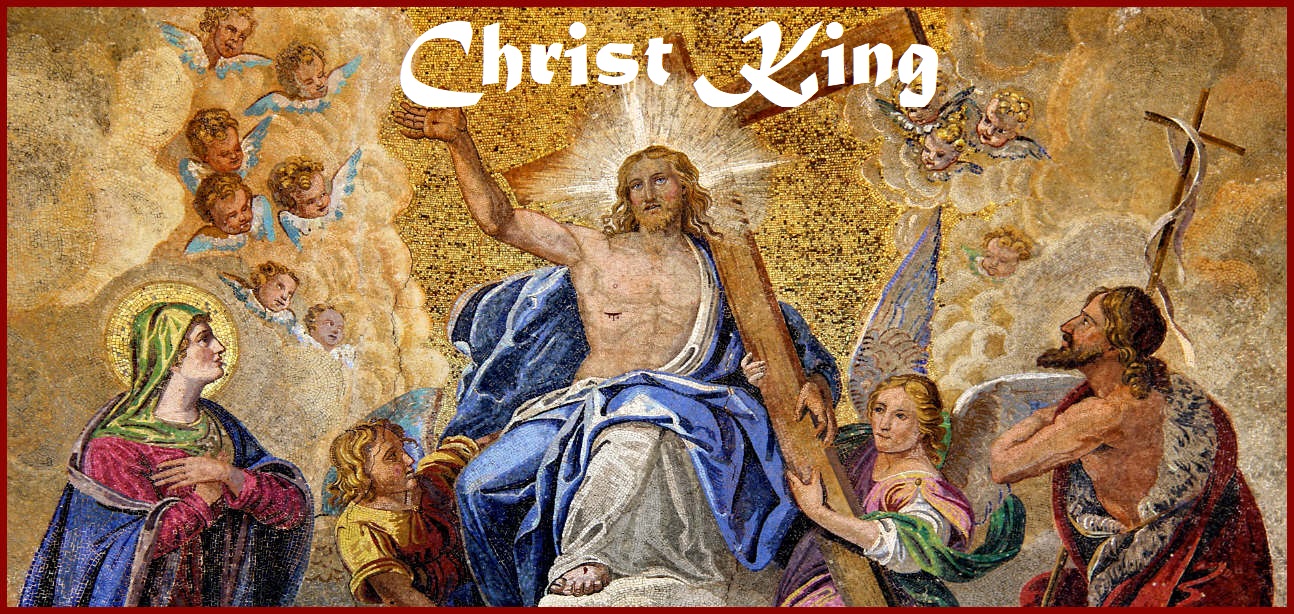
"By this sign you shall conquer!"
Before the battle of Battle of the Milvian Bridge in 312 AD, general Constantine had the vision of a cross covering the sun with the words, "By this sign, conquer!" In our battles we must also look at the cross to conquer. But these battles are not about material gains; they are battles to defeat the spirits of evil.
When Jesus was crucified, the rulers sneered at him saying, "He saved others, let him save himself." The soldiers jeered at him, "If you are King of the Jews, save yourself." And one of the criminals hanging there reviled Jesus, saying, "If you are the Christ, save yourself and us." In all ages, the spirit of evil leads rulers to despise their enemies, soldiers to mistreat their prisoners, and mobs to insult the downtrodden. It takes courage to disagree with the rulers of power and the soldiers of violence and ask, "Jesus, remember me when you come into your kingdom." It takes divine strength not to seek revenge against the injustice and say, "Father, forgive them for they do not know what they are doing." These are the battles we must win: not to join the crowd of even-doers, but offer forgiveness and seek reconciliation.
The Lamb of God has won the victory! Today is a time to celebrate. We can join the innumerable crowd in heaven that John, in the book of Revelation, saw in a vision at the end of time. "They stood before throne and the Lamb, wearing white robes and holding palm branches. They cried out in a loud voice:
to receive power and riches, wisdom and strength,
honor and glory and blessing."
Let us join our voices to theirs, to celebrate Christ King.
November 13, 2022 Luke 21:5-19
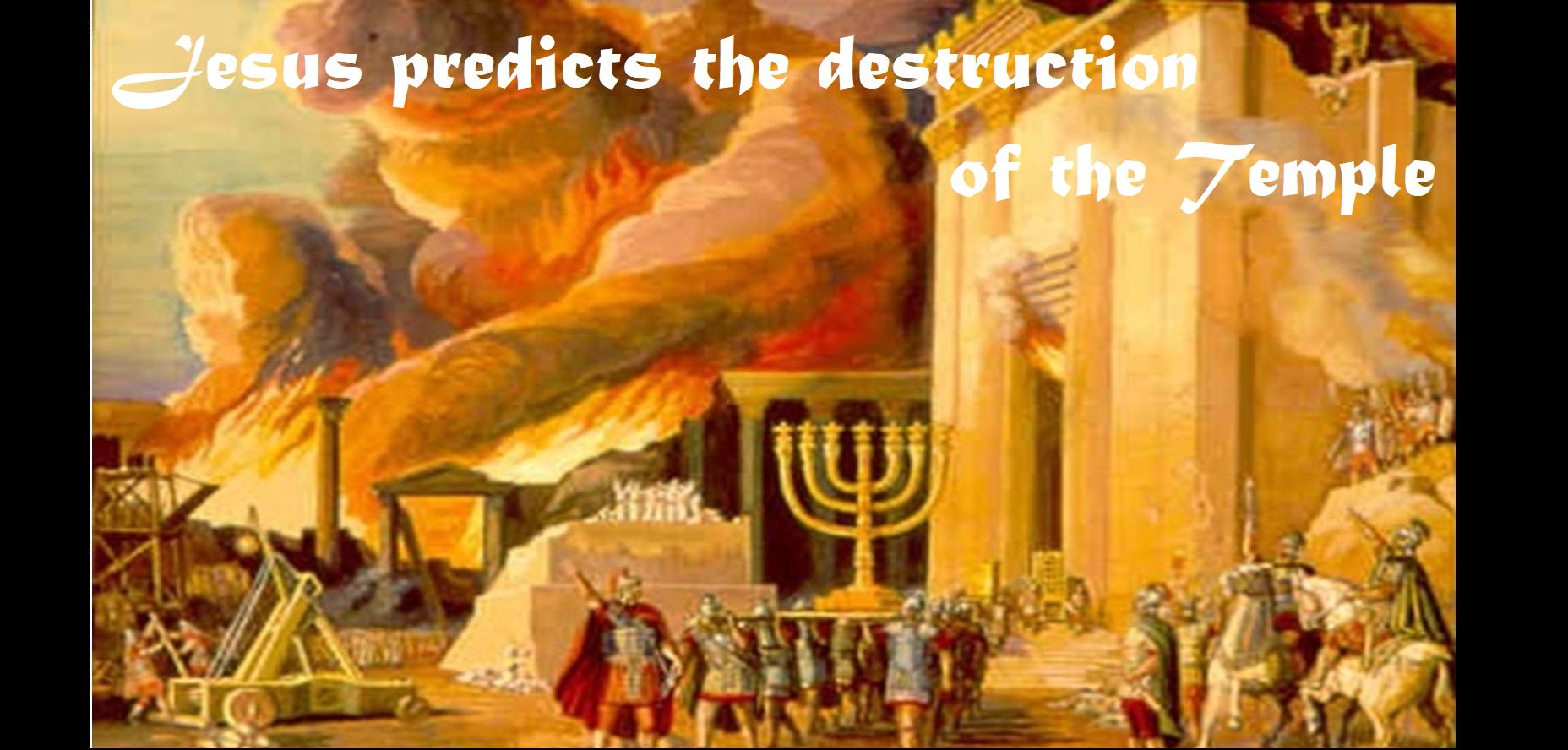
Don't be afraid:
"Not a hair on your head will be destroyed"
The destruction Jerusalem happened in 70 AD, as a consequence as a civil war between two Jewish factions. One group, called the Sicarii because they carried a dagger (or sicae) under their cloaks, would cut the throats of Roman collaborators and disappear in the crowd. They attacked and conquered Jerusalem in 66 AD, and eliminated their opponents. As the Romans came back to lay siege on the city, a civil war erupted inside, each group attacking the other and destroying each other's food reserves. Jerusalem collapsed within. According to Josephus (first century historian), over a million people perished. The religious terrorists who initiated the civil war punished themselves and destroyed Judaism.
The destruction of Jerusalem has often been presented as the punishment of the Jews for killing the Son of God. This is false. God does not punish the sinners -- not in this world. We like to see God as the avenger of all the evils of the world. Like the Jews expecting a conquering messiah, we want God to destroy our enemies. When afflicted by an injustice, we want justice be done, and that the perpetrators of the injustice be punished; we may even expect God to be our avenger.
When the messengers of Jesus arrived in a Samaritan village to prepare for his arrival, there were not welcome. In indignation they exclaimed, “Lord, do you want us to command fire to come down from heaven and consume them, just as Elijah did?” (Luke 9:55). This is what Elijah did when fifty men came to arrest him: the fire of heaven consumed them all. This is what disciples of Jesus wanted to do, but Jesus rebuked them and said, “You do not know what kind of spirit you are. The Son of man is not come to destroy men's lives, but to save them." God wants to save sinners, the perpetrators of injustices, not to destroy them.
In reference to the destruction of Jerusalem, Jesus warned them to run away: "flee to the mountains; do not enter the city." It is likely that the first Christians fled Jerusalem when they saw the great disturbances going on. "If the master of the house had known the hour when the thief was coming, he would not have let his house be broken into." Be prepared, for we do not know the hour of coming disasters. Listen to the warnings -- about a coming tsunami, a tropical storm, or a volcanic eruption. Watch and pray, not to be taken by surprise. Don't be afraid: not a hair on your head will be dstroyed without God's consent.
November 1, 2022 Mt: 5-12
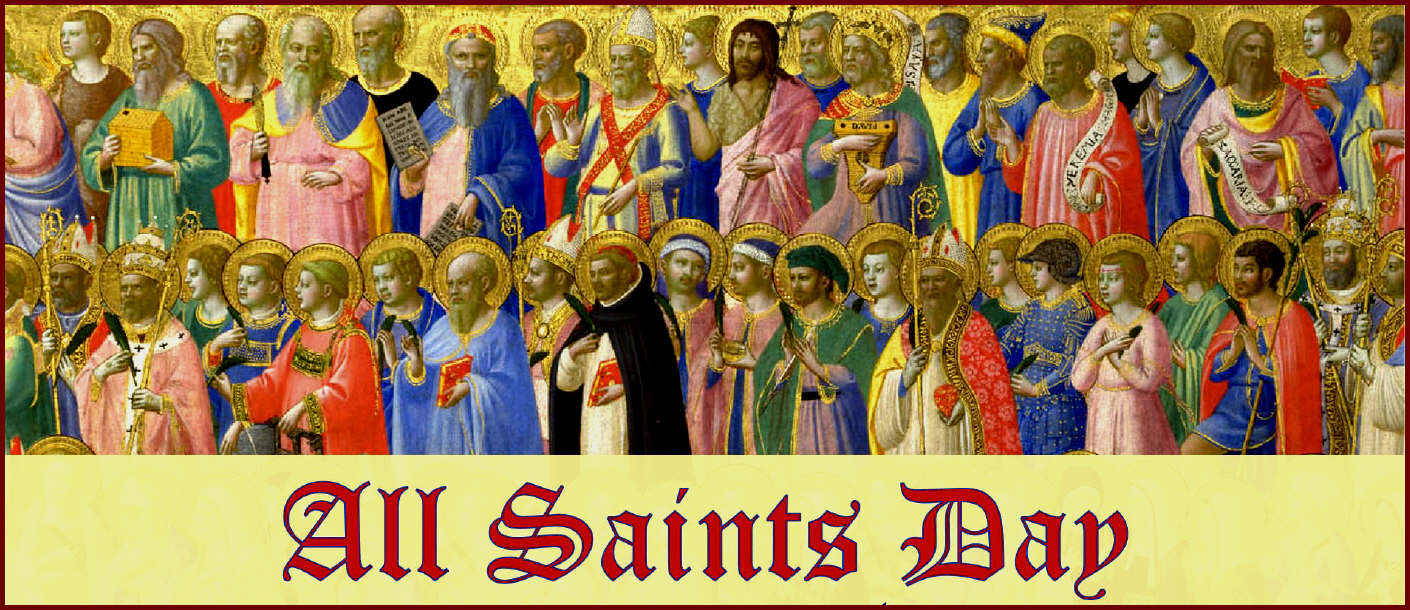
The saints are those practicing the Beatitudes
"Happy the pure in heart because they will see God." This is the meaning of All Saints Day: the pure in heart, alive or dead, great saints or humble souls, will see God because their hearts have been purified. In the picture above we see Jesus in the center in the top row, with the prophets on his left and the apostles on his right, and underneath, popes, bishops, and priests on one side, and ordinary people with various bonnets on the other.
"Blessed are the poor in spirit for theirs is the kingdom of heaven." The poor in spirit are those who have no heavy baggage that holds them down. The richer we are, the more things we have to take care of. To be rich and also poor in the spirit means not to be possessed by one's possessions. We can achieve this by having quiet time, reflection and meditation time. By beginning or ending the day in prayer we put a barrier between worldly necessities and spiritual needs. Then we can turn all things into serving the kingdom of heaven.
"Happy are the meek, (the gentle, the peaceful, the humble), because they will inherit the word." The proud, the arrogant, the war lovers may conquer the world by force, but the meek will be given universal acceptance although they do not ask for it. When people are kind and modest, we feel invited to freely imitate them while power and arrogance create distance. Meekness is the love of grandparents or friends who do not want to impose themselves. Meekness creates at atmosphere of peace which can spread throughout the world.
"Blessed are the peacemakers for they will be called children of God." The peacemakers are those who actively work for peace in situations of conflict. When two people fight, it is better not to intervene because then they turn against you. Peacemakers are those who can separate opposite camps and lead them to reconciliation. Peacemakers must be meek and gentle, poor in spirit without prejudices, and pure in heart who do not take sides.
The saints are the pure in heart, the poor in spirit, the peek, and the peacemakers, because they are the true children of God.
October 30, 2022. Luke 19:1-9
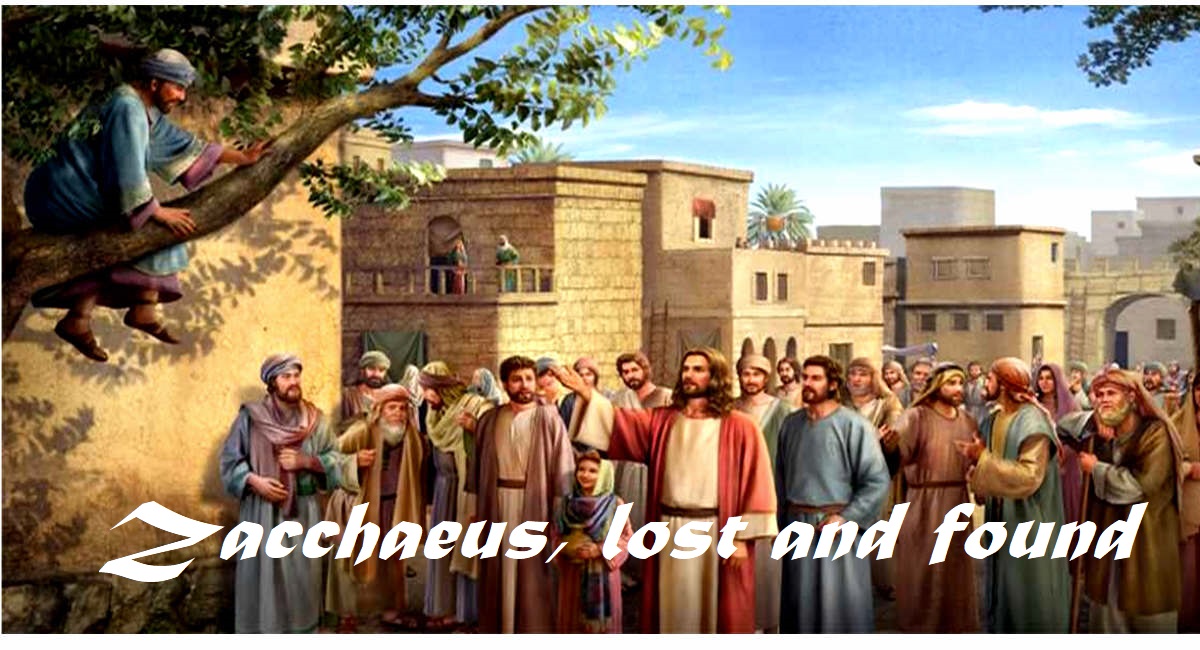
"The Son of Man has come to seek
and save what was lost."
"If a man has a hundred sheep and one of them gets lost, what will he do? He will leave the ninety-nine and search for the one that is lost until he finds it." This is the image of the Son of God who called himself the Good Shepherd to seek what was lost. It is obvious in the case of Zacchaeus: "Come down quickly, because today I must stay at your house." Zacchaeus was lost, but now he is found: "Lord, I will give half my possessions to the poor, and repay four times those I have exploited."
There is not much evidence that God is seeking those who are lost. We all know many lost people, and nothing makes them change their lives. Some people seem to be lost forever without remorse or regrets. But maybe they were called, but refused to listen. We also know many lost people who refuse to listen to a good advice.
Most of us were lost and have been found. I have made quite a few mistakes, but was found before it was too late. There is no limits to God's mercy. We should forgive others not just seven times but seventy times seven. There are many death-bed conversions; even at one's last breath, one can turn to God for mercy, and it will be heard.
John Newton has been a slave trader, often involved in all kinds of debauchery. He himself had been treated like a slave and put in chains three times for serious misbehavior. When his ship was caught in a violent storm after drifting at sea for a month, he prayed for the first time, fearing for his life. His prayer was answered, but that was only a temporary conversion. Newton went back to the slave trade for several years. But God is patient in seeking what is lost. Finally, John Newton found the Lord. He is known all over the world for his popular song, "Amazing grace."
I once was lost, but now am found, Was blind, but now I see.
October 23 Luke 18:9-14
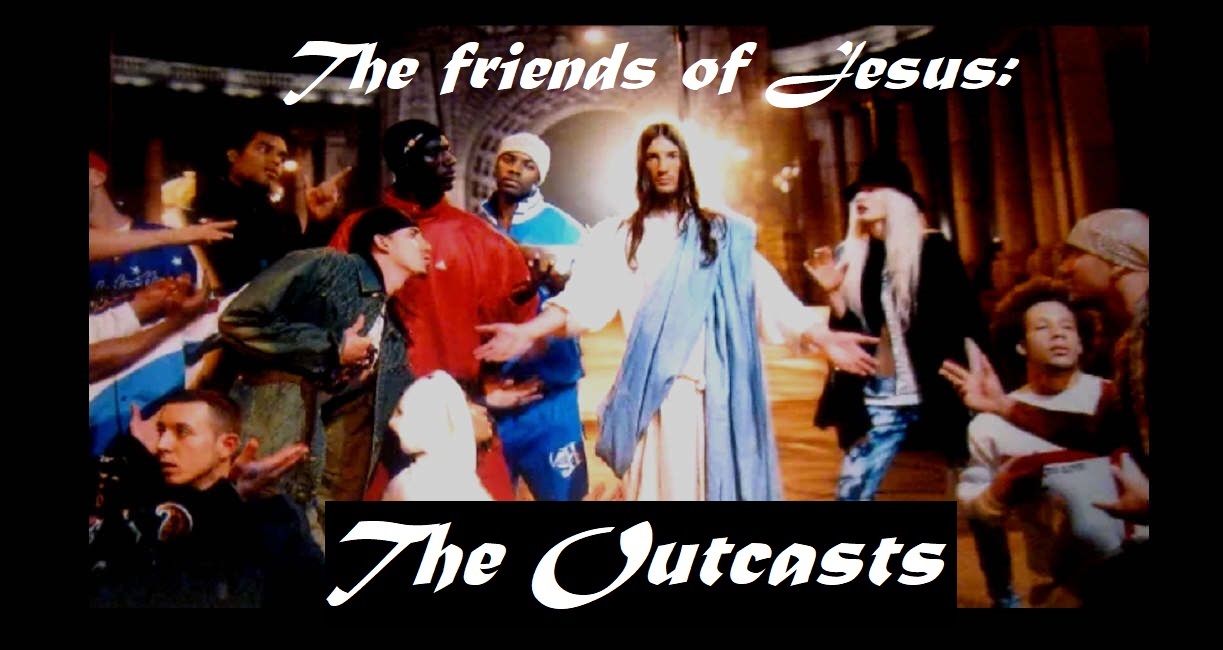

The prayers of the Pharisee
and the tax collector
The pharisee prayed, "I give you thanks, O God, because I am not like the other people. I pray every day." The tax collector humbly confessed, "O God, have mercy on me, a sinner." Many people may pray like the Pharisee, "God, I am fine. I do not need you now. I will call you later when I need you."
The first reading today justified the prayer of the tax collector: "The prayer of the lowly pierces the clouds; it does not rest till it reaches its goal, nor will it withdraw till the Most High responds, and the Lord will not delay." The prayer of the tax collector pierces the clouds! And more generally: "The Lord hears the cry of the oppressed. He is not deaf to the wail of the orphan, nor to the widow when she pours out her complaint. "
Elsewhere Ben Sirach wrote, "The tears of the widow come down on God's cheeks." Can God be more human than that? Jesus shed tears for his friend, Lazarus. Later he wept for the glorious city of Jerusalem. "O Jerusalem. How often I wanted to gather your children together, as a hen gathers her brood under her wings, but you were not willing! " (Luke: 13:34). To all the outcasts of the world who are the friends of Jesus, God speaks with motherly tenderness.
In his last letter to Timothy in today's reading, Paul looks back at his life, now that "the time of my departure is at hand. I have competed well; I have finished the race; I have kept the faith. " But there have been many trials. In the many violent outbursts against him, "no one appeared on my behalf, and everyone deserted me. But the Lord stood by me and gave me strength." We can all say with the tax collector, "O God, have mercy on me, a sinner," but also with Paul: "I can do anything in him who fortifies me!"
October 16, 2022. Luke 18:1-8
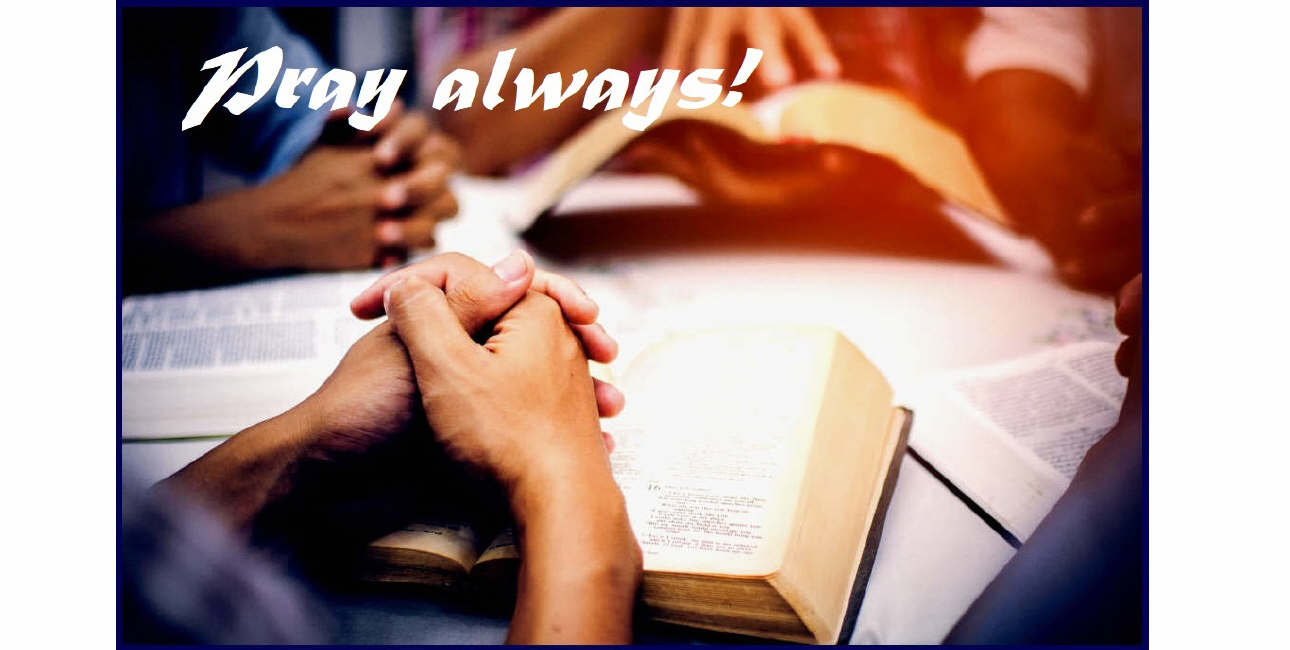
"Pray in the Spirit at all times"
"Do not be anxious about anything, but in everything by prayer and supplication with thanksgiving let your requests be made known to God. " (Eph 4:6 ). By making our requests known to God, we stop being anxious because prayer is less a request for help than an expression of faith that God hear our prayers.
Prayer is our internal dialogue with God through requests and thanksgiving. We do not need to recite vocal prayers. We do not need specific prayer times, like going to church or reciting the rosary. Prayer is life in the Spirit which can happen at all times, day and night. Such a prayer life, however, comes only after years of vocal prayer, usually a few times a week or a day.
St. Paul usually begins his letters with words of praise and thanksgiving for the good deeds of his congregations. "I give thanks to my God always on your account for the grace of God bestowed on you in Jesus Christ. I him you were enriched in every way, with all discourse and all knowledge." With these words he began his letter to the Corinthians which also contains severe criticisms: there were rivalries among them, a case of sexual immorality not found among the pagans, disputes in secular courts against other members of the church, and great social inequalityat their Sunday meeting. Any criticism should also recognize the good in others. Even in the midst of great trouble and turmoil, we should give thanks to God for the good things we have received and the good in others.
Through supplication and thanksgiving, we are given "the peace of God, which surpasses all understanding." Inner peace is the greatest gift that all believers and unbelievers need most. It is the peace of mind that allows us not only to endure the strorms of life and even to thrive in difficulties. In Our Father we pray, "Deliver us from evil," but when evil surrounds us, it is inner peace that we need. "Peace be with you" was the first word of Jesus to the apostles terrified after the crucifixion. Through prayer, "the peace of God, which surpasses all understanding, will guard your hearts and your minds in Christ Jesus." Amen!
October 9 Luke 17:11-19
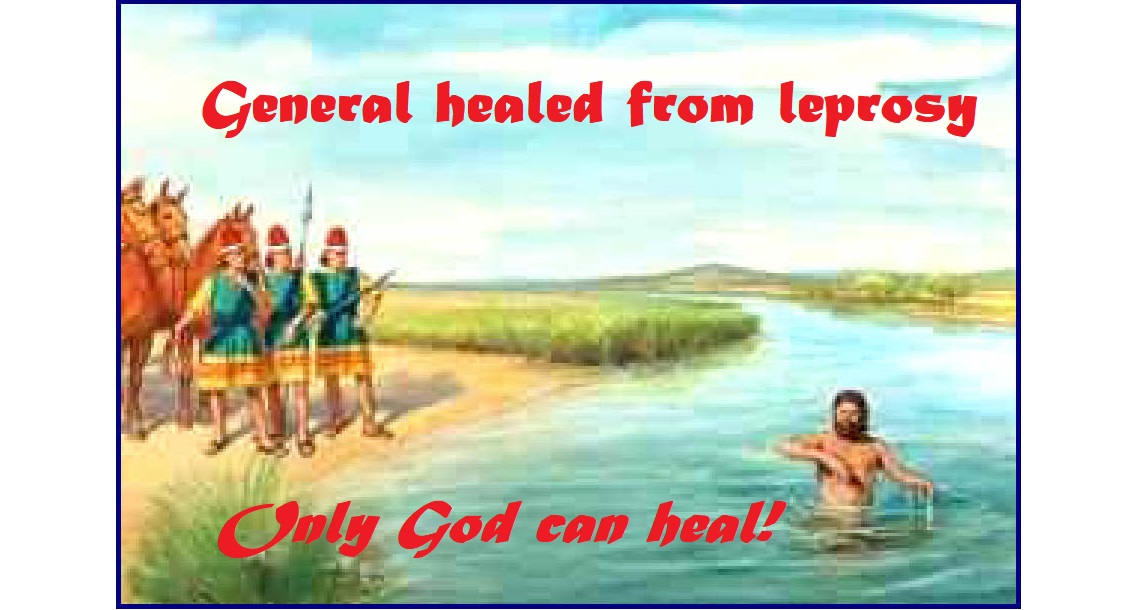
"Your faith has healed you"
Ten lepers came to Jesus. He told them to go the the local priest. On the way they were all healed. Their faith saved them. Only one came back to give thanks, but all were healed by the power of God.
In the first reading of today, the Syrian general Naaman was cured from leprosy by plunging seven times in the river Jordan. He came back to prophet Elisha with plenty of gifts but the prophet refused them: give thanks only to God, not to his instrunent. It is not the word of Elisha or the water of the Jordan that cured Naaman but the power of God. The Syrian general was ready to do something difficult to deserve God's favor. "No, I will not bathe in the Jordan. In Syria we have better rivers." Trusting in God is often more difficult than acts of courage.
A great calamity struck Job, a rich man with many children and a great heard of sheep and camels. One day a razzia, a violent storn, and an invasion of Chardeans destroyed all he had. Then Job prayed: "Naked I cam forth from my mother's womb, and naked shall I return. The Lord gave and the Lord has taken away; blessed be the name of the Lord." This is true of all possessions and all the relationships: the Lord gave and the Lord can take away. The opposite may also happen: the Lord inflicted me with leprosy, or cancer, or a great disaster. Only God can heal and restore. Only faith can makes us whole again. In all cases we can say, "Blessed be the name of the Lord!."
More generally, we may follow St. Paul's advice, "Whatever you do, whether in word or deed, do it all in the name of the Lord Jesus, giving thanks to God the Father through him." (Colossians 3:17) This is easier than bathing seven times in a river. We can offer our day to God in the morning, thank him in the evening, and throughout the day do all things inspired by the examples of our Lord Jesus.
October 2, 2022. Luke 17:5-10
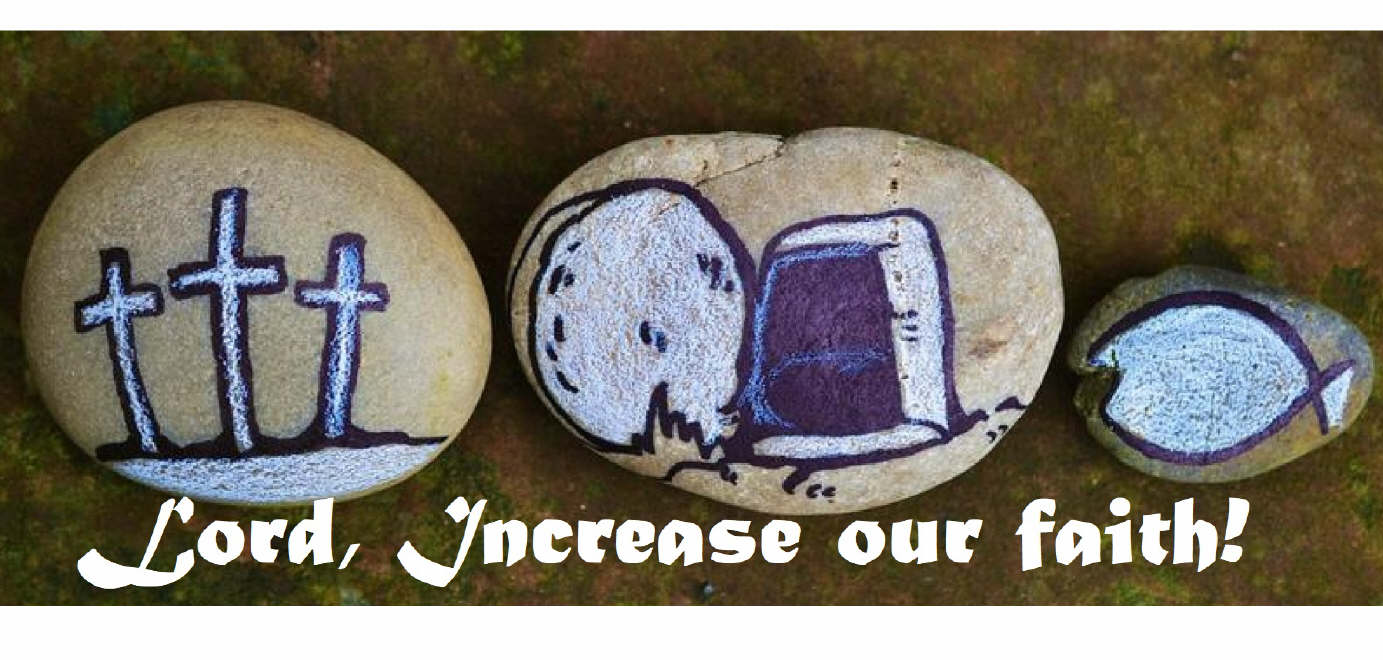
"How long, O Lord? How long?"
"How long must I call for help, but you do not listen? How long must I cry out to you, 'Violence!'
but you do not save?" These are the complaints of prophet Habakuk in today's reading. The Lord gave him an answer that has been repeated throughout the ages, "The righteous shall live by faith." As explained by St. Paul, "We live by faith and not by sight." (2 Cor. 5:7). We cannot see with our eyes what our faith reveals to us in the spirit. Our faith is like a dark mirror, a faint light, a general direction rather than a clear path to follow. Faith is always something in the making, day after day.
Psalm 13 is a long complaint. "How long, Lord? Will you utterly forget me? How long will you hide your face from me? How long must I carry sorrow in my soul, grief in my heart day after day?" Nobody likes complainers, even when they have good reasons to complain. We can endlessly complain to God;it will not bother anybody. This type of prayer is called prayers of lament. There are many of them in the book of Psalm. It is healthy to complain when we are depressed and utterly unhappy. Most people cry when loosing a parent. But after a while, one's eyes become dry of tears, and we get tired of our own complaining. Then it is time to increase one's faith.
Psalm 13 ends with faith and joy. "I will sing to the Lord, because he has done great things for me." This is the song of Mary in the Magnificat. To sing the glory of God is the greatest expression of our faith. It is also the best way to increase our faith: complain as much as needed, and then, sing the goodness of the Lord to you and the whole creation.
When we have faith, everything makes sense as in the above picture: the centrality of salvation (the three crosses), the need of sacraments (the bread and wine), and the primacy of Jesus Christ (the fish, ichtus in Greek, as a symbol of Christ).
Sing psalm 13, as the expression of your complaint (How long, o Lord) and your faith and joy (I will sing to the Lord)
September 25 Luke 16:19-31

There is an abyss between heaven and hell
There is a heaven and there is a hell, but we do know much about either. Maybe hell is empty, but we do not know. Maybe everybody goes to heaven, but we do not know. God would not be God if everybody, the saints and the sinner, the good people and the criminals, the believers and the unbelievers would all find their way into either hell or heaven. There will probably be sinners, criminals, and unbelievers in heaven, but we do not know how many.
"My ways are not your ways and my thoughts are not your thought, " says the Lord. (Isaiah, 55:8). There was time when sermons centered on the fear of God and the fear of hell. Many sermons preached the Ten Commandments, virtues and vices, the capital sin, and the great sin of not going to Sunday Mass. There was also a strong belief in the purgatory, and the need to pray for the deceased. On could offer Masses and saying prayers for the souls pf the dead. This was a good custom that today is not followed very much anymore. God's thought are not our thoughts. Each generation has to understand scripture in its own way. We do not know if hell and the purgatory are full or empty, but we know that there is heaven and a hell.
In the story of Lazarus and the rich man, one goes to heaven and the other to hell, but we do not now why. To know why is not the main point of the story. Lazarus may have been a angry beggar and the rich man a good family man; we do not know. At his death Lazarus was carried into the bosom of Abraham, into the bosom of God, a place of eternal happiness, while the rich man ends up in a place of torment.
The meaning of the story is given at the end: the rich man wants to know the secret of going to heaven: what do I have to do to deserve heaven? What giveas me a guaranty to go to heaven? Answer: listen to Moses and prophets, and trust in God; it is not a question of merits and guaranties, but a question of faith and trust; God will provide for the rest.
September 18, 2022. Luke 16:13
Who is your master: God or money?
"Like clay in the hand of the potter, so are you in my hand, " says the Lord (Jeremiah 18:6). The first couple created by God was fashioned to give glory to the creator for all the good things in paradise, but for Adam and Eve and all the earthlings after then, that was not enough. They wanted more: knowledge of the tree of life and the delight of forbidden fruits. To this day we want it all: what is permitted and what is forbidden, the good and the not so good. There is nothing wrong with money and the earthly things. What is bad is imbalance: then we come to worship one master and neglect the other.
We have been fashioned by the divine potter. When we forget it we feel guilty. We want to enjoy life and all its pleasures, and plan our lives for weekly pleasures and yearly vacations of entertainment. Then we hear a voice, "You fool! This very night you will die (or catch a deadly virus, or get cancer)." This is a reminder of the divine Potter.
"You cannot serve two masters." That's impossible! We can serve God on Sunday and enjoy life without him the other days of the week. Not bad. The pious Jews had a better plan: give to God 10% of everything at all time and you can enjoy the remaining 90%. That is actually very demanding but it can turn into hypocrisy: I am self-righteous and superior to other people who are less generous.
Here an answer from St. Paul: “Whatever you do, do everything for the glory of God (1 Corinthians 10: 31).
We can give glory to God in the morning and praise in the evening. Throughout the day we can ask for guidance in all the little things we have to do. There is nothing too small to praise God about it, and if we are faithful in the little things, we will be rewarded with bigger things. Then we can sing, "The Lord is my shepherd, my potter. There is nothing I lack."(Ps. 23)
September 11, 2022 Luke 15:1-32
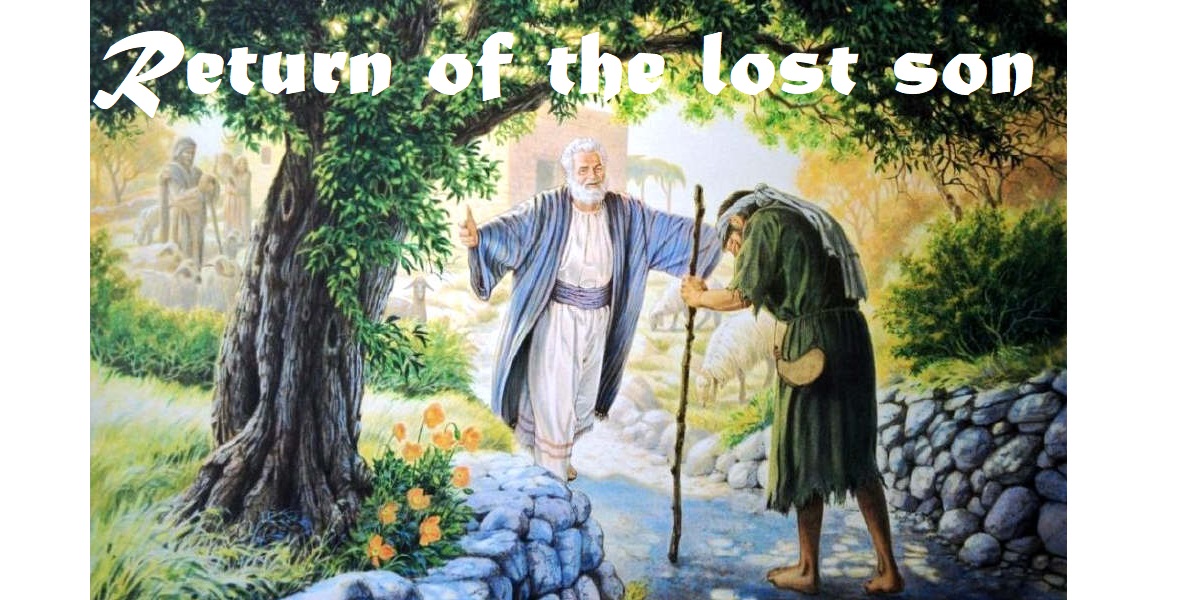
More joy in heaven for 1 conversion than for 99 righteous
The joy of heaven at the conversion of one sinner is illustrated by the anxious expectation of the father for the return of his prodigal son. When the father saw his son still far away on the road, he ran to him, embraced him, and kissed him. This is a parable, not a real life story. In the parable, the angels rejoice, but in real life we would have to face a problem, that of a son who spent half the fortune of the family, and now he comes back. The money lost will never come back; the son comes back but not the money. Now what? Jesus' parable is about conversion, not estate management.
The older brother wants to have nothing to do with the celebration for the returning son. He tells the father, "Your son swallowed up your property with prostitutes, and now for his return you slaughter the fattened calf." It's not right. It's bad property management. Yes, it is bad property management, but this is not the point of the parable. The point is to rejoice when a lost brother comes back to life, when the one who was lost has been found again. This is what angels in heaven rejoice about.
There are many prodigal sons around us: drug addicts, alcoholics, food-addicts, homeless people by accident or by their own fault, adolescents with no purpose, adults unstable at work and in relationships, etc. We can easily say with the older brother, "They wasted their lives; it's all their fault" – which may be true but not helpful. Jesus' parable expects us to be like the father mourning his son's loss of a productive life and waiting for every opportunity to bring him home. Like the angels in heaven we must celebrate the good rather than complain about the bad.
September 4. Letter of Paul to Philemon
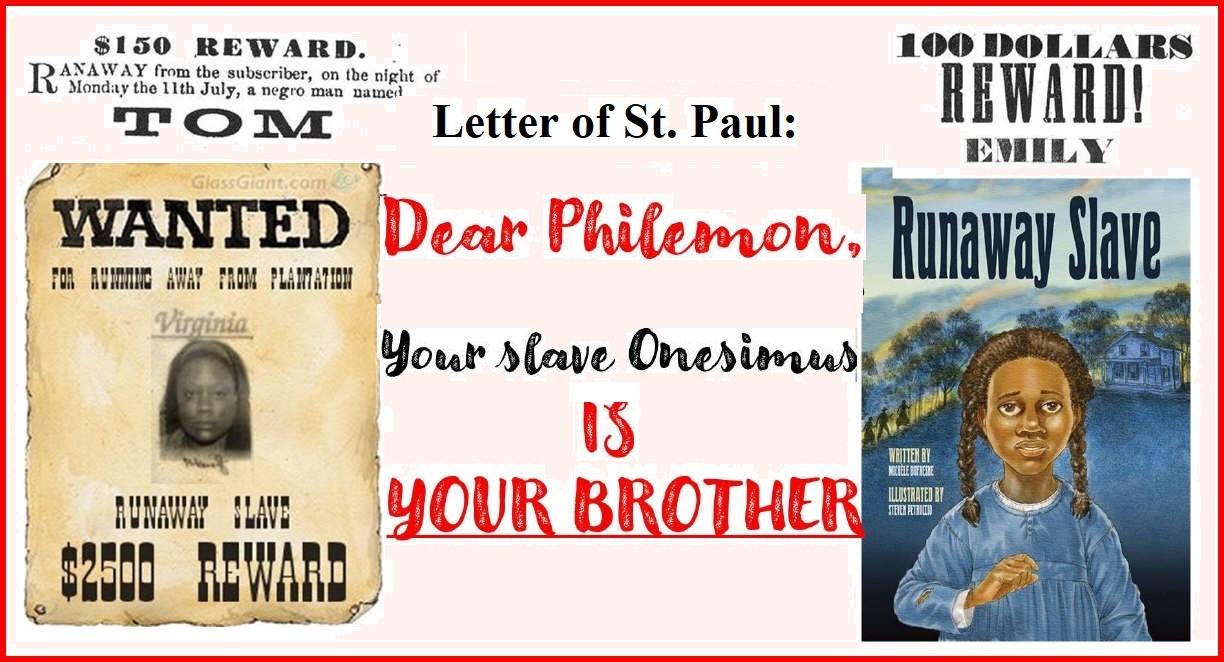
Take back your runaway slave as a brother!
Would you take back an employee who robed you or set your house on fire, would you? Would you lent your car to a friend who wrecked your previous car and is known for reckless driving, would you? I would not. But Paul was asking something like this when he invited Philemon to take back his runaway slave Onesimus.
Among Christians there should be no enemies, there should never be war. When Orthodox Russia invaded Orthodox Ukraine, the church of Russia should have opposed the war. Unfortunately, the Orthodox Russians and the Orthodox Ukrainians do not belong to belong to the same Orthodox church. Moreover, the metropolitan of Moscow openly supported the Kremlin's invasion of Ukraine. If St. Paul could come back, he would need a lot of patience to reconcile the two camps.
The Western Latin Catholics and the Eastern Orthodox do not celebrate Easter on the same day. Pope Francis tried to find a compromise to celebrate Easter, the major feast of all Christians, on the same day. So far he has not succeeded. It is hard to act as Christian brothers and sisters.
In any family there may be one or several members who stay away from the rest of the family. They way feel inferior because of their low economic status, or feel unwelcome because of their low educational level, or feel superior because they have achieved more than anybody else, or may have been rejected because of some moral scandal. Then we must listen to the exhortation of St. Paul: let us get these family members back into the fold of family life, because WE ARE ALLBROTHERS!
August 28, 2022. Twelfth Sunday after Pentecost. Luke 14:7-14
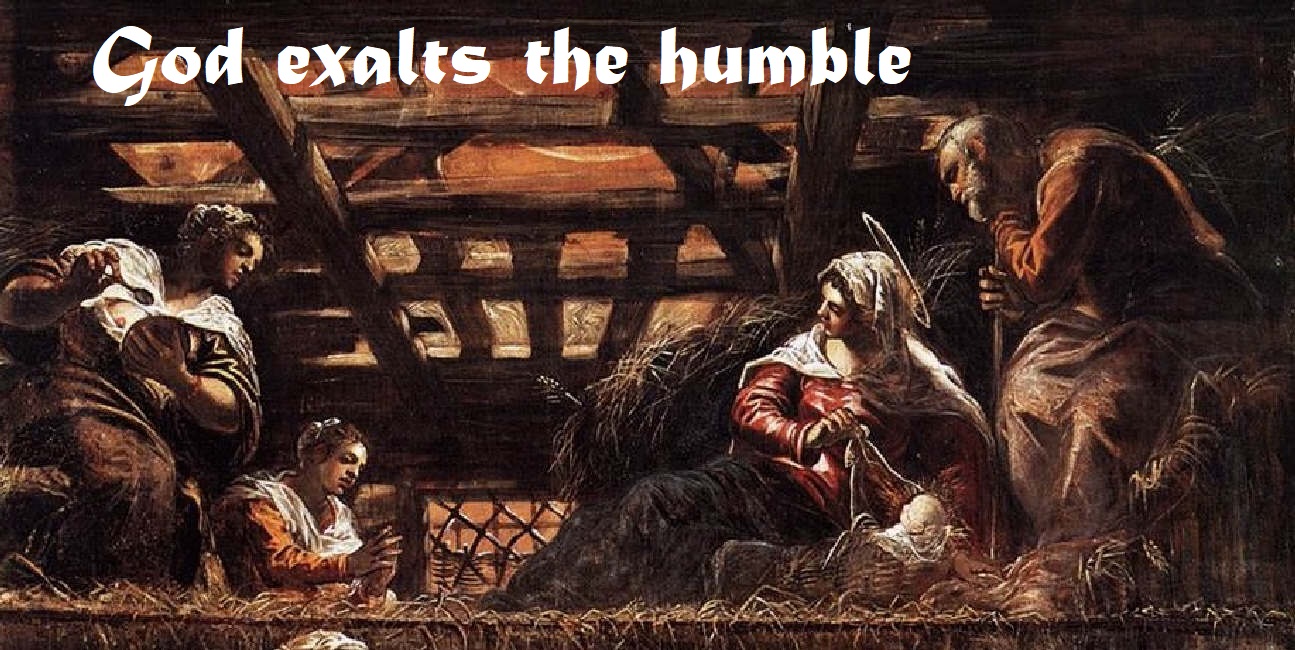
Let God rather than humans exalt you
"When invited to a wedding banquet, do not sit at the best place, because a more distinguished guest may arrive and then you will have to move to a lower place." This parable is about life in the Kingdom of God: "Everyone who exalts himself will be humbled, but the one who humbles himself will be exalted."
Everyone likes to be the chairperson of a committee because it gives power, or the executive officer of a business because it gives wealth, or the president of a club because it brings prestige. To pursue these values is glorifying and exalting oneself. Power, wealth, and prestige are secular values, which often stand in opposition to the kingdom of God. "Everyone who exalts himself (in secular values) will be humbled, but the one who humbles himself (before God) will be exalted." Mary humbled herself before God. When selected to become the mother of Jesus, she glorified the Almighty in the Magnificat: "He has regarded the lowliness of his handmaiden. He has put down the mighty from their seat and exalted the humble and the meek."
Jesus humbled himself, giving up his divinity and taking human form. Born in poverty, he died rejected by his people, in obedience of the eternal design of God. This is why he was exalted beyond humans and angels, to sit at the right hand of the Father. As admirably expressed by St. Paul to the Philippians:
being born in the likeness of men.
He humbled himself
and became obedient to death,
even death on a cross.
Therefore God exalted him
and gave him the name that is above every name,
that at the name of Jesus every knee should bow,
in heaven and on earth and under the earth,
and every tongue confess that Jesus Christ is Lord,
to the glory of God the Father.
August 21. Eleventh Sunday after Pentecost. Luke 13:22-30
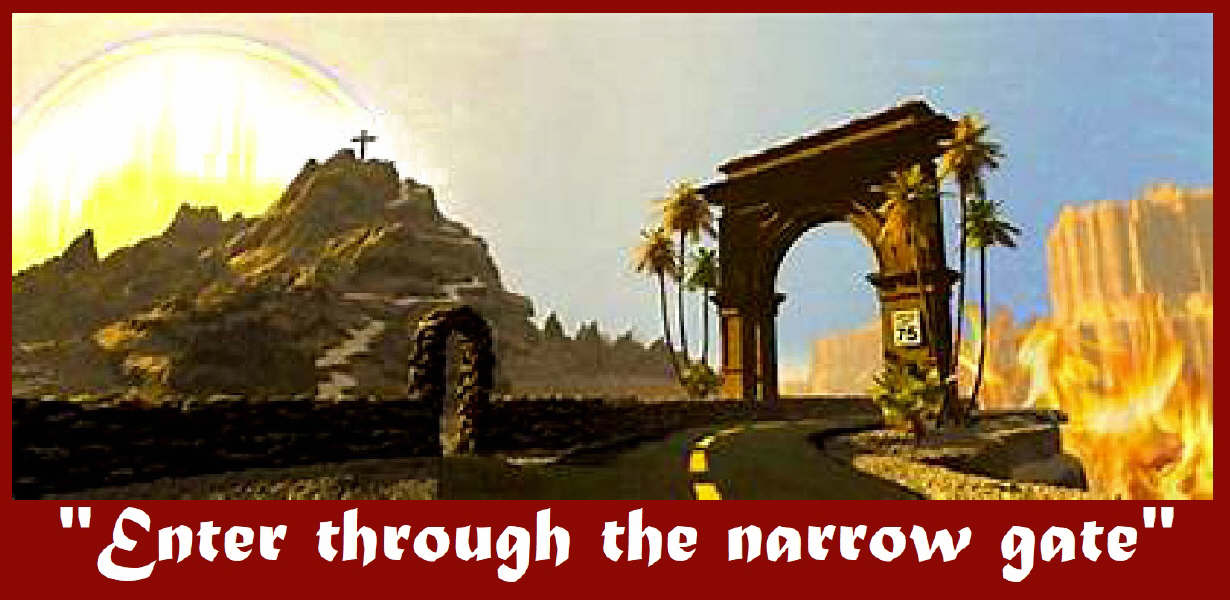
The narrow gate is for climbing mountains
It is vacation time. Here is just a short reflection.
The narrow gate is the the road that leads up and presents a challenge. We should climb mountains rather lie down at beaches. Read books, rather than watch many movies. Help others rather than just yourselves. Get involved in church rather than just attend once a week. Salvation is going up, in mind, body, and soul, even on vacation.
August 14. Tenth Sunday after Pentecost. Luke 12:49-53

"I wish the earth were already ablaze"
"I have come to set the world on fire, and I wish it were already ablaze." Jesus did not explain how the earth will become ablaze. It happened on Pentecost day and the following months and years, but only occasionally since then. There is something similar in the history of nations: there are times of great inspiration followed by ordinary times with no great leaders and no great events. That's ordinary time.
Most of the liturgical year is called ordinary time, except the seasons of advent leading to Christmas, and lent preparing for Easter. During ordinary time we must turn to ordinary means of inspiration: prayer and study. Most useful are bible commentaries. I often consult them with great profit. There are many bible reading plans. A very popular one today is that of Fr. Mike Schmitz. Check on youtube.com his bibl- in-a-year program. You can sign up (it's free) and download the program at Ascension press.
John the Baptist had proclaimed, "I baptize you with water, but He shall baptize you with the Holy Ghost and with fire." Through baptism with water, the sins were forgiven. Baptism with fire required more, namely purification. When sins are forgiven but the soul is not purified, one is likely to continue as before, because not much has changed. Baptism by fire requires purification of the soul, the will, intelligence, and the imagination.
"I have a baptism to be baptized with, and how great is my distress until it is accomplished!" Jesus knew how distressful his baptism would be. It will include being rejected, abandoned by his disciples, denied by the head of the twelve, arrested like a common criminal, subjected to a fake trial, beaten, tortured, and finally condemned to death at the request of the elite of his own people. Then he could only cry out, "My God, my God, why have you abandoned me?" Even when feeling abandoned, his trust in his Father was not shaken. This involved a radical purification of will, intelligence, and imagination. This is what spirituality requires: a radical purification.
This purification is at work in ordinary time when we have little inspiration and no spiritual energies. Then we can only pray, "Come, Holy Spirit! Come."
August 7, 2022. Ninth Sunday after Pentecost. Luke 12:32-48

"Your heart is where your treasure is"
"Get a treasure in heaven that no thief can reach nor moth destroy. For where your treasure is, there will also be your heart." If we accumulate treasures that do not wear out, our heart and our hope will be with these treasure in heaven. "Sell your belongings and give alms," then you will have a treasure for eternity and there will be your heart.
For St. Paul, Christ Jesus is the ultimate treasure, the wisdom of understanding the mysteries of God. "He is the image of the invisible God, the firstborn of all creation. In him were created all things in heaven and on earth. Through him and in him is the reconciliation of all things, making peace through the blood of his cross." (Col. 1:15-20). If he is our treasure, in him also will be our hearts.
Paul's teaching should not be just theoretical knowledge like what we learned in catechism, but the practical wisdom that guides our daily struggles. "Seek what is above, where Christ is seated at the right hand of God. Seek what is above, not what is on earth." What is above, where Christ is seated, is where our hearts should be. What is above is the "new self" to which we committed ourselves through baptism and daily devotions. What is from the earth is "the old self," a type of personality molded by social conformity and the social media.
The letter of Colossians ends with recommendations about social relations in family and social networks. To husbands, wives, children, and slaves he says, "Whatever you do, do it from the heart, as for the Lord. Whatever you do, in words and deeds, do everything in the name of the Lord Jesus." If our treasure is in heaven, so will also be our hearts. It is one thing to know it, which is easy, and another to practice it, which we must do in our daily struggles.
July 31, 2022. Eighth Sunday after Pentecost. Luke 12:13-2

A parable of spiritual growth
"A sower went out to sow the seed."This is what parents, teachers, and preachers do. Some seed falls on the good soil and grows quickly, some seed struggles to come up, and some will die in rocky soil. So it is in education and spirituality. Much of the growth also depends on our good will and attitudes.
In education much of the intellectual growth depends on the students' attitudes and the amount of homework. So it is in spirituality, except that we seldom have teachers to guide us. Sunday homilies give us encouragements but no plans of action. This is up to us. There are many things in life we have to learn by ourselves: to make repairs, to cook, to guide and teach our children, to take care of the garden, to handle money, to save for the future, etc. In all these fields, we have to learn from books and from the internet.
To read a good book is essential for growth. On the web there are many introductions to the classics of spirituality. Amazon offers a long list of books to choose from. A classic among classic is the Imitation of Christ. Easier are books about the life of saints like Mother Teresa or Charles de Foucault. It is time to discover or re-discover local saints of Africa and Asia.
Private time is important. Adults who study while holding a job know how important it is to find some undisturbed time, without telephone or cell phone interruptions. For many people, the morning is best when the mind is fresh; it may require to get up earlier to find free time. For some, late evening is best when everything in the house has quieted down. I first preferred the mornings, but then found the evenings more profitable. It may be useful to experiment to find the best time.
Prayer is more than asking God for favors. Reading scripture, one or two chapters at a time, is a great beginning. Reflecting on scripture is the way to go. Scripture is the seed in the parable of the sower. Not every page of scripture is very inspiring, but the bible has 800 pages to choose from.
It's never too late to begin. So let us begin today. For instance with Psalm 41: "As the deer longs for streams of water, my soul longs for you, O God." (In English with subtitles - or in French ) Skip the ads by turning off the sound at the beginning.
July 24. Luke 11:1-13
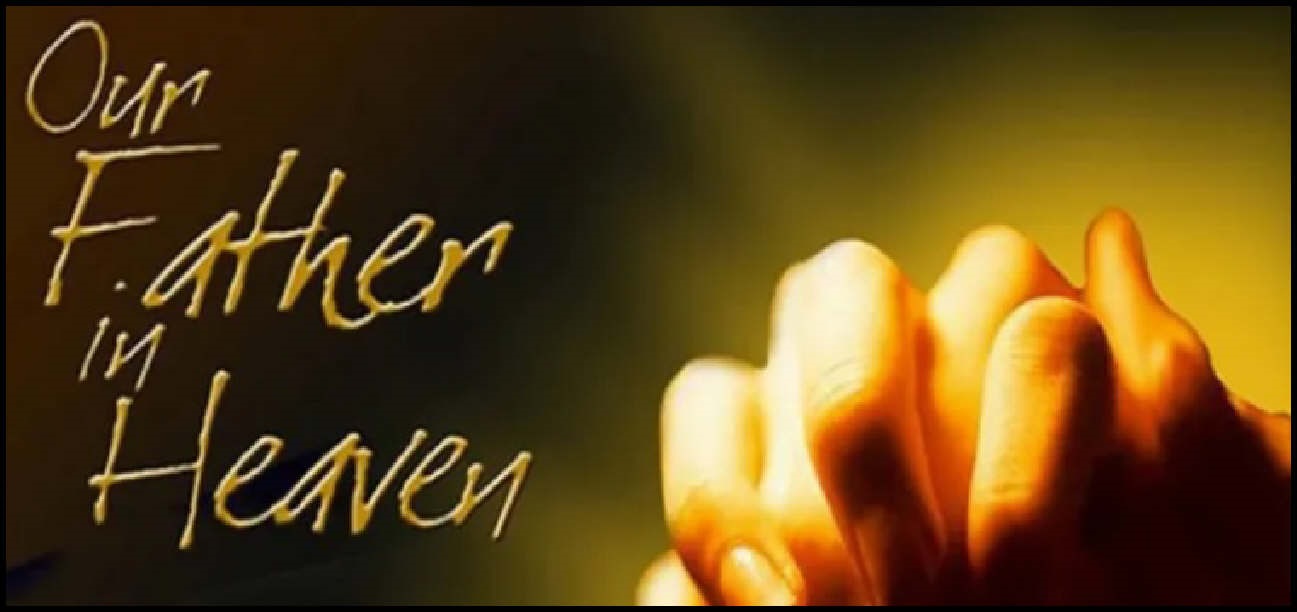
"Ask, and you will be given"
"What father would hand his son a snake when he asks for a fish? If you who are wicked know how to give good gifts to your children, how much more will your Father in heaven give the holy spirit to those who ask him." At Christmas, parents give good gifts to their children, but not always what they want. "Ask, and you will be given," but we are not always given what we want and when we want it. God's gifts are favors, not automatic answers to petitions. Requests and favors are always part of a loving relationship, not utilitarian transactions.
Why to ask? Does not God know our needs? In the garden of Eden, when Adam and Eve hid themselves from the Lord, God called the man and asked him, "Where are you?" Obviously God knew where Adam and Eve were, but he wanted to give them an opportunity to become aware of themselves. "I heard you in the garden and was afraid because I was naked." (Gen. 3:9-10). When we ask for God favors, we become aware of our needs and our nakedness. Like Adam, when we have eaten from the tree of life we realize that we are not smarter or better, but in need of help. Crying for help is often the first step toward accepting our human condition in peace.
In prayer we begin by giving glory to God: "Our Father, Who art in Heaven, hallowed be Thy name. Thy Kingdom come. Thy will be done on earth as it is in Heaven." It is natural to begin with our needs; this is why we usually come to pray. But the Lord knows what we need and when it is best for us to receive his gifts. By praising God first, we put ourselves in an attitude of grateful reception, so that God's will be done in our lives as it is in heaven and on earth.
Let us sing the Our Father in a popular version watched by 2.5 million people (Mute your loudspeaker during the ads at the beginning).
July 17, 2022. Sixth Sunday after Pentecost. Luke 10:38-42
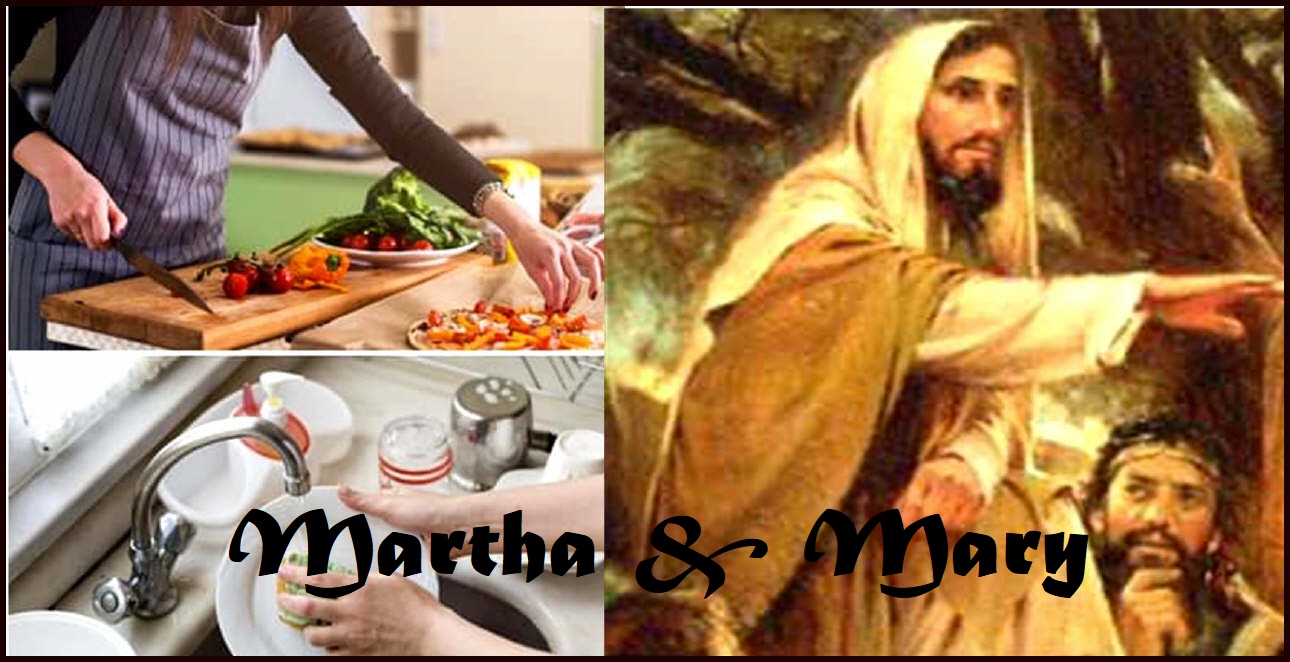
"Martha, you worry about details!"
"Martha, Martha, you are anxious and worried about many things. There is need for only one thing: seek first the kingdom of God and his righteousness, and all things will be given to you besides. Don't worry about tomorrow; tomorrow will take care of itself." We all worry about too many things. Only one thing is important: the kingdom of God.
What was Martha worried about? She invited Jesus without mentioning her sister. After Jesus arrived, she returned to the kitchen, leaving Jesus in the living room conversing with Mary. Then she complained, "Doesn't it brother you that my sister has left me do all the serving by myself?" This is more than a complaint: she is telling Jesus what do to; "Tell her to help me!." Now Jesus is in the middle of a power struggle between two sisters, and Jesus is asked to side with Martha.
What is more important, people or things? It is easier to deal with things than people. When something is not working, an appliance or a computer program, we can look at it, put it aside, and come back to it later. We can do a research to find a solution. Not so with people. We cannot control them. We can try to manipulate them ("Jesus, tell me sister to help me") but often it does not work. We can ignore a problem for a while, and then have a confrontation, often with poor results. We cannot change others but we can change our own attitude. "What would Jesus do?" The answer is not in our imagination but in what we know from scripture. So what should Martha do? Jesus said it: "You are anxious and worried about too many things." Worries and anxiety often do not help. The answer is: do all things — including cooking for guests — without anxiety. Martha's anxiety was to offer a perfect meal. She was a perfectionist. Perfectionism does not help.
We all worry about details. Life is made of details from early morning to late at night. What details can we change to seek first the kingdom of God? Let us reflect about our daily lives and ask, "What would Jesus do?"
July 10. Fifth Sunday after Pentecost. Luke 10:25-37
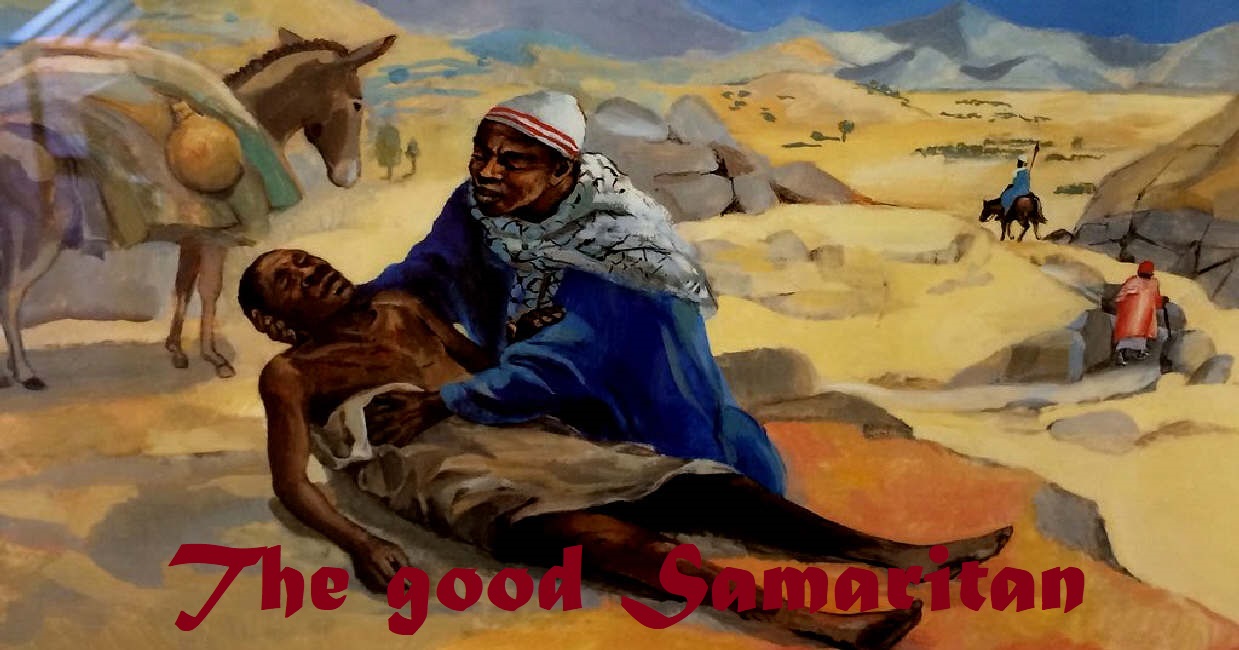
"He was moved with compassion"
The priest and the Levite passed by, saw the man half-dead on the side of the road, but had no feelings. Why? They were good people like most of us. They knew the Ten Commandments like most of us. They saw the suffering man on the side of the road and did not react, like most of us would. Why?
To love one's neighbor is not easy. In some families when the wife is pregnant, the parents decide not to have the child. In some families the children are ignored or neglected. In other families they are abused, beaten, and forced to work. In many families there is verbal and sometimes physical violence between parents. Many families are only concerned with their immediate needs and ignore those of members of the extended family. Many people give much care and love on their dog, car, or other pet but ignore the needs of people around them. The priest and Levite in Jesus' story probably loved their children and pets, but nothing more.
Today when passing by a homeless in the street in a cold night of winter, most good Catholics (probably also priests and church leaders) would just go to the other side of the road. What else can you do? The good Samaritan was a saint, not an ordinary believer. Jesus described the ideal answer to suffering, not what he saw a Samaritan actually doing on the road to Jericho.
This high ideal is actually what all Jews and Christian should follow: "You shall love the Lord, your God, with all your heart, with all your soul, and all your strength." (Deut. 6:5). Jesus added, "You shall love your neighbor as yourself." (Mark 12:29). We have a a long way to go in our love of God and neighbor. It is difficult to love God with heart and soul; we must first love with our lips on Sunday morning. It is hard to love neighbors; we must first love our immediate family, and later the extended family, and later an occasional person in need. There is no limit to love; we can grow in it every single day. What can we do today or tomorrow? Progress is one little step at a time.
July 3, 2022. Fourth Sunday after Pentecost. Luke 10:1-12

"Lord, send laborers for your harvest"
The shortage of priests is a world-wide phenomenon. While the Catholic population has doubled over the last few decades, the number of priests has steadily declined, especially in the West. The immediate effect is fewer Masses and a greater difficulty to provide the sacraments without undue burden. There is also a decline in the quality of parish life: with fewer priests, the parish will have less guidance and encouragement for its various activities, the devotional groups and the various ministries. Lord, send priests to your harvest!
The kingdom of God takes place in everyday life, not just the parish. In schools, we need wise teachers and counselors. Many successful people remember an influential teacher who helped them when in trouble or guided in times of difficult choices. Many people can also say that they lacked proper guidance in crucial times. Most of us have to make life-decisions without much information. We all need mentors to provide a road map for our future and models to follow in the life-course.
We are supposed to follow the example of saints, but often seem so distant to us. They lived in different times and circumstances, and had qualities and virtues which we lack. Most saints were priests, many were bishops and popes, most of them were celibate males. What we need is ordinary saints for ordinary people. Not canonized saints, but role models for family life, work, and cultural activities. The needs are great, but the laborers few. Lord, sand us ordinary saints for every day life.
No less importance is the need of guidance in spirituality. Saint Paul wrote to the Thessalonians, "Pray without ceasing!" Yes, but how? We do not know how to pray and there is nobody to teach us. Of course we know our prayers, but we need more than rote prayers. "Blessed are the poor. Blessed are the meek. Blessed are the peacemakers. Blessed are the pure in heart." These teachings are hard to understand and practice. We need good sermons to guide us in our spiritual lives, and such guides are hard to find. Lord, send us good preachers for your harvest!
June 26, 2022. Third Sunday after Pentecost Luke. Luke 6:20-26
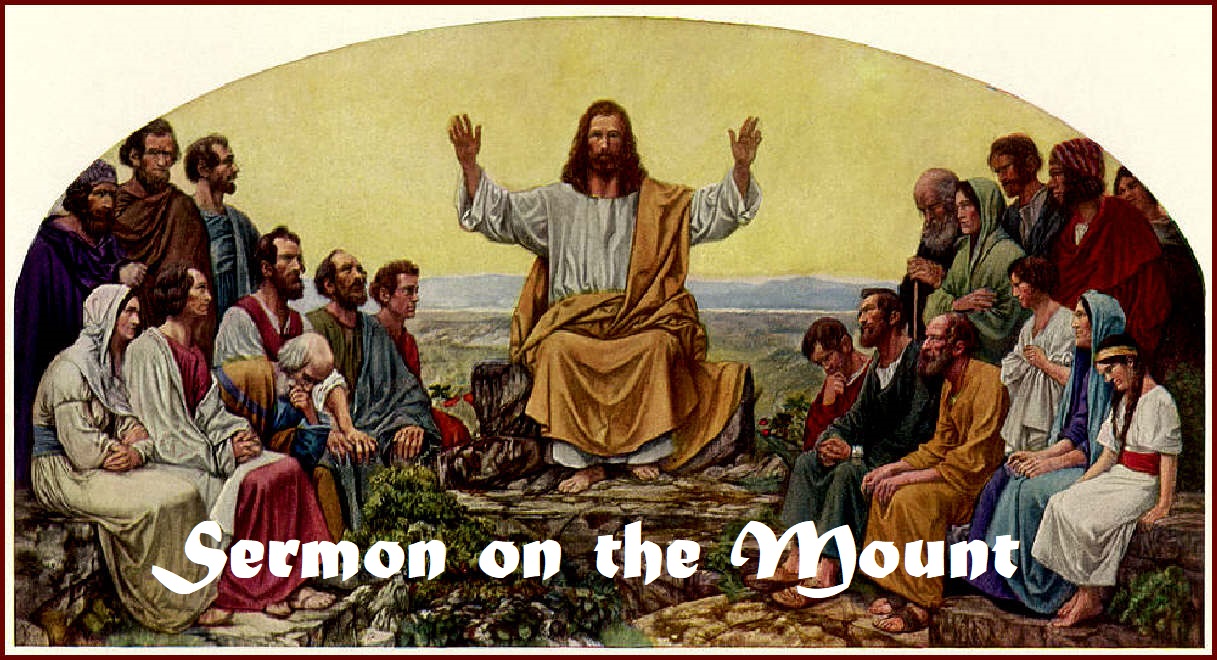
"Blessed are the poor of this world”
Blessed are the poor, the hungry, the peace-makers, the merciful, the pure in heart. The beatitudes stand in opposition to the worldly values of wealth, pleasure, power, and social prestige. We are given the choice between the Kingdom of God and the the world of Mammon, but this is a difficult choice. At best, we can take a little from both sides.
Who are the poor of the Kingdom? Material poverty by itself is not a blessing. Nobody wants to be poor. But when you have nothing, you are likely to ask for help. "My help comes from the LORD, who made heaven and earth!" (Ps. 121) The most important help in poverty is hope. The one who made heaven and earth is the one who can help. It is rare that God has taken people out of poverty; what is common is that hope in the Lord helps people bear their poverty and take little steps to improve their situation.
Blessed are the hungry? Not really. Famine has long been a curse throughout the world. The Israelites suffered from hunger for forty years in in the Sinai desert. What kept them going was the promise of a land of honey and milk. Hungry people dream of food, and their dreams keeps up their hopes. "Blessed are the hungry because they will be satisfied." It does not say when. The Israelites waited for centuries for the Messiah to come. For the Lord, one day is like 1000 years and thousand years like one day" (2 Peter 3:8).
"Blessed are the pure in heart because they will see God." Pure gold and silver are totally refined metals. A pure heart is one that has been refined from all selfishness and self-confidence to be totally open to the inner voice of the Spirit. This is what sanctification means: the purification of the mind and the will. Those who reach that state, even at a low level, are truly blessed with peace and joy.
The Beatitudes are a call to prepare oneself for the kingdom of God. Today is a good day to to begin or to continue this journey. Read over what Luke has to say in 6:20-26.
June 19, 2022. Sunday of Corpus Christi
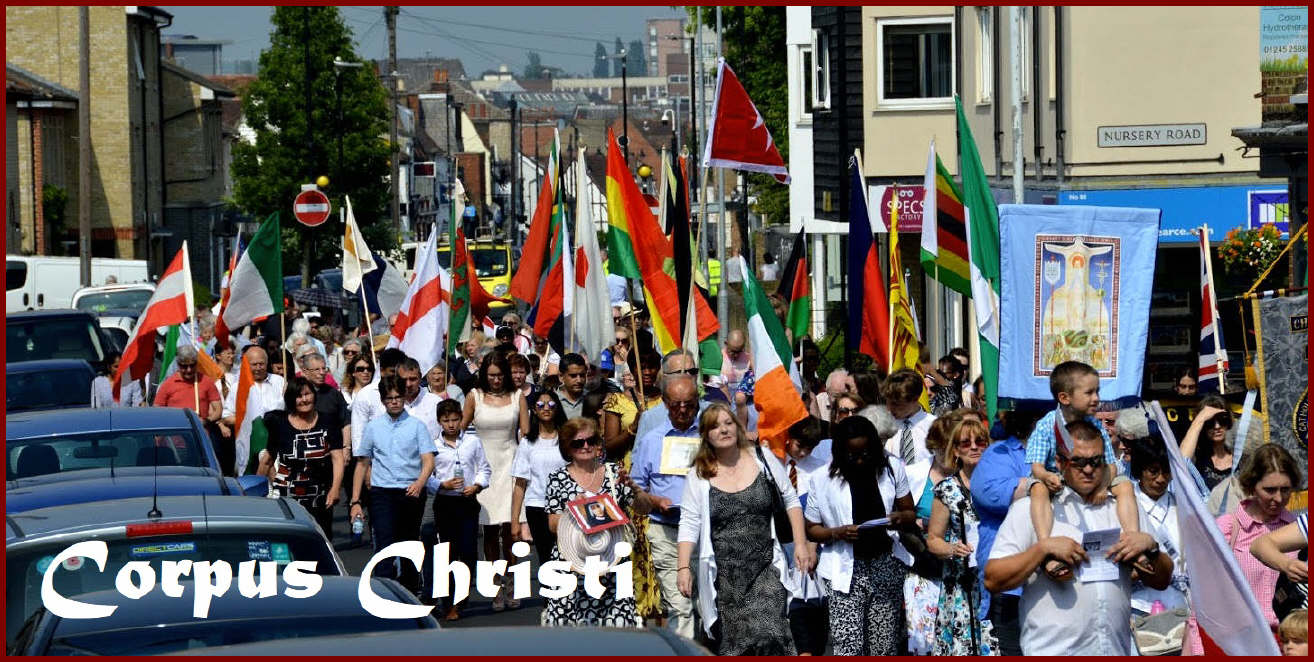
“I am the bread of life”
Since the beginning of Christianity, Christians have celebrated the Eucharist. St. Paul reminded the Corinthians in around 55 AD, "I received from the Lord what I also passed on to you: The Lord Jesus, on the night he was betrayed, took bread, and when he had given thanks, he broke it and said, 'This is my body, which is for you; do this in remembrance of me.'” It is the Eucharist that separated the Christians from the Jews, and since the 16th century, the Eucharist separates the Catholics from the Protestants.
On this Sunday of Corpus Christi, Catholics take the Body of Christ to the street in a loud manifestation of faith. In the past, people prayed aloud or sang. Today this procession is a little more informal, but it is still a powerful manifestation of people's faith. Hopefully you will be able to join one.
It is Jesus Christ who is the bread of life, not just the communion bread. Today everybody takes communion at mass, so that it easily becomes a habit, a routine. There are some devotions which are not routines, like a visit to the Blessed Sacrament during the day or the evening, or a holy hour where it is available. Time alone with the Lord is really bread for the soul and bread of life.
There are many beautiful hymns dedicated to the Blessed Sacrament. They are very inspiring:
The tantum ergo (without translation):
https://www.youtube.com/watch?v=U305GmB28Oc
The tantum ergo with translation: https://www.youtube.com/watch?v=INljg1sHyhg
The Pange Lingua gloriosi song during the procession: https://www.youtube.com/watch?v=raeihsMkVm4
June 12. Sunday of the Trinity

“Glory to the Creator, the Savior, and the Vivifier”
We give glory to the creator of heaven and earth. God existed before all ages and out of all spaces. When he said, "Let there be light," he set into motion the Big Bang which gave birth to all the stars and all the galaxies. God has created time and space in which we live. The universe has been expanding since the beginning of creation, all stars becoming ever more distant from one another. One day the stars will be dispersed in the four corners of the universe and their light will turn into darkness. One day, time and space will cease to exist. One day -- at our death -- we will exist out of time and out of space, back to the creator who exists out of time and out of space.
We give glory to our savior, Jesus the Christ, announced by the prophets. He existed at the beginning as the creative word because he was God. He came to what was his own land in order to restore the Garden of Eden by planting a new tree of life; indeed, he is the tree of life and the knowledge of good and evil. His own did not receive him, but for those born in the faith of this new life, he has given them the power to become children of God. His message is folly for the wise of the world, but wisdom for those reborn in the spirit. He is the hope of the future because God has risen him from the dead; he is the promise of the life to come.
We give glory to the Spirit which speaks in the murmur of our conscience and the words of scripture. His message is always fresh, yet always a remembrance of the words and deeds of Jesus the Christ. Since the day of Pentecost, the Spirit speaks in many languages and through many tools of communication. We may be reminded of the message of salvation through friends, events, readings, and sermons. The Spirit is the Advocate in our advocate before God, and the advocate of God among us.
Today is the day to proclaim: Glory be to the Father, to the Son, and to the Holy Spirit, forever and ever. Amen.
June 5, 2022. Pentecost day

“As the Father has sent me, so I send you”
"Suddenly there came from the sky a noise like a strong wind, and it filled the whole house. Then there appeared to them tongues as of fire which came to rest on each one of them." This appearance of the Holy Spirit repeated the manifestation of God on Mount Horeb, as witnessed by Elijah. "There was a strong and violent wind before the Lord, but the Lord was not in the wind. After the wind an earthquake and fire, but the Lord was not in the fire. And after the fire, a light silent sound." (1 Kings 19). God appears in the power and violence of nature, but God is not in nature. God comes to our hearts like a silent murmur. That's were we can encounter him in dialogue.
"Behold, I create new heavens and a new earth. And the former things will be forgotten" (Isaiah 65:17) This was the promise and vision of the prophets. For centuries the wise men and women of Israel prayed for the Messiah to come. They dreamed about that day and had visions about that future. They expected that one day "the wolf will dwell with the lamb, and the leopard will lie down with the young goat. The nursing child will play by the hole of the cobra." These were dreams; the reality is always somewhat different.
When Jesus ascended into heaven, the disciples looked at the sky, hoping he would come back soon. No! Do not look at the sky but get to work. "As the Father has sent me, so I send you." The time of dreaming is over; now is the time to get to work for the kingdom.
Before any work we must pray, "Come, Holy Spirit,
Fill your believers' hearts,
And kindle in them the fire of your love." We can listen to its Latin version, Veni Sancte Spiritus, Reple tuorum corda fidelium, Et tui amoris in eis ignem accende.
May 29. Luke 24:46-53
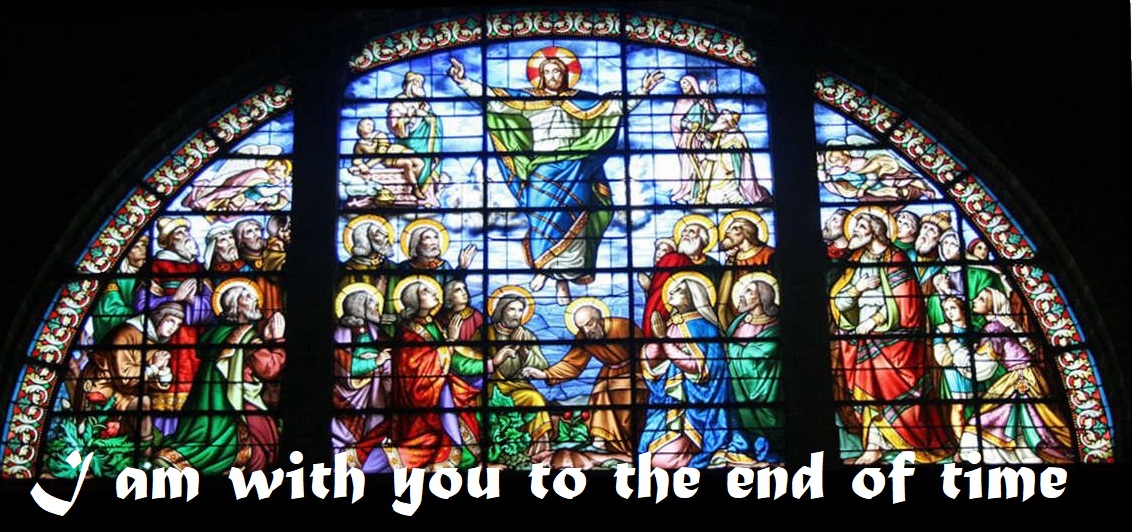
“I will not leave you orphans”
“I will not leave you orphans. I will ask the Father to give you an Advocate to be with you always." We are temples of the Holy Spirit who is with us always. This Advocate speaks in the temple of our conscience. “Conscience is the most secret core and sanctuary of a man. There he is alone with God.” To be alone with God is necessary to hear his voice. This voice may say “Do this” or “Avoid that.” It is not the voice of a judge preaching morality; it is a voice about our own good and happiness. Following it brings joy; ignoring and rejecting it brings sadness and regrets. It is the voice of the Good Shepherd caring for his flock.
After his resurrection, Jesus appeared to his disciples not every day, may be not even every week, but on special occasions. After his Ascension, he became absent to the senses but invisibly present in faith. He is the vine, and the Father is the grower. "Remain in me as I remain in you. Whoever remains in me and I in him will bear much fruit, but without me you can do nothing." To remain in him and he in us is to remain in his love. We are given a new commandment, to love one another. We are also given a new sign of identity: by our love the world will know whether we love God in truth and deeds, and not only in worlds and appearances.
The Ascension began a ten day retreat for the disciples who gathered in a big room, probably, the one of the Last Supper. What did they do for ten days? Much of the time may have been dedicated to recounting the events, parables and teachings of Jesus witnessed by the twelve. This was also a form of prayer, one that would be most useful for our knowledge of Jesus. We have only a short time left before the big day of Pentecost. It would be time well used to review some of Jesus' deeds and teachings.
May 22, 2022. John 14:23-29

“The holy Spirit will remind you of all that I told you”
In today's reading in preparation for Pentecost, Jesus promised the coming of the holy Spirit who "will teach you everything and remind you of all that told you." The holy Spirit is a teacher who will instruct us about new things. In the history of the church, there have been many small Pentecosts for gifted individuals and Christian communities, especially the founders of religious life. Vatican II and the Charismatic Renewal were such effusions of the holy Spirit. We all have sometimes a little inner light of understanding and enthusiasm, but we cannot just wait and see until we get divine inspiration. The most common work of the holy Spirit is through our effort to understand in prayer and meditation.
"The word that goes out from my mouth will not return to me empty, but will accomplish what I desire and achieve the purpose for which I sent it. (Isaiah 55:11). The word of God is like the rain: it helps to grow but it is not the seeds. Scripture is the rain that fertilise our thoughts, but it cannot do anything by itself. There cannot be our Sunday devotions on the one hand, and also, unconnected, our secular activities. We cannot have two identities, one secular and one religious: the Spirit must integrate them as we grow, from cradle to grave.
One important source of spiritual inspiration is the liturgy. Through the readings and the prayers, the Spirit reminds us of all that Jesus told us, but often it is not very effective for many reasons. The liturgy should be beautiful in its execution. We cannot appreciate a piece of music when it is poorly performed, or a movie or play when the actors are unprofessional. A good work of art is one that is transparent to what is presents. Similarly, a good liturgy should be transparent to what it represents. It may, sometimes, be beneficial to go to another church, if possible, where the liturgy is more transparent.
The liturgy and the arts require total attention. One cannot visit a museum in a hurry, or profit from the liturgy by arriving late. At concerts, it is best to arrive early and to read the program. To hear the voice of God at the liturgy, it helps to arrive early and go over the readings of the day.
This is the day to sing and endlessly repeat, Veni, Sancte Spiritus
TO AVOID ADS, CLICK ON THE SCREEN SEVERAL TIMES, then click on "SKIP ADS." |
May 15, 2022. John 13::31-35
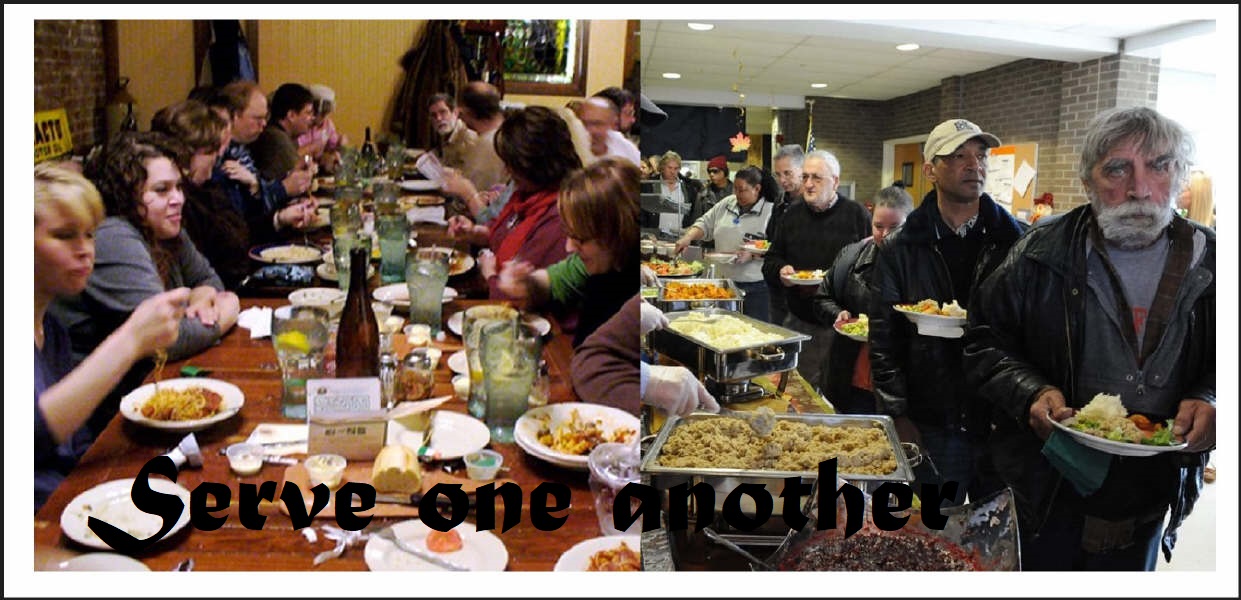
"Love one another as I loved you"
We love others by helping them. Love as service is a concrete action which is more engaging than writing a check to a charity. It is more useful than the emotional love among friends. Everybody can be helpful, at home, at work, in society.
We can begin with the Golden Rule: do to others what you would like them do to you. The first thing is to listen. We all like to tell our story and be listened to. By listening first, we learn about people's wishes and needs. Have you ever been given a "white elephant" (a gift that is useless and undesirable)? To help others we need to know what they like and need, and not give them a white elephant. Don't serve your best pork recipe to a Jew or a Muslim.
Mutual help begins at home. Nobody likes to wash the dishes after a meal, sweep the floor, or take out the garbage. Mutual help extends outside the home: helping relatives, inviting an aunt or uncle who is marginal in the family; helping and encouraging children with their school work; supporting financially a family or child; and helping the refugees of all kinds, from wars, floods, droughts, and violence.
All this is very secular. Not really. "I was hungry and you gave me food, I was thirsty and you gave me drink, I was a stranger and you welcomed me. Truly, I say to you, as you did it to one of the least of these my brothers, you did it to me."
May 8. John 10:27-30

"My sheep hear my voice"
When Jesus was arrested in the garden of Gethsemani, the flock was dispersed. In the following days, the disciples locked themselves in, out of fear of the Jews. When Jesus appeared to them, Thomas did not believe it. When they went fishing on the lake of Galilee, there were only six of them. There is no more mention of the holy women who had followed Jesus. After the success of Pentecost, the disciples were persecuted, and the church of Jerusalem was destroyed. The voice of the Good Shepherd seemed to have become silent.
Who hears the voice of the Shepherd today? "Behold, I stand at the door and knock. If anyone hears my voice and opens the door, I will come in to him and eat with him, and he with me." In our busy lives, it is often difficult to hear the knocking at the door, and even more difficult to open it. Yet millions hear this voice everyday and receive the Lord.
In the mosaic of Ravenna in Northern Italy of about 425, the Good Shepherd wears the sumptuous clothes of the imperial court, but Jesus was a carpenter and the shepherds of his time were the illiterate and unskilled boys of the village. The Good Shepherd does not come in pump and power, but in humility and silence. This is why he is hard to hear.
On Easter Sunday we sing in Latin an old hymn from the 11the century, Victimae Paschali Laudes. It is beautiful and inspiring. The text and the translation are giving below the music. Let this hymn resonate in our hearts like the silent voice of the Good Shepherd.
May 1st, 2022. John 21:1-19
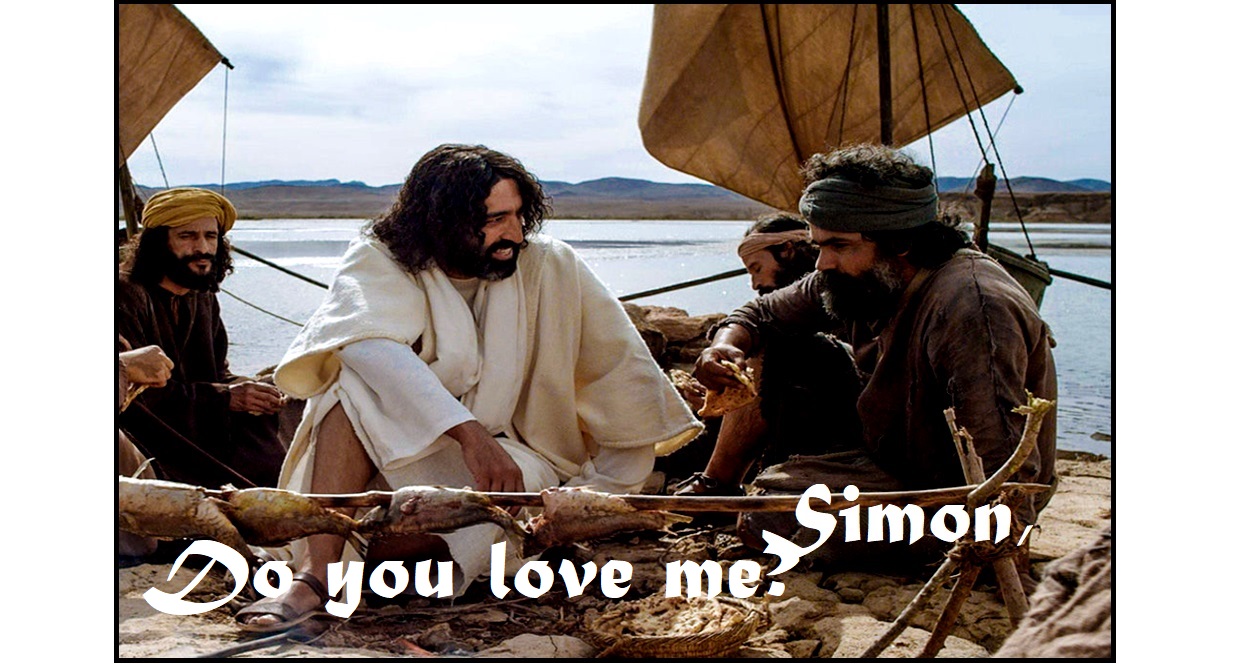
Jesus to each of us: "Do you love me?"
What a strange question. "Of course, I love you. Why do you ask?"
Love is more important than anything else. "A new command I give you: Love one another." At this is the sign people will recognize that we are Jesus' disciples: loving one another.
The Torah commanded the Jews, "Love God with all your heart, with all your understanding and with all your strength." This is the Shema prayer; it is a pledge pious Jews recite every day. Jesus emphasized another dimension of the Torah. He said, "Love your neighbor is more important than all burnt offerings and sacrifices." Then, if Temple sacrifices were to atone for sins, much more will love to atone for a variety of sins.
Jesus loved Martha and her sister and their brother Lazarus. Yet when he was told, "the one you love is ill," he did not rush to his beside. He saw this illness in a broader perspective, "so that the Son of God be glorified through it." Martha greeted him with a complaint, "If you had been here my brother would not have died." This too, was for the greater glory of God. It allowed Jesus to say, "I am the resurrection and the life; whoever believes in me will live." Yet, when confronted with the death of Lazarus, seeing Mary and Martha weeping, Jesus wept. And the Jews to say, "See how much he loved him."
Jesus called Lazarus back to life, yet he wept. Working for the Kingdom of God does not take away human feelings. Jesus was not an insensitive hero who can confront death without feelings. Human feelings are part of the Kingdom of the incarnated God. "What can separate us from the love of Christ? Trouble or hardship or persecution or danger or sword? No! Nothing can anything ever separate us from Christ's love" For the apostle Paul, this love was passion and enthusiasm; these emotions are as important as other expressions of love of God and neighbor.
"Do you love me?" We can answer in the secret of our hearts.
April 24. John 20:19-31
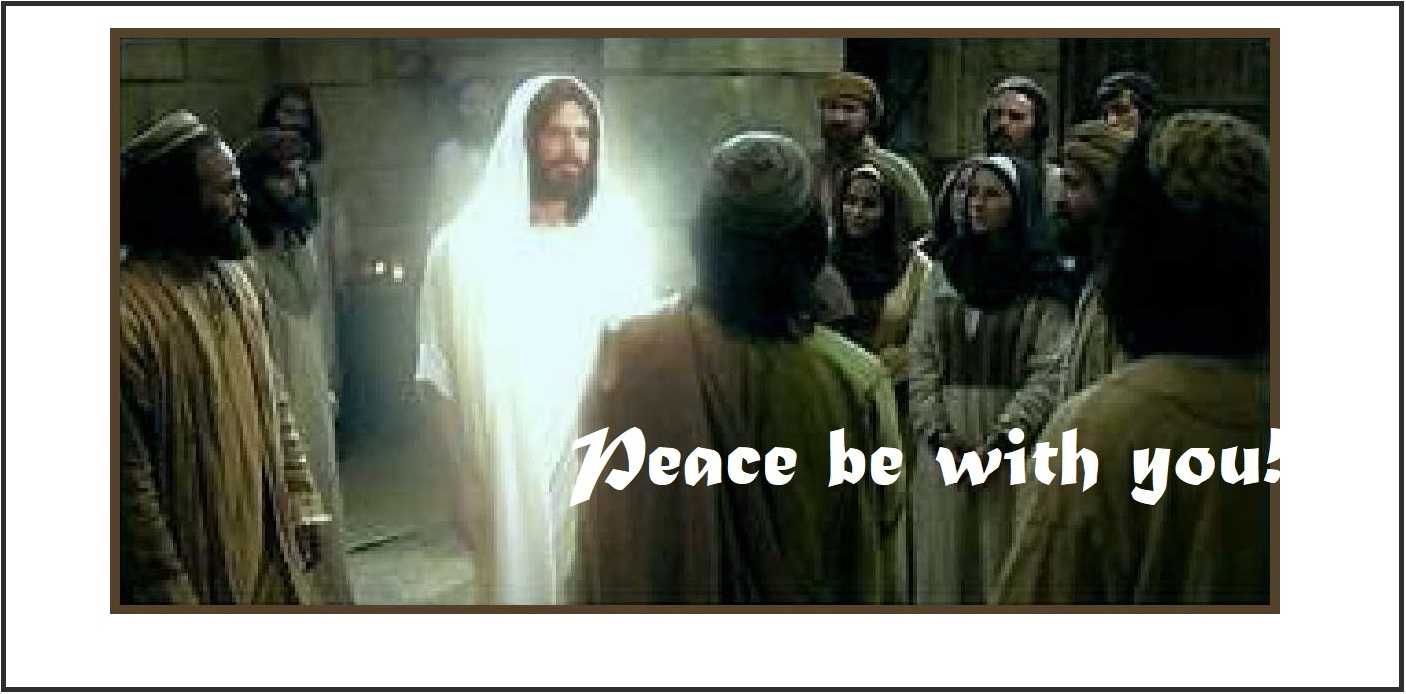
Peace in fear, suffering, and war
not the peace from war
Not as the world gives, do I give it to you."
On the evening of the Easter Sunday, when the doors were locked, Jesus appeared in the middle of his disciples saying, "Peace be with you!" Here is a man executed as a criminal who comes back to bring peace, not revenge and punishment. Can you imagine the dead of the Ukraine coming back, in the midst of the memory of recent war crimes, to bring not justice and condemnation to the criminals, but peace? This is the essence of Christ's message.
We understand peace as the absence of conflict between individuals and nations. In everyday life, there is conflict about space, time, money, resources, requirements, expectations, etc. Conflict produces suffering, tensions, and fear. We can eliminate one source of conflict, but soon there is another one, and another one.
"I give you peace not as the world gives it." It is peace in the midst of conflict, suffering, and tensions. It does not promise peace from war, but peace in war. It is a peace that comes from within, not from the absence of outside conflict. "I give you my peace," the peace that comes from God.
"Seek first the kingdom of God and its righteousness, and all these things will be added to you. " (Mt 6:33) The best defense is going on the offensive. The best defense against fear, anxiety, and suffering is to get involved in activities that take us out of our own worries. Helping others is often the best way to help oneself.
Let us sing the Taizé refrain, "Give us Peace in our Days:" Da Pacem, Domine, Da pacem, O Christe, in diebus nostris
TO AVOID ADS, CLICK ON THE SCREEN SEVERAL TIMES, then click on "SKIP ADS." |
April 17, 2022. Easter Sunday

"Resurrexit, sicut dixit! Alleluia"
Mary of Magdala saw that the stone had been moved from the tomb. She ran to the disciples with the news, “Robbers have taken the Lord!” Peter ran to see, went inside the tomb, and saw the burial clothes that had covered Jesus’ body, and next to it, but separate from it, the cloth that had covered his head. “No! Robbers do not do that!” He was perplexed. John went in, and saw the burial clothes and next to it, the facial cloth. “HE IS ALIVE!” He saw and believed. Neither Peter nor John could understand the predictions that, according to Scripture, Jesus had to rise from the dead. Such understanding was totally unimaginable. Scriptural understanding is a gift of spiritual enlightenment, not an interpretation based on mere observation.
We have two interpretations. One says, “I believe in the resurrection since I was a child. There is nothing more I can learn.” This is cultural Catholicism, based on custom and tradition. The other goes beyond the traditional observation of the holy days and seeks an understanding of faith. One then realizes that Jesus is ALIVE AND ACTIVE throughout the year, more particularly in Scripture, the Eucharist, the community, and private prayer.
The Scriptures contain God's salvific plan of salvation, and most importantly, the words and deeds of Jesus the Christ. To go beyond cultural Catholicism, one should read the Scriptures.
The liturgy is source and summit of Christian life. In the Eucharist Christ is present and alive to those who seek him on a regular basis.
The community is the body of Christ where his disciples can learn and receive support from one another. It is assumes that believers meet to share their faith, usually in small groups. Private prayer is the instantaneous contact with God and his Anointed one. God is present whenever we are present to him. He has been present for centuries to all those who seek him .
Let us sing with the pilgrims of Taizé, the refrain "In Resurrectione tua Christe, coeli and terra laetantur."
April 10, 2022. Passion Sunday
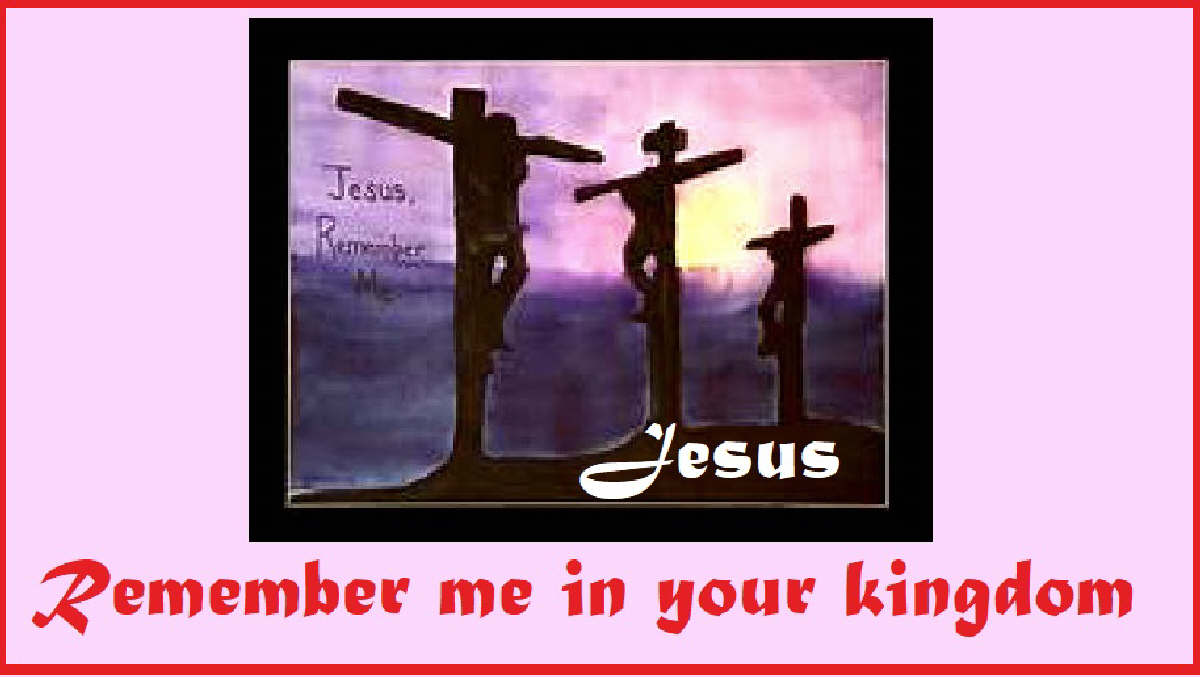
For the sake of your sorrowful Passion,
have mercy on us and on the whole world
In the name of your agony in Gethsemane when the apostles did not watch and pray for an hour, remember me although I seldom watch and pray for long— and have mercy on us and the whole world.
In the name of your arrest while the apostles ran away, remember me although I often betrayed you—and have mercy on us and the whole world.
In the name of the humiliation of unjust accusations while Peter denied knowing you, remember me although I often denied you in words and deeds—and have mercy on us and the whole world.
In the name of the fake trial before Pilate who denied the voice of his conscience, remember me although I often give in to weakness and social desirability——and have mercy on us and the whole world.
In the name of your condemnation to death as the king of Jews, remember me although I do not always hold you as the King of Kings—and have mercy on us and the whole world.
In the name of you death through inhuman suffering, remember me although I too have inflicted pain on others—and have mercy on us and the whole world.
Sing along "Remember me" with the international community of Taizé
TO AVOID ADS, CLICK ON THE SCREEN SEVERAL TIMES, then click on "SKIP ADS." |
April 3. John 8:1-11
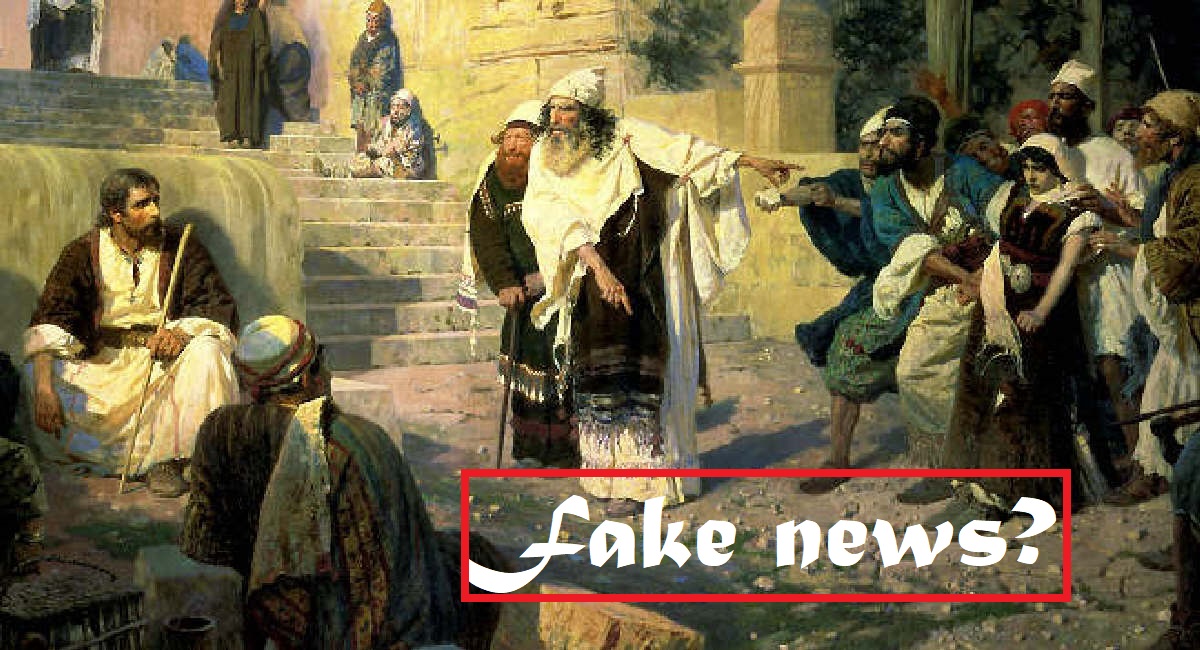
Jesus and fake news
"The Covid vaccine kills people." Fake news? Some people believe it.
"Ukraine has invaded Russia." Fake news? Some people believe it.
"This woman was caught in the act of adultery. Moses commanded us to stone such women." False: "Both the adulterer and adulteress must be put to death." (Leviticus 20:10-12) Where is the adulterer? Two or three witnesses are required by law to convict anyone (Deuteronomy 19:15). Where are they? The Pharisees wanted to test Jesus by asking him to take sides, "So what do you say?" This was not a question but a trap. The trick of fake news is to ask people to judge and take sides without giving them the necessary information (or worse, giving them false information).
"Jesus bent down and began to write on the sand with his finger." When confronted with fake news, all we can do is to take our distances. When Jesus started writing on the sand, everybody watched and wanted to know what he was writing. He was simply saying, "I am not interested in your squabble. If you want to stone her, let the accuser who is without sin throw the first stone." The accuser without sin? "Judge not and you will not be judged." The accusers now were the accused. "They went away one by one," realizing that their trick did not work. When confronted with fake news, all we have to do is to ignore it, or on the internet to mark it as "spam."
The media war of fake news is not about information but about power over the minds, power over the souls. Fake news makes us pawns on the chessboard of mind manager. Advertizing is also a great danger: ads want us to buy things until our souls are so overburdened with material things that we cannot hear the voice of God anymore. The danger of fake news is greater: their news want to enslave our minds and souls so that we cannot think by ourselves.
"Woman, where are the accusers?" Now Jesus was standing alone with her. When we reject fake news, we can again be alone with God and hear his voice.
March 27, 2022. Luke 25:11-32
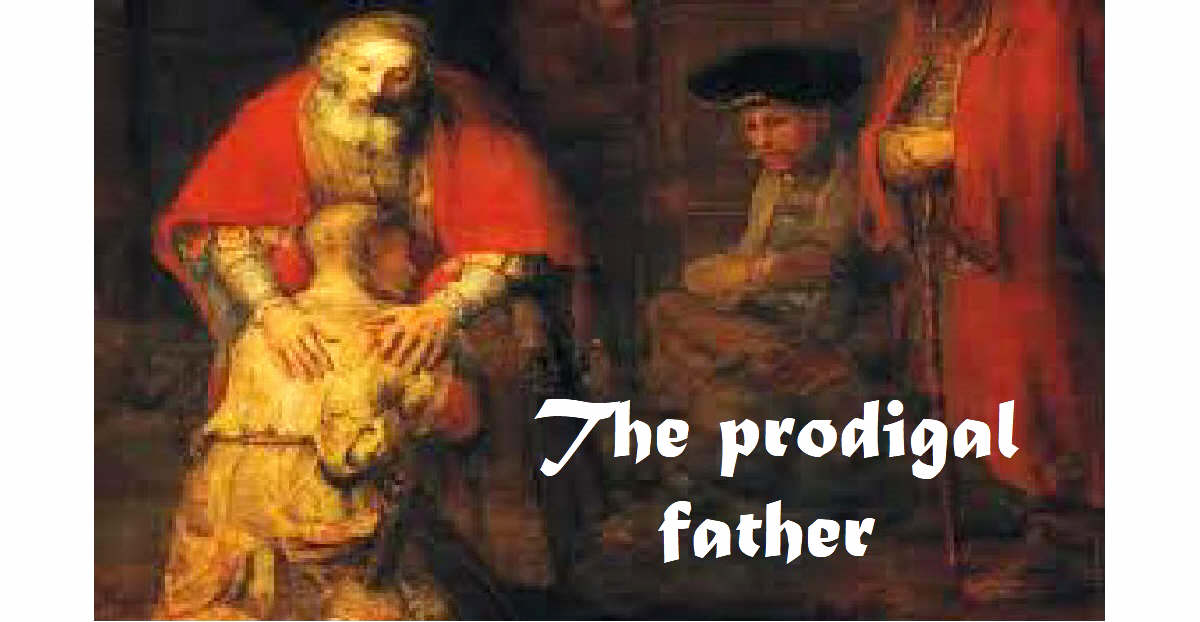
A father prodigal to his sons
The story of the prodigal son is usually understood as a parable of sin, repentance, and forgiveness. Here is another interpretation. We can also say that it is the father who is prodigal in relation to his two sons. One son represents the gentiles who will convert and come back to the father's house, and the other the Pharisees and the self-righteous believers who wreck the father's plan of universal reconciliation.
The Father's plan is "to reconcile all things to Himself through Christ, having made peace through the blood of His cross" (Colossians 1:20). "God has reconciled us to Himself through Christ" (1 Cor 5:18). Hence "we exult in God through our Lord Jesus Christ, through whom we have now received the reconciliation." (Rom. 5:11) This is the eternal plan of the Father: to bring universal reconciliation between God and humankind, and among people through the practice of the gospel of universal love. This is also what the father in the parable tries to achieve in his family.
The younger son told his father, "Give me the share of your estate that I will inherit. I do not want to wait until you're dead. I want it now!" So the father divided his property between his two sons. Insane! This is not prodigality but insanity! Only a fool would do that. "God so loved the world, that he gave his only begotten Son, so that whoever believes in him shall have everlasting life." This is the foolish father in the parable who divided his property among his children. It is the foolishness of the heavenly Father calling for universal reconciliation, so that whoever believes in his him shall have everlasting life.
It is this plan that the older brother wants to prevent. "I served you for years and not once did I disobey your orders. Our family business calls for service and obedience. Love has no place in it. Forgiveness is unjust to me as your loyal servant. What is needed is punishment for those who do not obey."
What is the kingdom of God about? It is obedience and punishment for the disobedient? Or reconciliation and forgiveness? Our daily behavior gives the answer.
March 20. Exodus 3:1-5
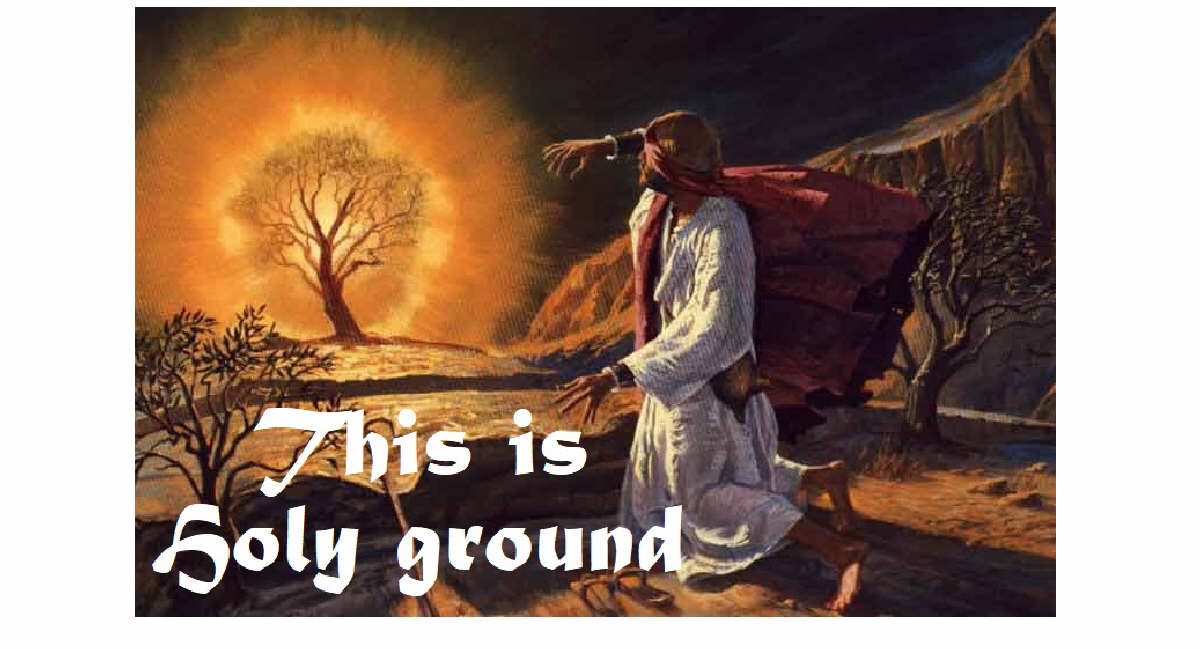
The burning bush: compassion and holiness
We have today one of the most extraordinary texts about the compassion and holiness of God. "I have seen the affliction of my people and have heard their cry against their task masters. I know their suffering. I have come to rescue them. Their outcry has reached me, therefore I am sending you." This happened about 14 centuries before Christ. It is the first time in the history of humanity that God shows compassion for a people, not just its leaders.
Throughout the history of the Israelites, God showed compassion. "Comfort, comfort my people, says the Lord. They have received from the Lord’s hand double for all their sins." Jesus was a model of compassion. All those who asked for help were granted it. He had compassion even without being asked. When coming to the city of Nain, he saw the funeral procession for the death of a young man, the only son of a widow. "When the Lord saw her, he had compassion. He touched the bier and said, 'Young man, arise.' The dead man sat up and he gave him to his mother." He had compassion at a wedding party when there was no more wine. He had compassion when people in a deserted place were without food. He cried at the tomb of his friend Lazarus, and called him back to life.
"Do not come near. The place where you stand is holy ground. Take off the sandals of your feet." Moses covered his face because he was blinded by the awesome brightness of the God' s glory. Even the ground where God appeared was holy. His name is beyond any name. "I am who I am." What mother would call one of her children, "he is the one who he is?" This would lead to endless questions, "who is he who says he is who he is?" There is no possible answer, except maybe Anselm's complicated phrase, "He is a being than which nothing greater can be conceived." God is beyond reason, beyond imagination, beyond human thought. There can be no images or representations of God. Although "Jesus is the image or icon of the invisible God," we only have an image of the incarnated son of God, not an image of the infinite divinity of God himself.
We must always hold to both, God's endless compassion and his transcendent holiness. This is repeated at every Mass when we pray both," Lamb of God, You take away the sin of the world; have mercy on us' (repeated three times), and also, "Holy, holy, holy, Lord God of Hosts, heaven and earth are full of your glory. Hosanna in the highest. Blessed is he who comes in the name."
March 13, 2022. Luke 9:28-36

The transfiguration
"As Jesus was praying, his face changed in appearance and his clothes became dazzling white." When people are in deep prayer, sometimes their faces are transformed, showing inner peace, joy, and the happiness of being face to face, so to say, with the invisible God. When Jesus was in prayer, he transcended his human condition and reached his divine nature hidden within him. Not only did he experience the presence of the divine; he became transformed by it, and absorbed into it. On the day of the Transfiguration on the top of a mountain, he reached this divine state at a supreme level, made visible by his shining face and his dazzling clothes. The shining power of his glory was more blinding than the sun and more overwhelming than the infinity of stars throughout the sky. The three disciples were so overcome that they lied down to the ground.
When we pray, we tell God our concerns and ask for enlightenment. Jesus did similarly express his concerns about his future, and it is Moses and Elijah who came to enlighten him about his mission. We do not know what they said, but after his resurrection—the transfiguration of his dead body—Jesus explained his mission to his disciples on the way to Emmaus. "Beginning with Moses and all the prophets, (most importantly Elijah), he interpreted to them what referred to him in all the scriptures." Jesus is the new Moses and the New Elijah who fulfills all of God's promises to Moses and the prophets. We understand him better when we understand the scriptures, from Moses through the prophets and the psalms.
The transfiguration of Jesus on Mount Tabor is a pre-figuration of the trans-figuration of Jesus on Easter morning. The first witnesses, Mary Magdalen and the other Mary were so overwhelmed by what they saw that they run away. They were not petrified by fear but impelled to tell to tell the disciples. Peter came to the tomb and saw nothing because he did not have the understanding of the scriptures. John "saw and believed." Faith is not credulity but openness to believe, and openness always implies doubt. The resurrection of the bodies is our hope. It is based on faith not credulity, and this faith is based on the eye witnessing of the fist generation of disciples.
Since early Christianity, the Transfiguration has been seen as the symbol of the spiritual transformation of Christ's followers into an ever better image of Jesus in his humanity and divinity. This has been called divinization (theosis) in Greek theology and deification (or more commonly, sanctification) in the West. Augustine put it clearly, "The one who was God made himself human in order to make gods of those who were merely human. ” This will happen slowly if we collaborate with God's grace. Let us pray for it.
March 6. Luke 4:1-13
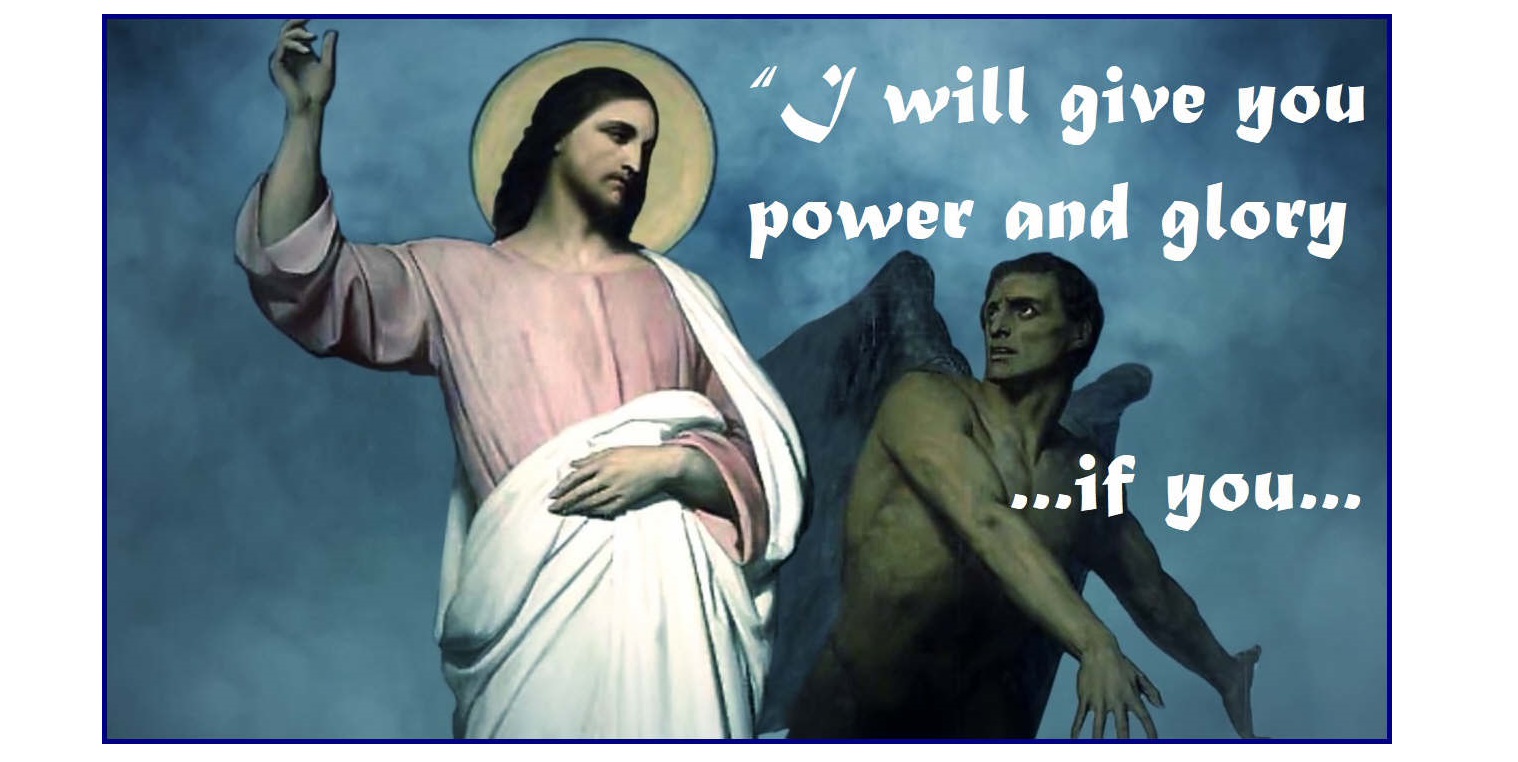
The four temptations of Christ against faith
Jesus goes into the wilderness to face the enemy of the human nature, the Liar, the Tempter, śāṭān in Hebrew, and diabolos in Greek, meaning the accuser, the slanderer. Jesus’ temptations in the desert were all about faith and trust in God.
“Command these stones to become loaves of bread.” The Israelites in the desert were complaining about the lack of food. Then God sent them manna, with the reminder that “man shall not live by bread alone.” Don’t just seek food but “live by every word that proceeds from the mouth of God.” God gave them food so that they could live by the word of God. Food itself is a gift that comes from hard work, but more important is the attitude of seeking God.
“Throw yourself from the highest point of the Temple. You can do it if you have faith in God.” This is a deceptive appeal to faith. It is written: “Ask and it will be given to you; seek and you will find; knock and the door will be opened to you.” But God is not like a wending machine: you put in the money, and you get what you want. This is tempting God by making him accountable to our expectations and by using a literal interpretation of his words. It is also written, “You shall not tempt the Lord your God.”
“I will give you power and glory.” You only need to worship the sources of power and fame in society and “they shall be yours.” How deceitful! How many actors and actresses worshiped the powers of Hollywood and only found deception and misery. How many people want to be millionaires and how many succeed? How many writers hoped for some public recognition that never came? The answer is “Seek first the kingdom of God and all these things will be added to you.” In Jesus’ words, “Worship the Lord your God, and him alone shall you serve.”
The devil left. The last temptation came in Gethsemane. It is the greatest temptation against faith: “I can’t do it! Take it away!” Jesus was torn by the anxiety of death through annihilating torture. “Let this cup pass away from me.” It is too much! Trusting God is beyond my power. St. Paul had the same crisis. He was told, “"My grace is sufficient for you, for my power finds triumph in weakness." Because God’s power is present even in human powerlessness, Jesus could say, “Not my will, but thine be done.” This is the greatest act of faith coming in the darkest crisis of faith. The sun shines even when the clouds cover it with darkness: “My power finds triumph in weakness.”
The greatest gift of God is faith. The greatest temptations are those against faith in God alone.
February 27, 2022. Luke 9:57-61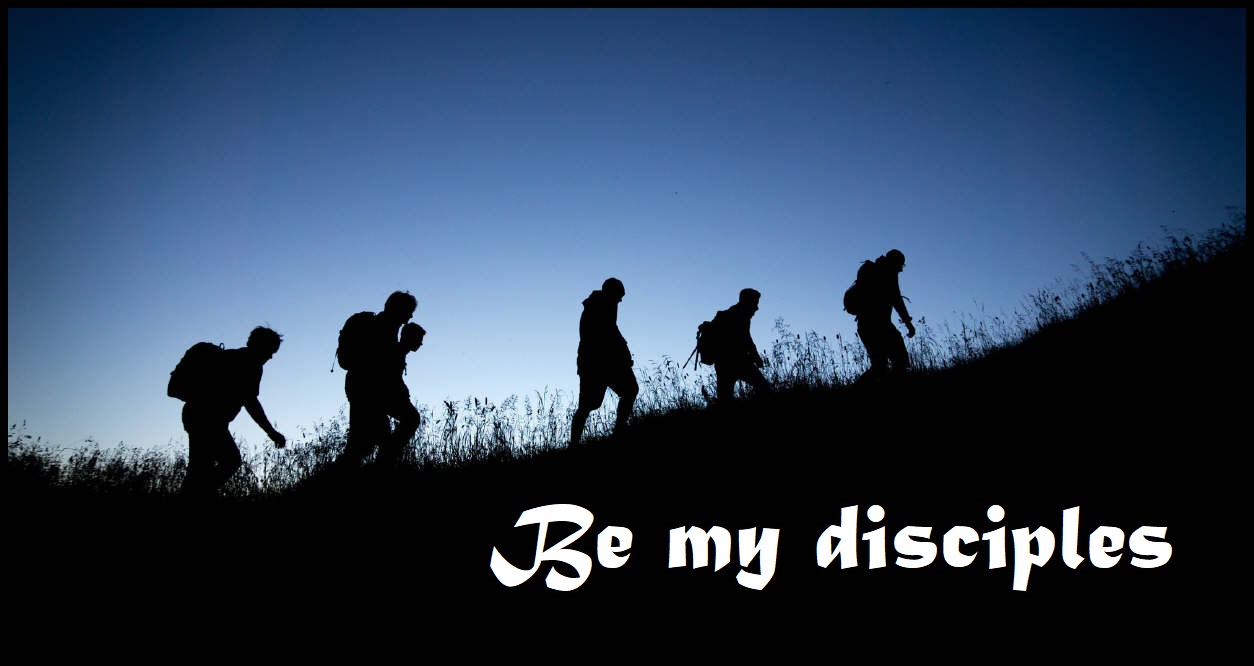
Be the light of the world
"Can a blind person guide a blind person?" Of course not. Jesus is the guide, the life, and the truth. "When disciples are well trained, they become like their teachers. Anyone who has faith in me will do what I have been doing. He will even do greater things." By following Jesus, we can be a guide to others. But we must travel lightweight, without too much secular baggage.
When traveling, it is best to go lightweight. For a two-day trip, take just take a small bag; for four days, a small suitcase; and for a week, a big suitcase. Jesus encourage his disciples to go lightweight. "Take nothing for your trip, no sac, no food, no second tunic." The disciples expected to find hospitality wherever they went. Not today. We must still go lightweight, because all forms of riches can be attachments in the spiritual journey. We must be aware that the weight of wealth can hold us down. With too many secular attachments we are like the blind leading the blind.
"You are the light of the world. Your light must shine before others so that they may see your good deeds and give glory to God."
The disciples of Jesus must shine the light of the Beatitudes. They must be poor in spirit and belong to the kingdom of heaven; they must be the meek and will inherit the earth; they must be merciful to others and they will be shown mercy; they must be of a pure heart to see God; they must be peacemakers and they will be called children of God. When doing this, they will be blessed and happy, full of joy and peace.
February 20, 2022. Luke 6:27-38
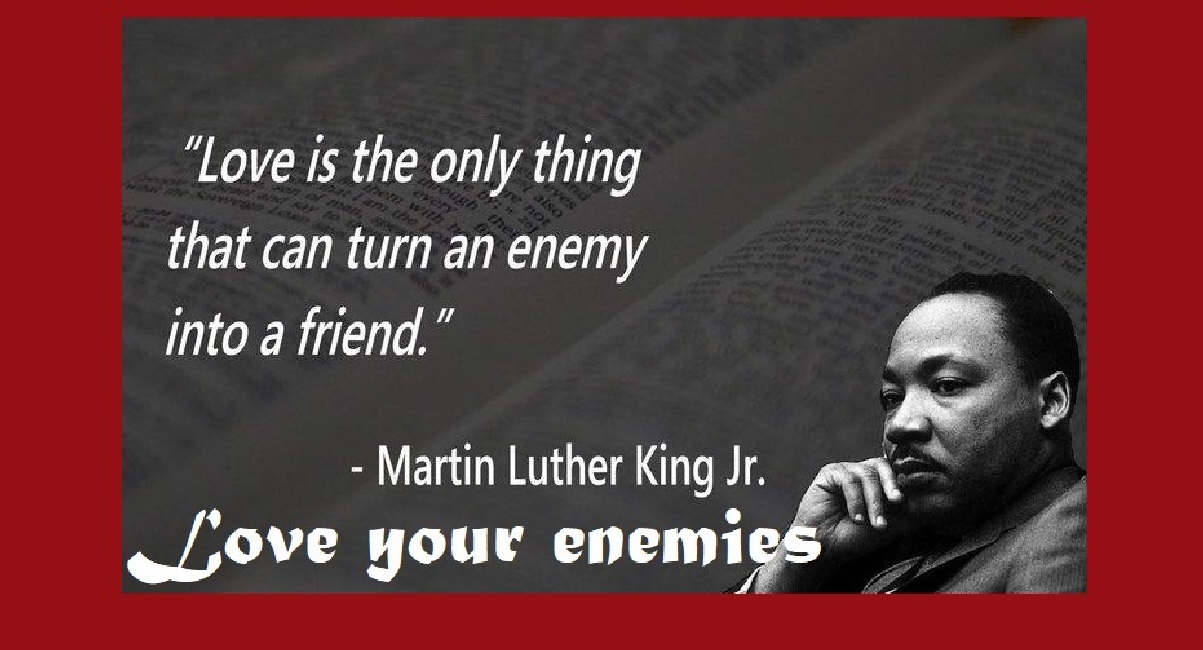
Treat your enemies like friends
It feels good to hate your enemies. It feels good to hit back those who hit you. It feels god to take a revenge. But what is gained in the long run? Those whom we hit will hit back. Our revenge will start a cycle of revenge. The pagans do that. We should know better.
The desire for revenge comes from within and it is in our power. The first victory is to overcome revenge. It may be a long battle. Gandhi and M. L. King had many reasons to seek revenge for the mistreatments they received. But they knew better.
Praying for one's enemies is the first step to overcome the desire of revenge. It consists of putting our grievance before the Lord and asking him to do us justice. It is the duty of the civil society to punish the criminals. It is God's job and not ours to judge the sinners. Leaving it up to the Lord to do us justice, and giving up the desire for revenge will free us from a heavy burden.
Showing kindness and love to those who do not like us is the only way to win their heart. It does not always work. Gandhi and M.L. King showed kindness, yet they were killed. By showing kindness throughout their lives, Gandhi and King gained many friends. It took two disturbed individuals to kill them, but after their death they had no more enemies. Since their death, they have gained many followers through their examples.
What force and power cannot do, love can. Love can melt a frozen heart.
February 13, 2022. Luke 6:20-22
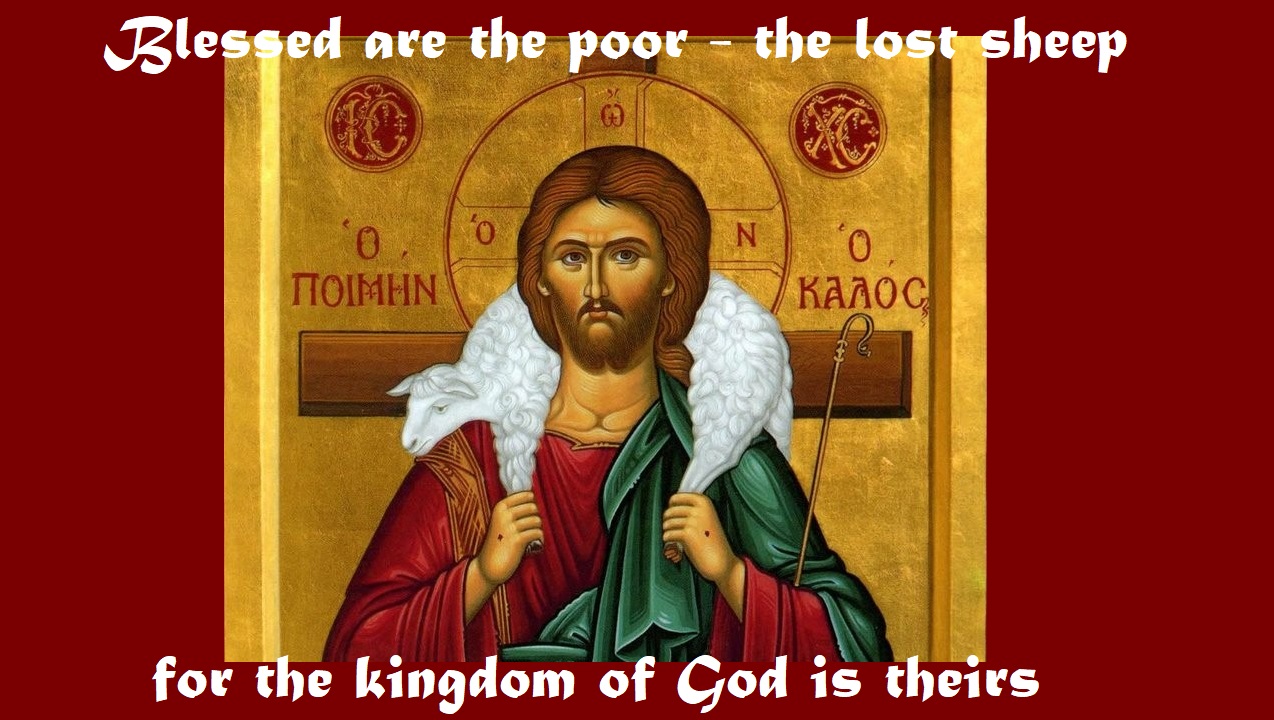
Blessed are the poor
because God cares for them
There is more to poverty than having no money. The poor are the afflicted, the despised of society, the exploited, people with no work or food insecurity, people in poor health, uneducated, unskilled, in need of help. One can be rich and depressed, lonely, isolated, rejected, without hope. It is very hard to help them. Some poor are thieves, thugs, rats, killers for hire, unscrupulous enemies of their own people. They are the black sheep of the flock. No one but the Good Shepherd can help them.
"I am the good shepherd. I know mine and mine know me." Those who know the Good Shepherd go to him when in trouble. A good shepherd gives his life for the sheep. We can count on him. "I have other sheep; they do not belong to this fold but I must also lead them." There are the black sheep who do not hear the voice of the shepherd; they got lost in sin and crime and do not want to return. But the good shepherd will leave the 99 who are safe and seek the one that got lost. We can abandon God but God does not abandon us.
The Good Shepherd does not promise miracles. He will not make the poor rich and the depressed joyful. But he will give hope, which is the best remedy out of the prison of poverty and loneliness. Turning to the Good Shepherd makes us turn inwards, thus forgetting the misery of the outside world. And out of the inward imagination may come a solution to change the outside world. Poverty is often created by an unjust society, and this we can change, a little at a time.
Scripture gives hope to the poor:
"The humble will see and rejoice. You who seek God, let your hearts be revived!" Ps. 69:32
"He has put down princes from their thrones. And has exalted the lowly." (Lk 1 52)
"Whoever exalts himself will be humbled, and whoever humbles himself will be exalted."(Mt 213:12)
"Humble yourselves under the mighty hand of God, that he may exalt you in due time" (1 Peter 5:6)
"Humble yourselves in the sight of the Lord, and he will exalt you." (James 4:10)
February 6, 2022. Luke 5:1-11

"I will make you fishers of men:"
that's also the job of parents, teachers, friends
Jesus told Peter to let down his nets in deep water. “Master, we toiled the whole night and took nothing.” After working the whole night, fishermen do not want to be told by a stranger, a carpenter, where to fish. “But at your world, I will let down the nets.” It is natural not to try again after you have tried the whole night for nothing, but much can be gained from open-mindedness and trying a new way. Peter was such an open-minded man. He will make a good fisher of men.
After the miraculous catch, Peter fell down at Jesus’ knees, saying, “Go away from me, Lord, because I am sinful man.” Before the catch, Peter called Jesus Master; now he calls him Lord. Now Jesus is recognized as a superior authority, one with supernatural powers. Jesus is our master, our teacher, and model, but he is also Lord, one who inspires reverence, due to our smallness before God. Peter did nothing wrong to make him say that he was a sinner, but before the greatness of God, we are all sinful creatures.
“Do not be afraid.” God does not inspire fear but reverential awe. After a miraculous event, reverential awe inspires us to praise God in thanksgiving. “Henceforth you will be catching men.” In the future Peter and the apostles will bring people to God, not like throwing out a net, but through the daily labor of spreading the good news.
It is not just Peter and the apostles, or the bishops and priests who must bring people to God. It is the daily task, in their own way, of parents, teachers, and all of us. We too are called to be fishers of men.
Write a comment on this week's Facebook page
January 30, 2022. Luke 8:22-25
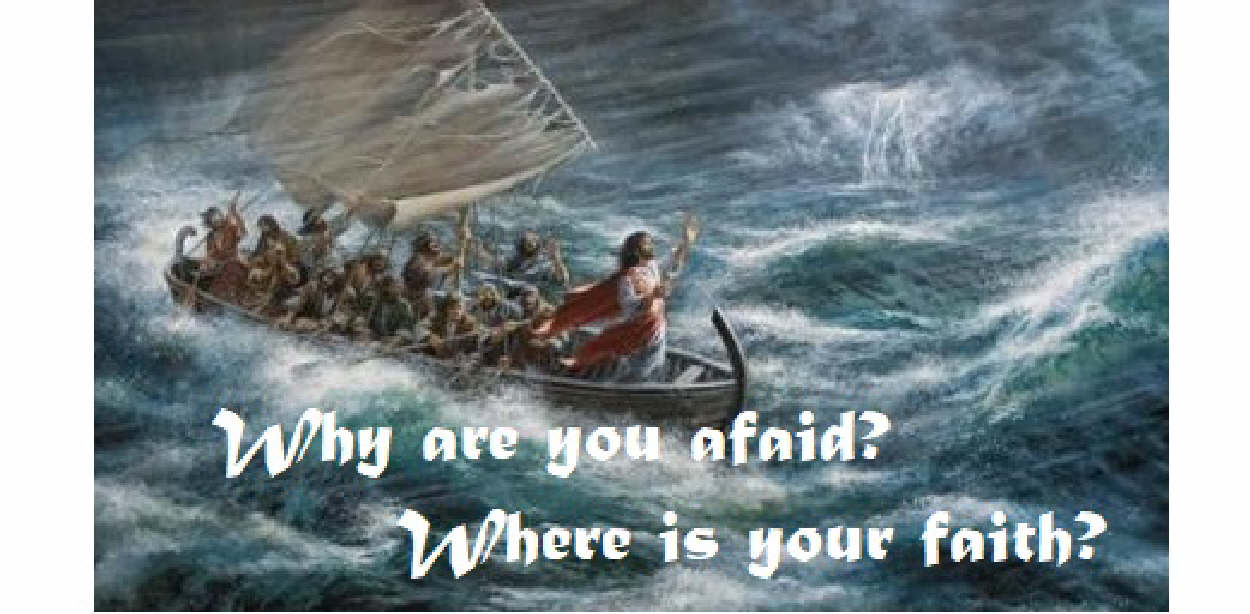
The calming of the storm
The violence of storms, tornados, tsunamis, inundations seen on television inspire fear because they can happen to us. The wildfires which destroy thousands of homes in many parts of the world are frightening, and so are the fires in apartment buildings which can happen anywhere. But what does faith have to do with this?
Jesus calmed the storm of the lake of Galilee, but he did it only once; there has never been another calming of a storm. God does not intervene to stop natural disasters, earthquakes, volcano eruptions, and climate change. God did not stop the great life extinction that killed the dinosaurs 60 million years ago. So what does faith have to do with this?
The Lord is our shepherd. He cares for people, but he does not interfere with the natural order. The greatest gift of faith is hope, especially in times of disasters and dangers. God will not stop the disasters but will inspire faith and confidence which allow us to face disasters. In times of uncertainty, a life without hope is miserable, but hope in God brings self-confidence.
The apostles asked, “Who is this, that commands wind and water, and they obey him?” The psalmist asked, “Who is he, this King of glory?” And then replied, “He is The Lord Almighty. He is the King of glory.”
You may like to listen and sing along Psalm 24 (with the lyrics). Skip the ads.
January 23, 2022. Luke 4:14-21
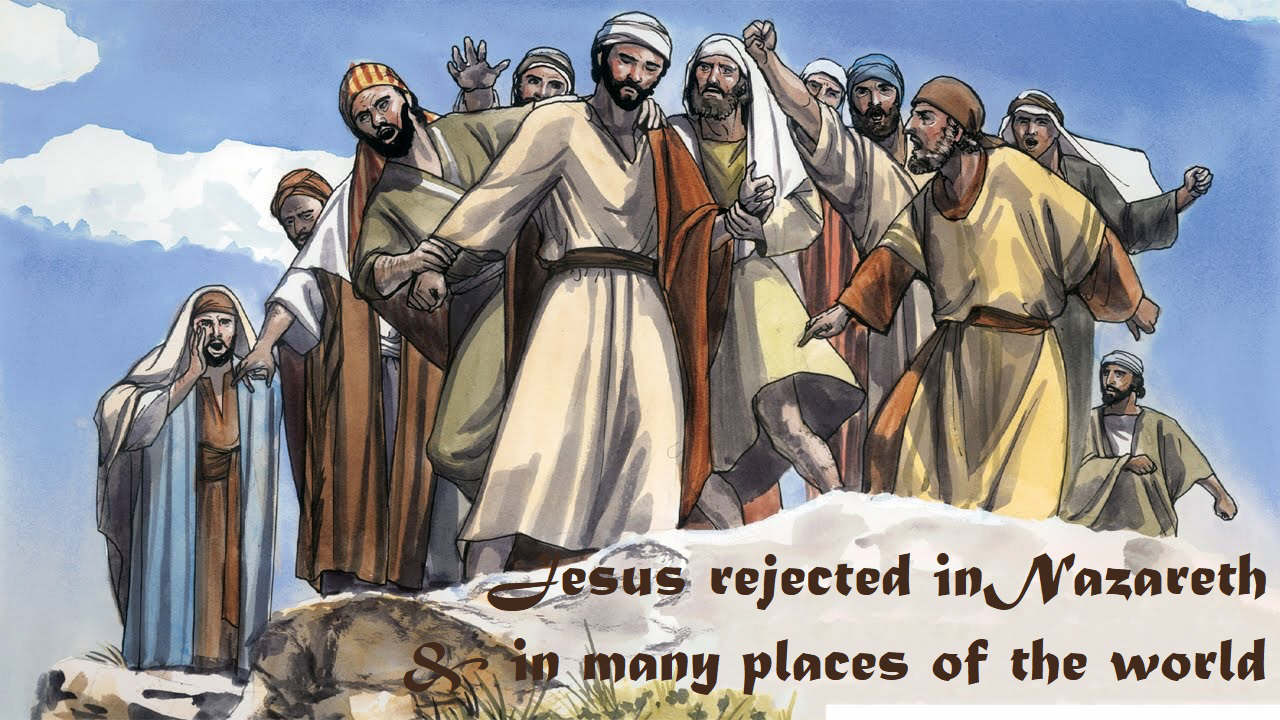
Jesus was rejected in Nazareth
and today in the poor of the world
At first, everybody in the synagogue was pleased: a son of the village made a public speech about God, and he was not a rabbi. But was he not the son of Joseph the carpenter? Where are the miracles that people say he was making in Capernaum? We want to see first-hand: we want a miracle! And now he is saying that there are many good people who are not Jews. No! Kick him out! Expel him from the village! And they grabbed him and pushed him to the edge of the ravine at the end of town.
Since then, Jesus has been rejected and persecuted through the centuries. To Saul who was persecuting the followers of Christ, Jesus said on the road of Damascus, “Saul, why do you persecute me?” To this day, Christians are persecuted by non-Christians – but Muslims are persecuted by Hindus and Hindus by non-Hindus. In the West, Catholics killed Protestants and vice versa. Christ is persecuted in all forms of violence, religious and secular.
Christ is persecuted in the poor of the world. What we do (or not do) to them, we do to him. We preach love of neighbors as equal to love of God, but we are far from practicing it.
In the secular societies of the West and increasingly everywhere else, God is ignored but not necessarily rejected: people are simply too busy. Besides work, eating, shopping, many people spend about three hours on television and often two hours on the social media. Their lives are full, and there is no place for God. Even going to church once a week is too much because there are so many things one wants to do on Sunday.
How much time to you—do we—have for listening to the word of God throughout the week?
January 16. John 2:1-12
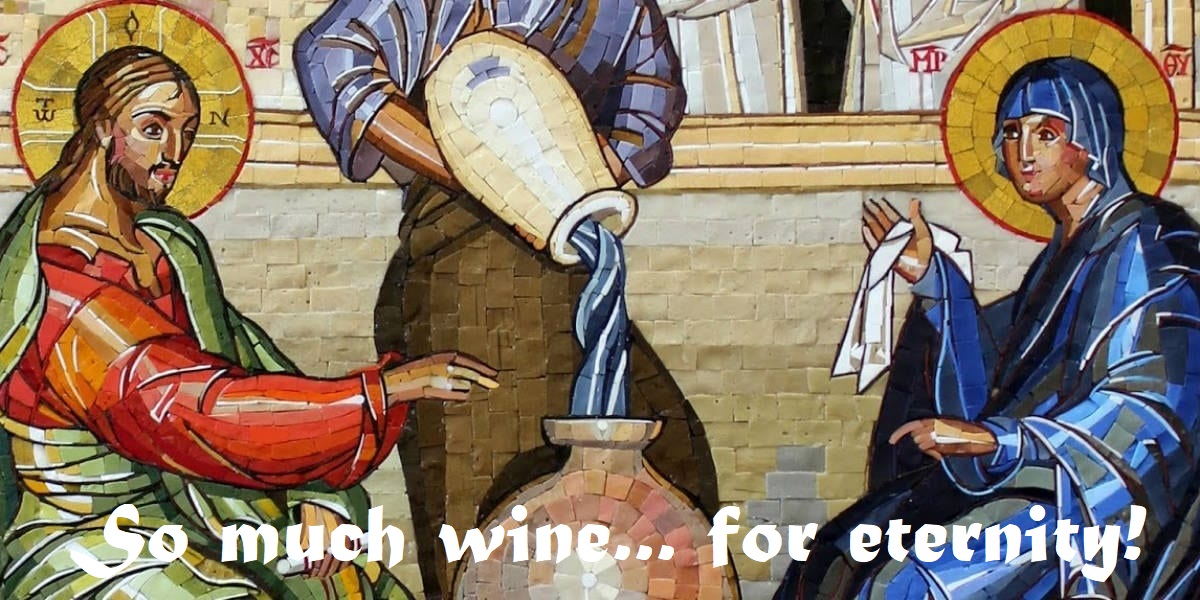
The wedding at Cana:
image of the kingdom to come
The gospel of John begins with a wedding and much wine, and ends with a miraculous fish catch and Jesus fixing breakfast for his disciples. This is the story of our redemption and the hope for our present and future.
In those days, the whole village and often the friends of the friends were invited to weddings. Jesus came with his mother and maybe ten of his followers. That was expected. Then and today, people would bring something for the feast. It was not enough to bring just a bottle of wine for so many people. There were six stone jars, each holding twenty to thirty gallons. Nobody has ever brought hundred gallons of wine! That’s an image of the superabundance and generosity of God. It is a symbol to be understood because Jesus did not multiply wine again. “Jesus revealed his glory, and his disciples began to believe in him.” This miracle is a symbol for our faith.
John’s gospel ends with Peter and a few of his friends going fishing in the Sea of Galilee. They caught nothing that night. A voice on the shore said, “Cast your net on the right side of the boat.” So they did, and they were unable to pull the net because of the number of fish. “It’s the Lord,” John said. “Come and have breakfast.” Jesus had prepared fish and flat bread on a charcoal fire. “Jesus took the bread and gave it to them, and in the like manner the fish.” This was the symbol of communion which the disciples recognized at once. Then Jesus asked a question addressed to all of us, “Do you love me?” Three times he asked. We can only say like Peter, “You know that I love you.”
January 9, 2022. Luke 3:15-22

The baptism of Jesus and ours
Baptism is a passage to a new life. For Jesus, baptism in the Jordan marked the beginning of his public life. For thirty years he was known as the son of Joseph the carpenter, a good guy of Nazareth like everybody else. Now a voice from above publicly declared, “This is my beloved Son with whom I am very pleased.” No one had ever been told this. It was not a program: Jesus was not told what to do. It was the beginning of a mission in total trust in the voice from above.
For Christians, baptism is also a passage or introduction to a new life. To each of us, God may have said at baptism, “You are my beloved son or daughter.” This was a call to mission, but without a direction or program. Most of us were baptized as children. Our parents made the commitment for us. We are not bound by it: we can reject it, or more commonly, simply ignore it. But we can also live by it.
Baptism is a calling, a vocation, but one without a specific program. It is our job to find out what we can and want to do. We went to school for a decade or two to find out what we can and want to do in adult life. The same is true in the church. It takes years to find out what our special gifts are, so that we can use them to help build the church. What is your special gift? Your special mission in the church? There is more to Christian life than going to church once a week.
May the Lord illuminate our minds to discover our special calling!
January 2, 2022.

Follow the Spirit of Christ
"God has not given us a spirit of fear, but one of power, of love, and of sobriety." This was the spirit of the holy family in Bethlehem. There was no room for them in the local inn, but Joseph had no spirit of fear; he had the power of creativity. In lieu of a place at the inn, he found an animal shelter for the night. The cold? Sleeping in a haystack keeps you warm; the baby in the animal manger will be warm tonight. And tomorrow? Joseph had no fear: God's Emmanuel was with them. A spirit of love: Mary and Joseph welcomed all the visitors who came to see the new born. A spirit of sobriety: with God in one's heart, one can be happy with only the bare necessities of life.
The spirit of Christ is our star. The star of the magi shone brilliantly over Bethlehem but only for a short time. Then in a dream Joseph was told, "Rise, take the child and his mother, and flee to Egypt." Where was the star to lead him there? The night was dark and cold, and there was no star. Years later, another dream: "Go back to Israel." Where? No answer. The family settled in Nazareth, and for thirty years nothing happened. No star, no Emmanuel, only the daily routines. Many people find the star of Bethlehem for a short time, and then, nothing. Life without a star. But continue: a star will come out of Nazareth to shine over the world.
Is he the one, the messiah? When Jesus spoke the words of Isaiah, "The spirit of the Lord is upon me," people were impressed. Then they asked, "Isn't he the village carpenter?" and they expelled him from town. This was only the beginning. For three years there was much enthusiasm for Jesus but not much faith. The disciples held on, but did not understand. After the crucifixion, it was utter disappointment. Understanding came only on Pentecost day when the Spirit of Jesus illuminated the minds and hearts.
This is only the first week of 2022. Follow the star of Jesus for the rest of the year!
